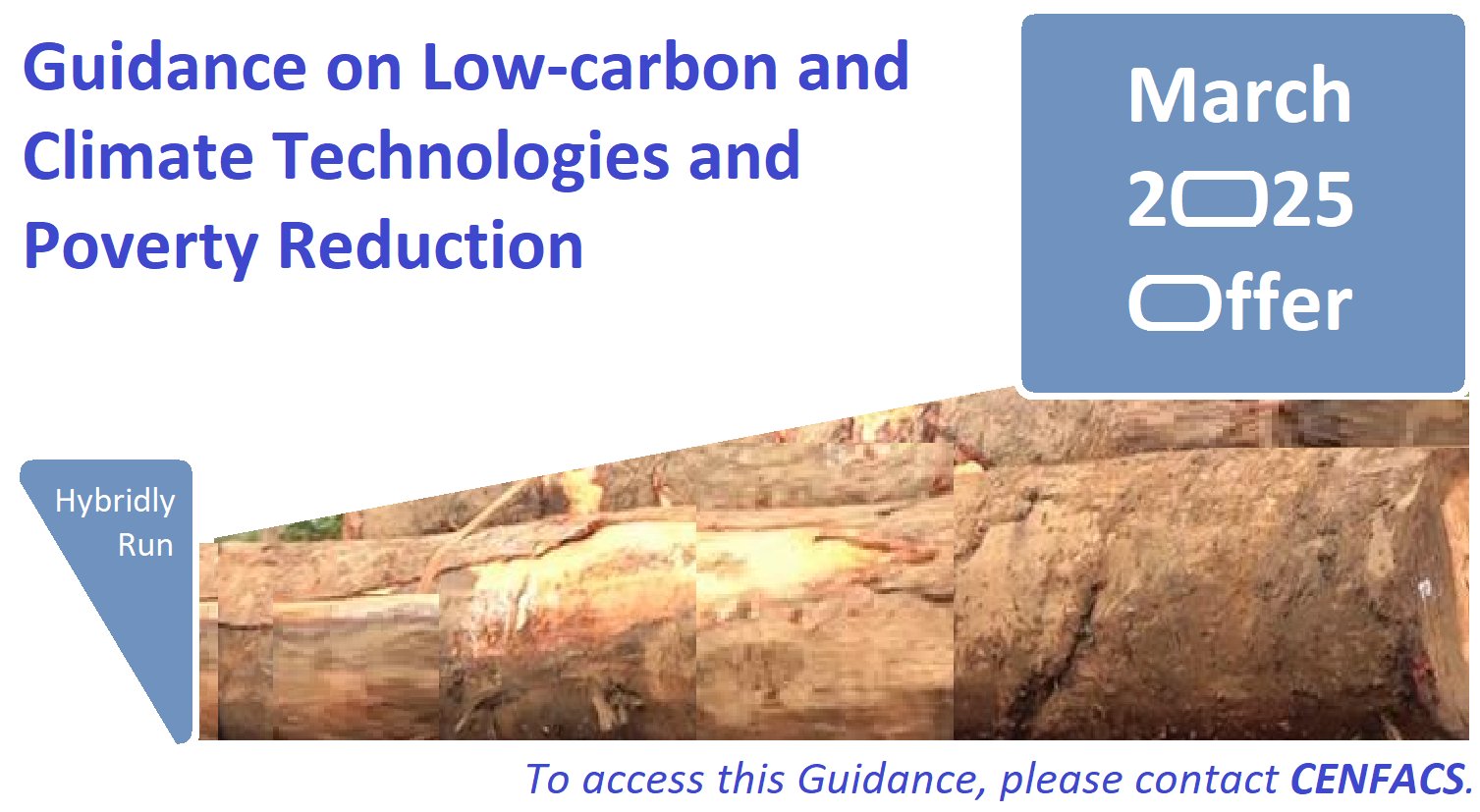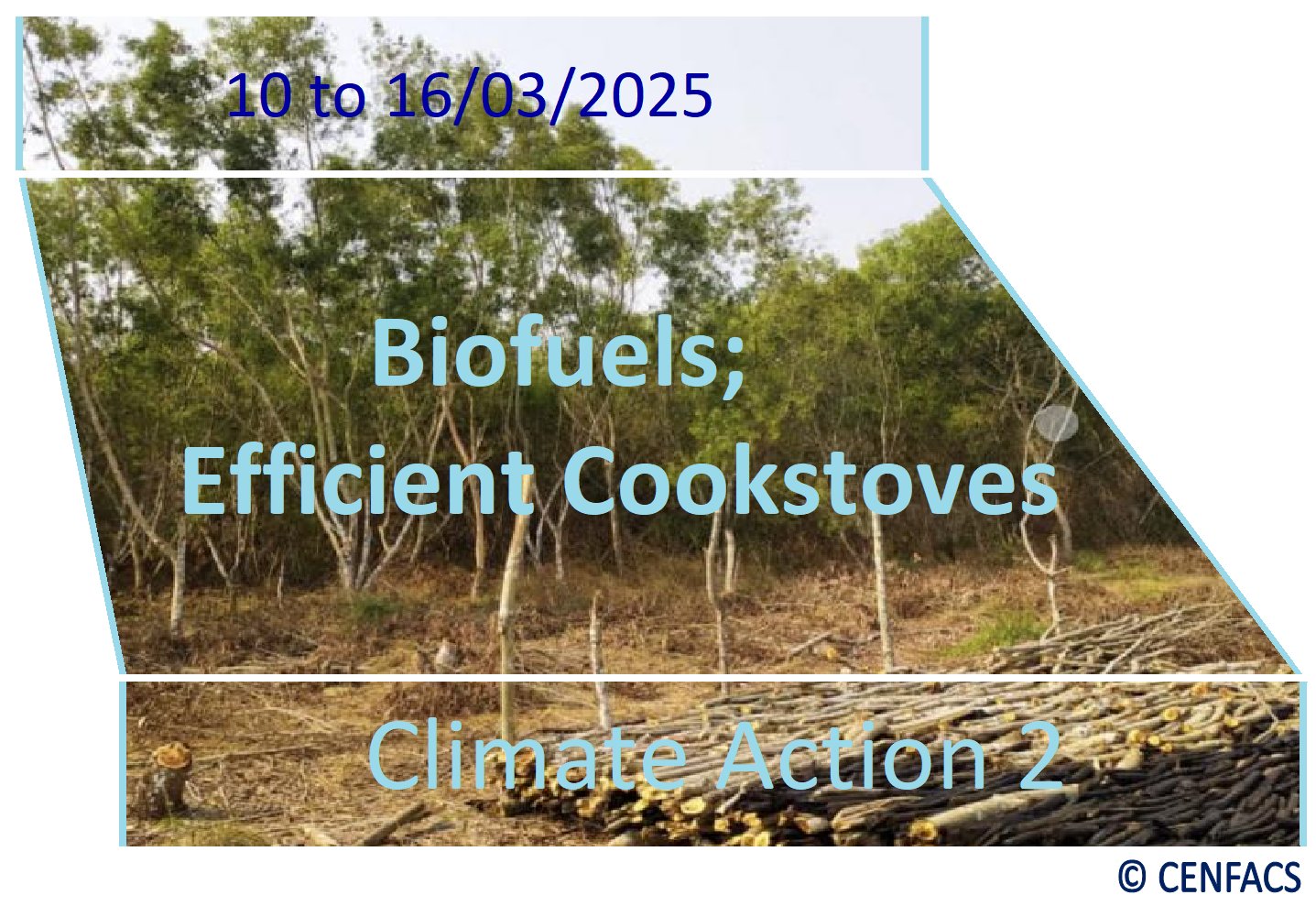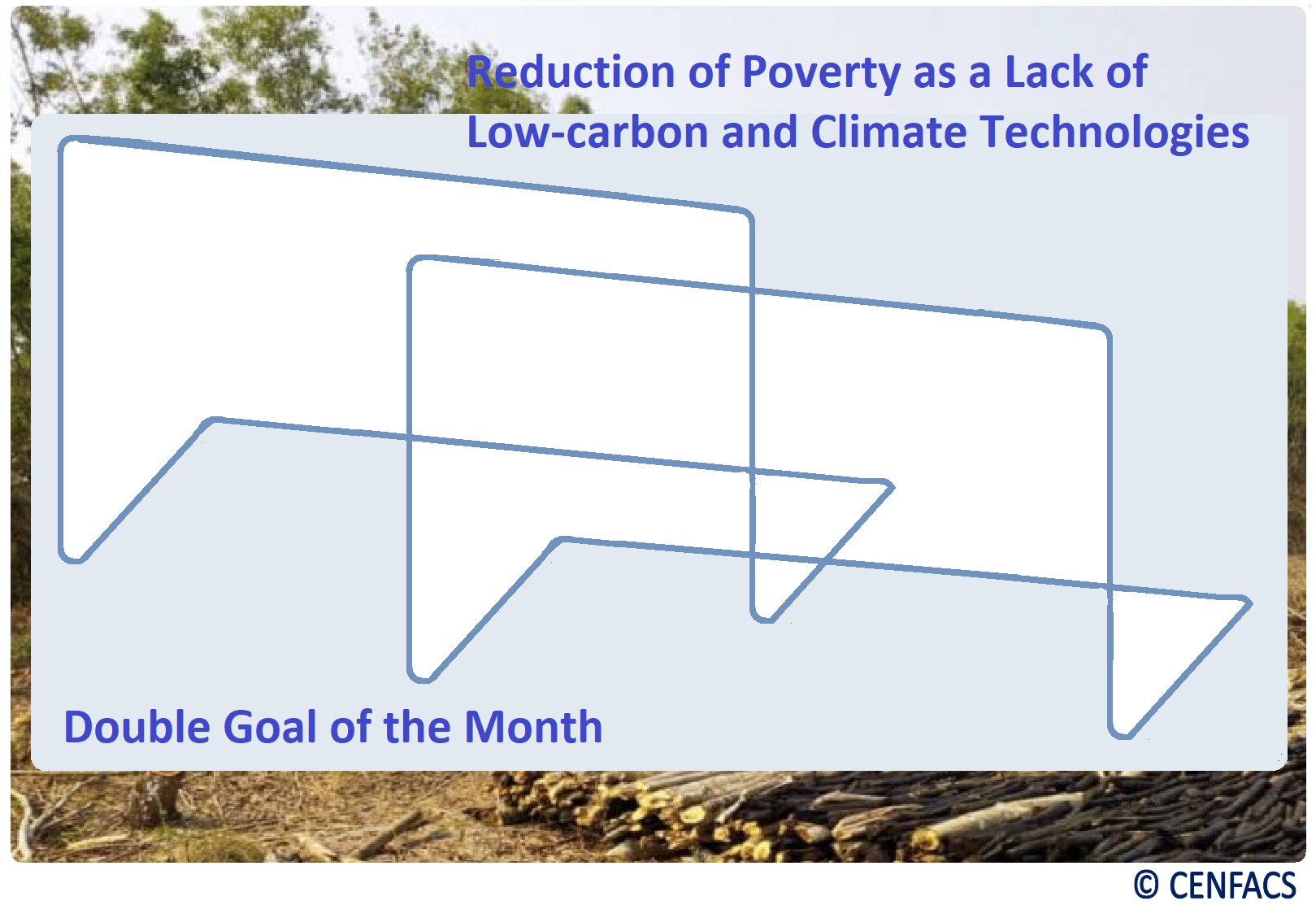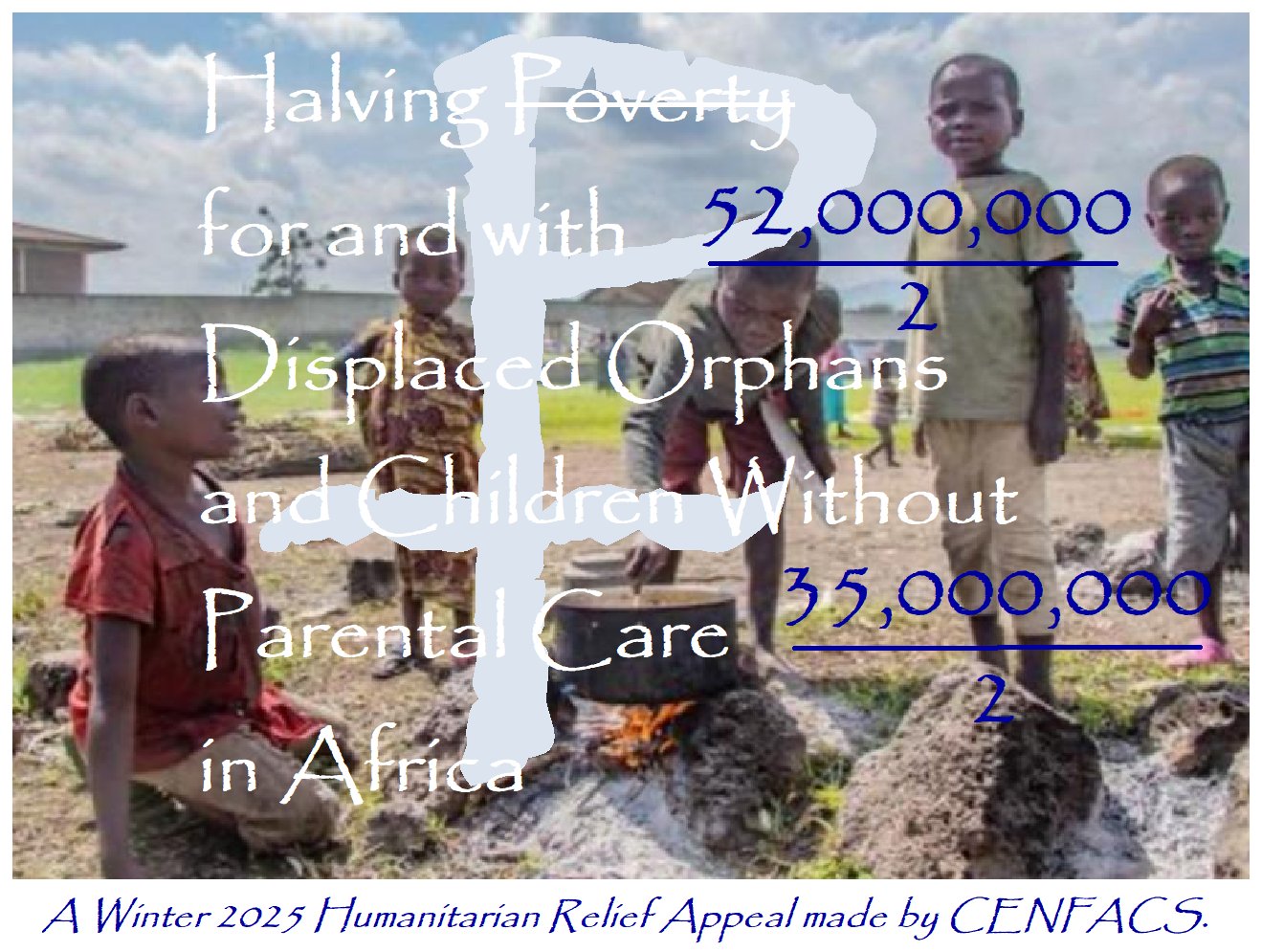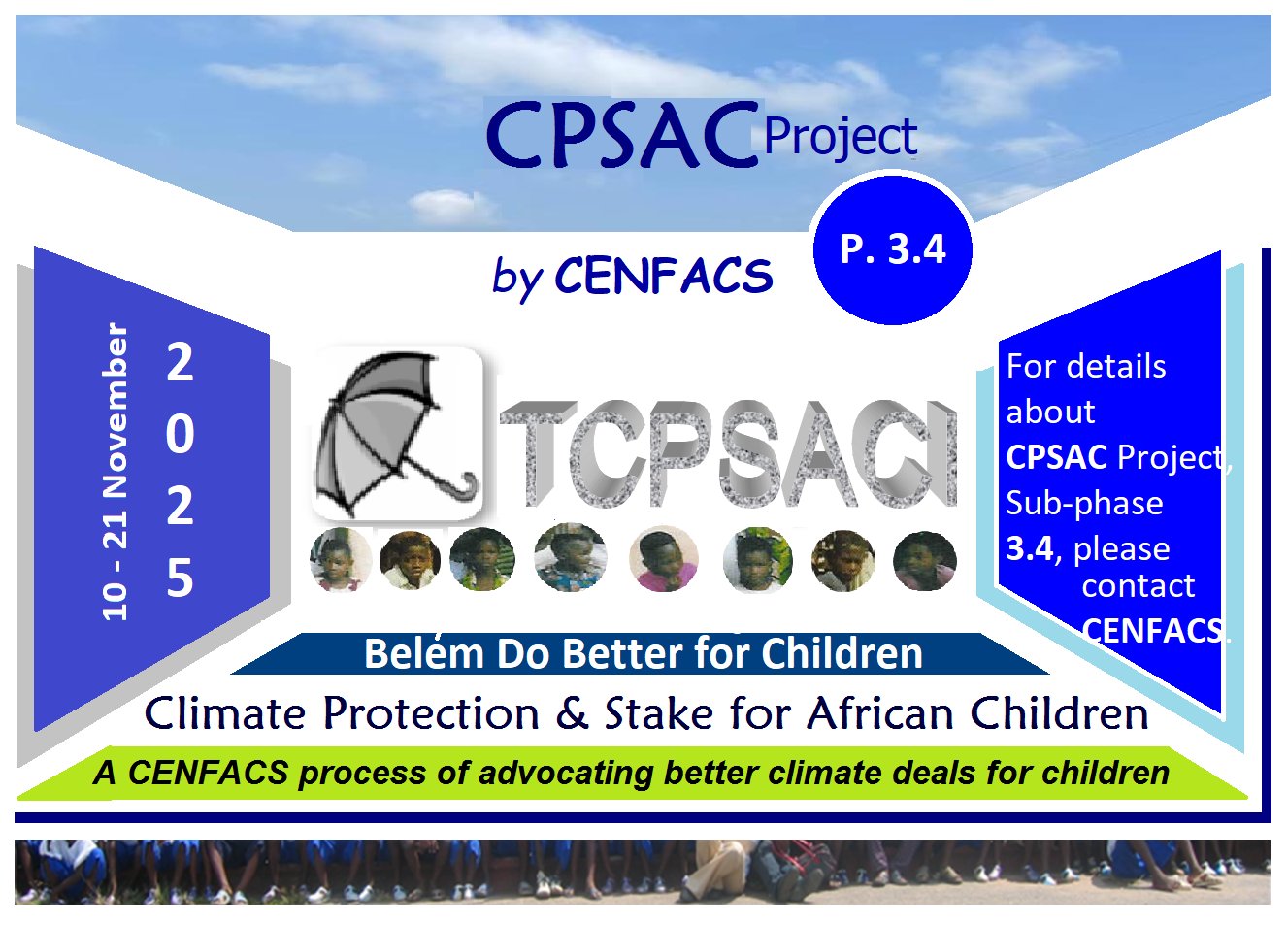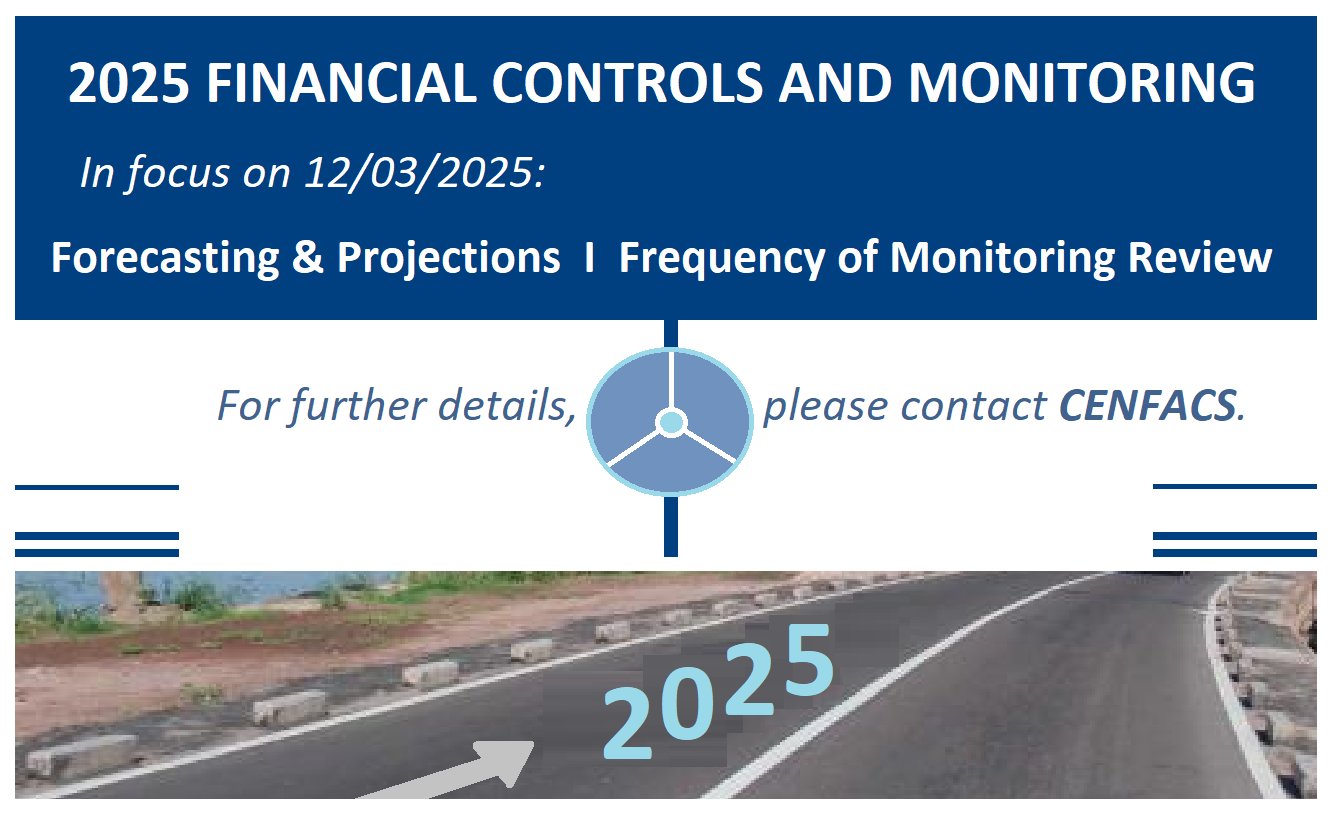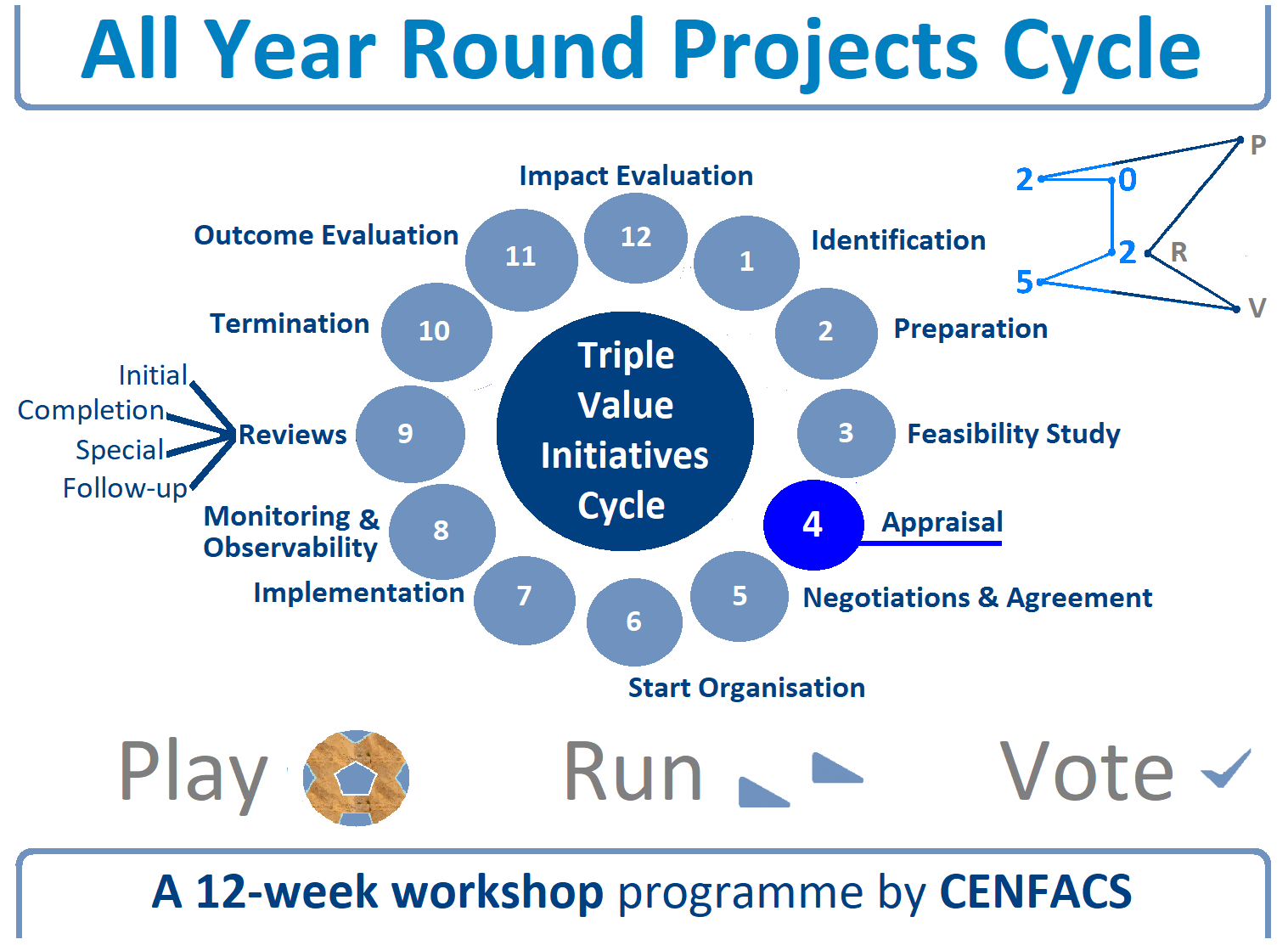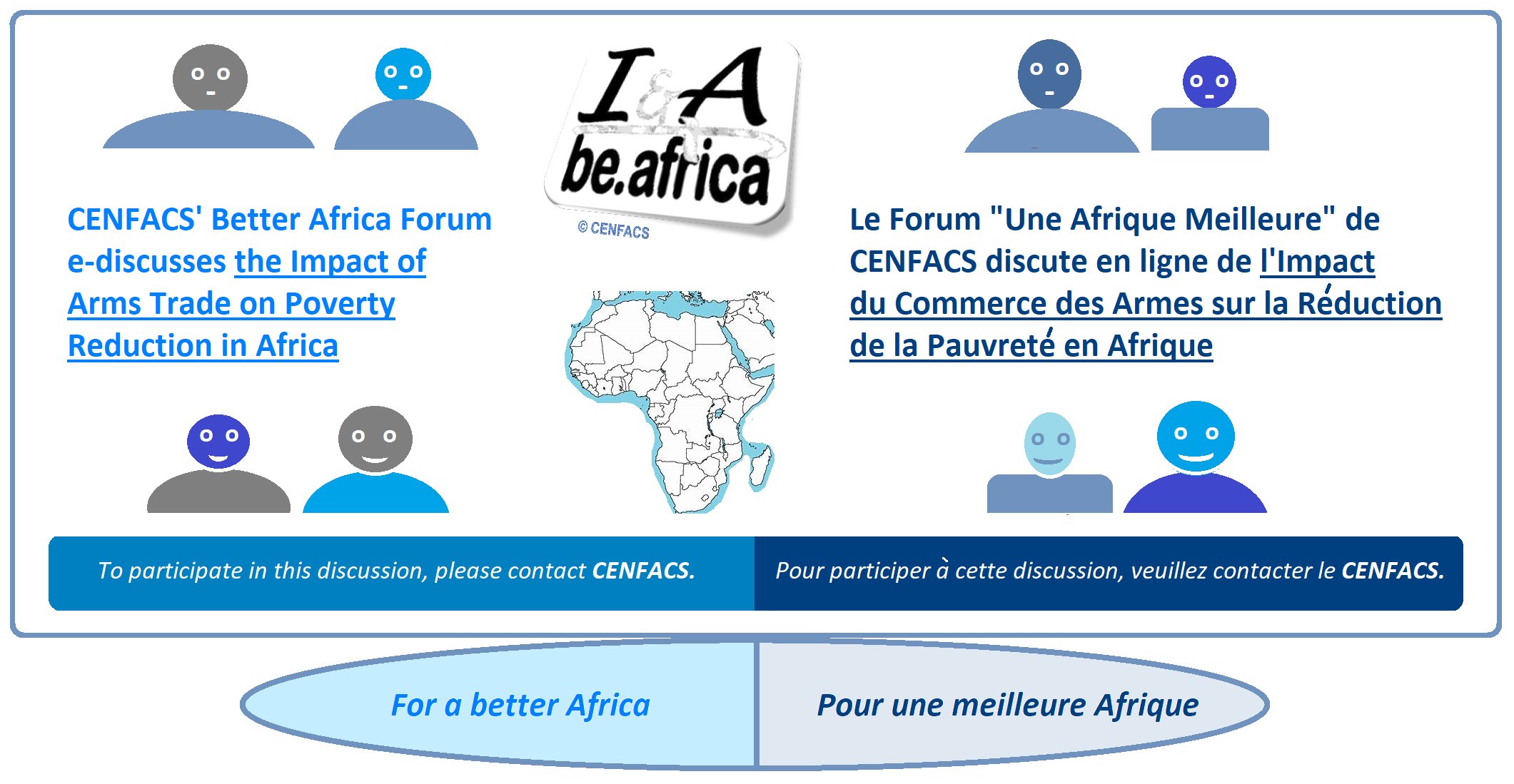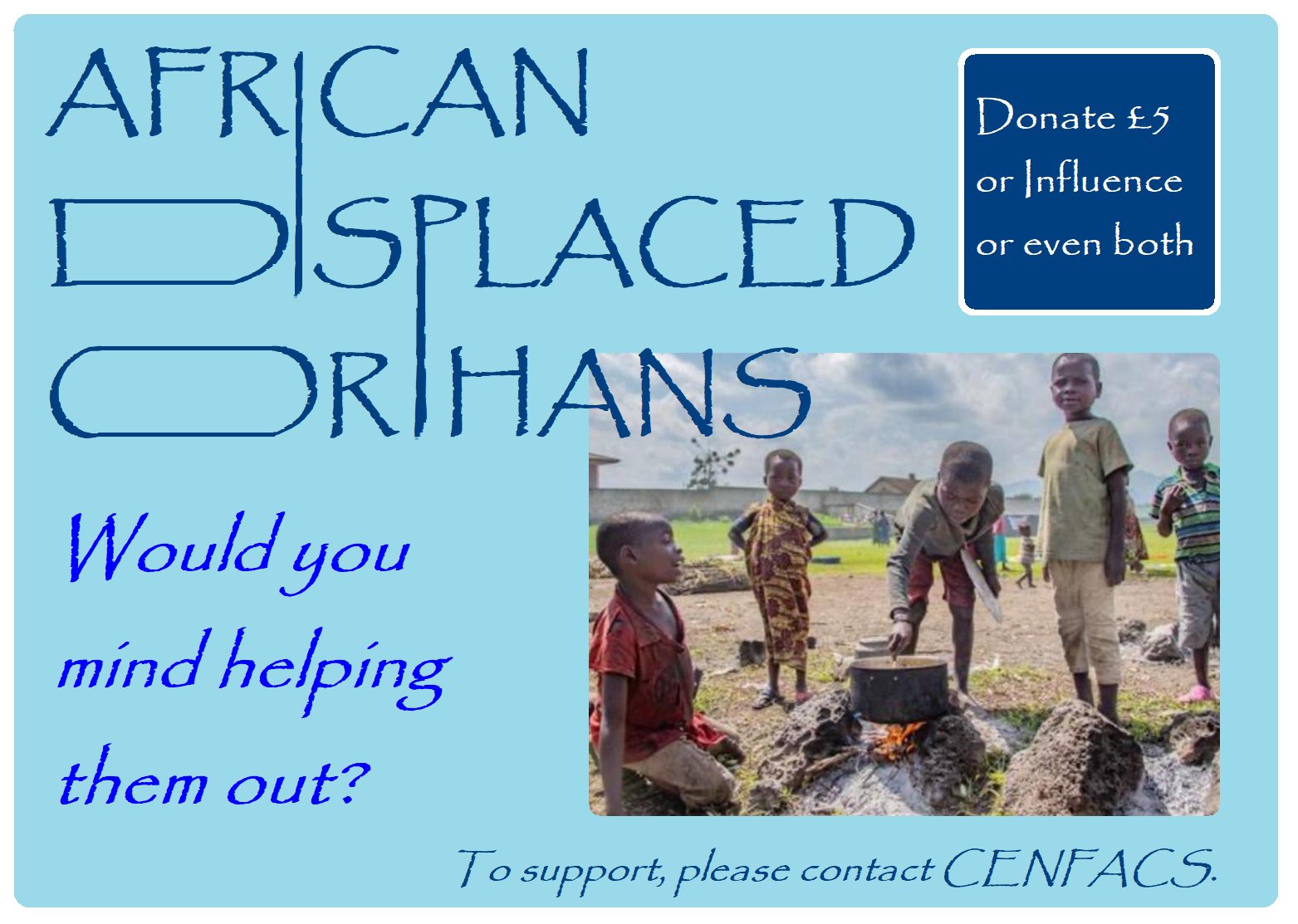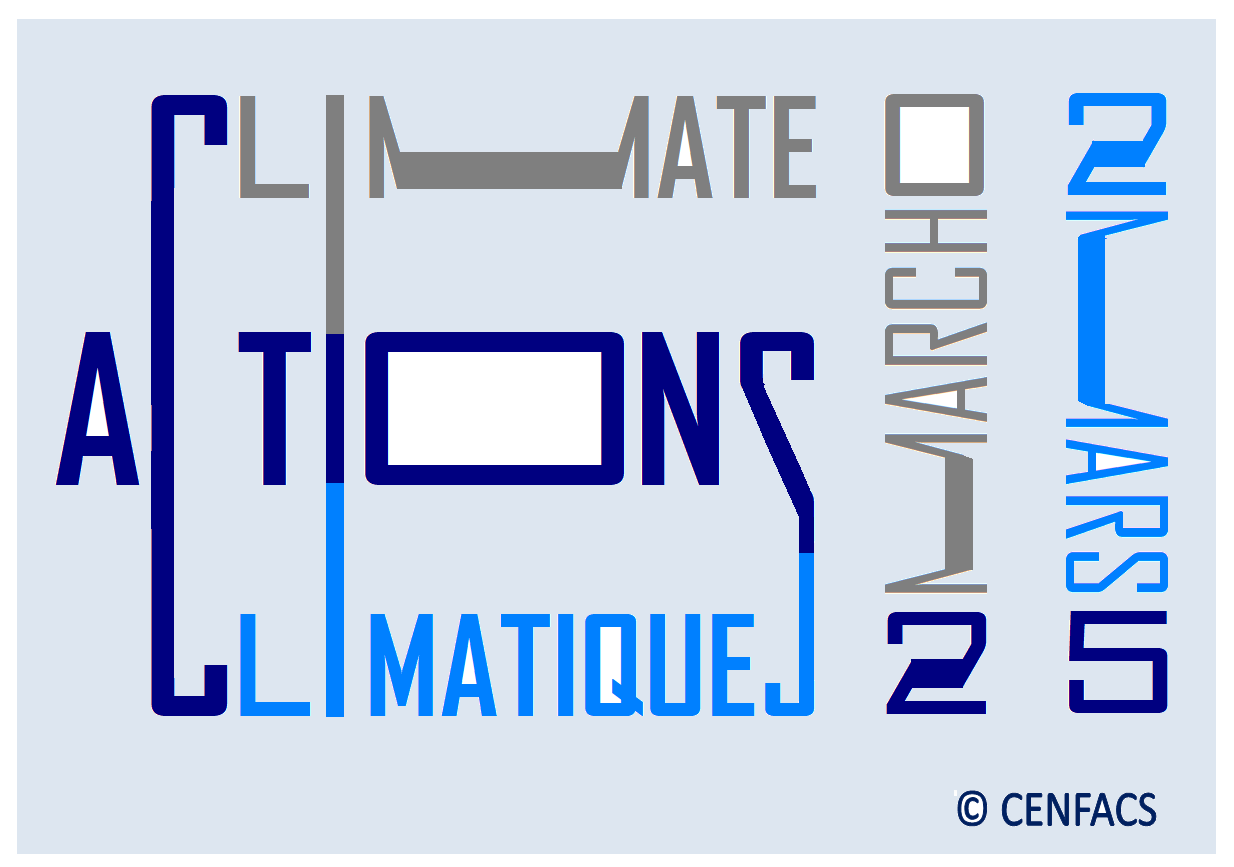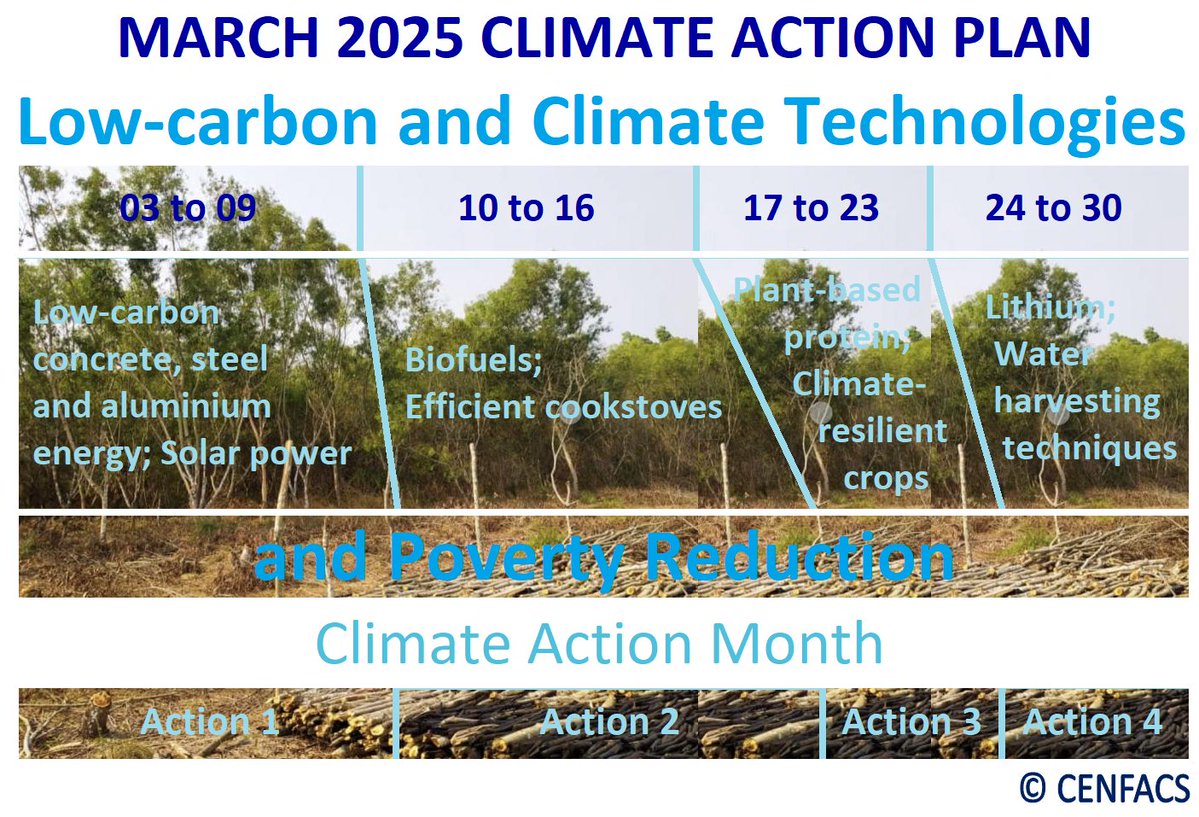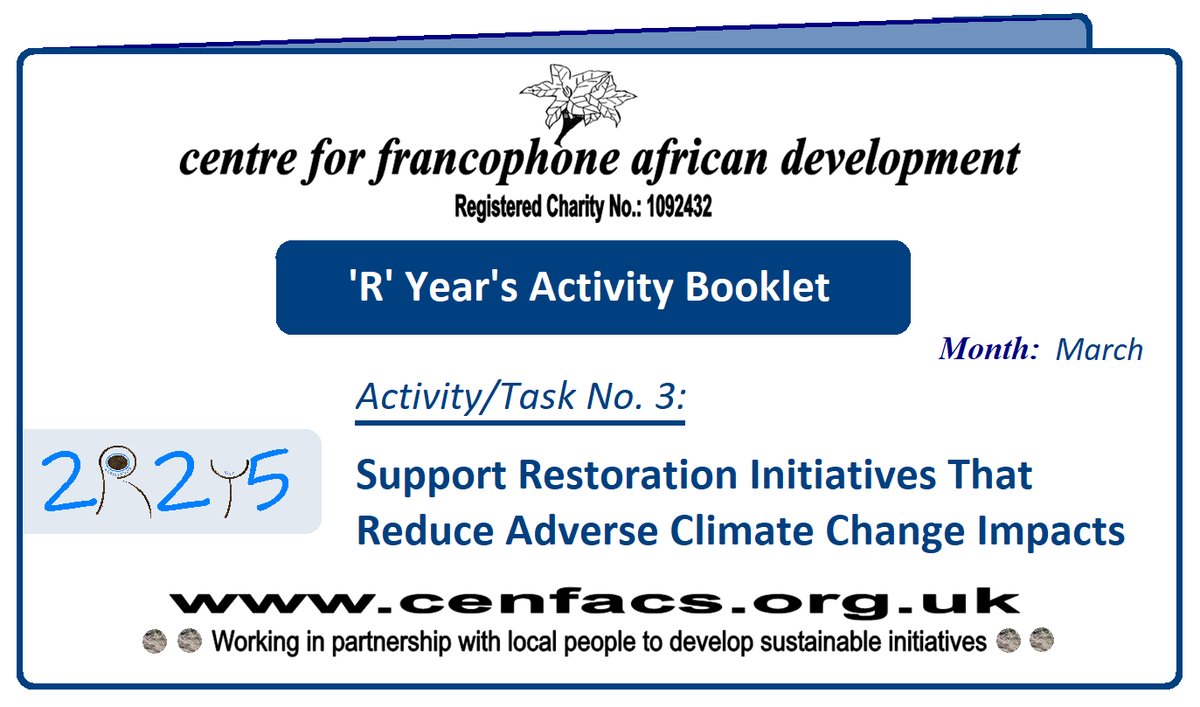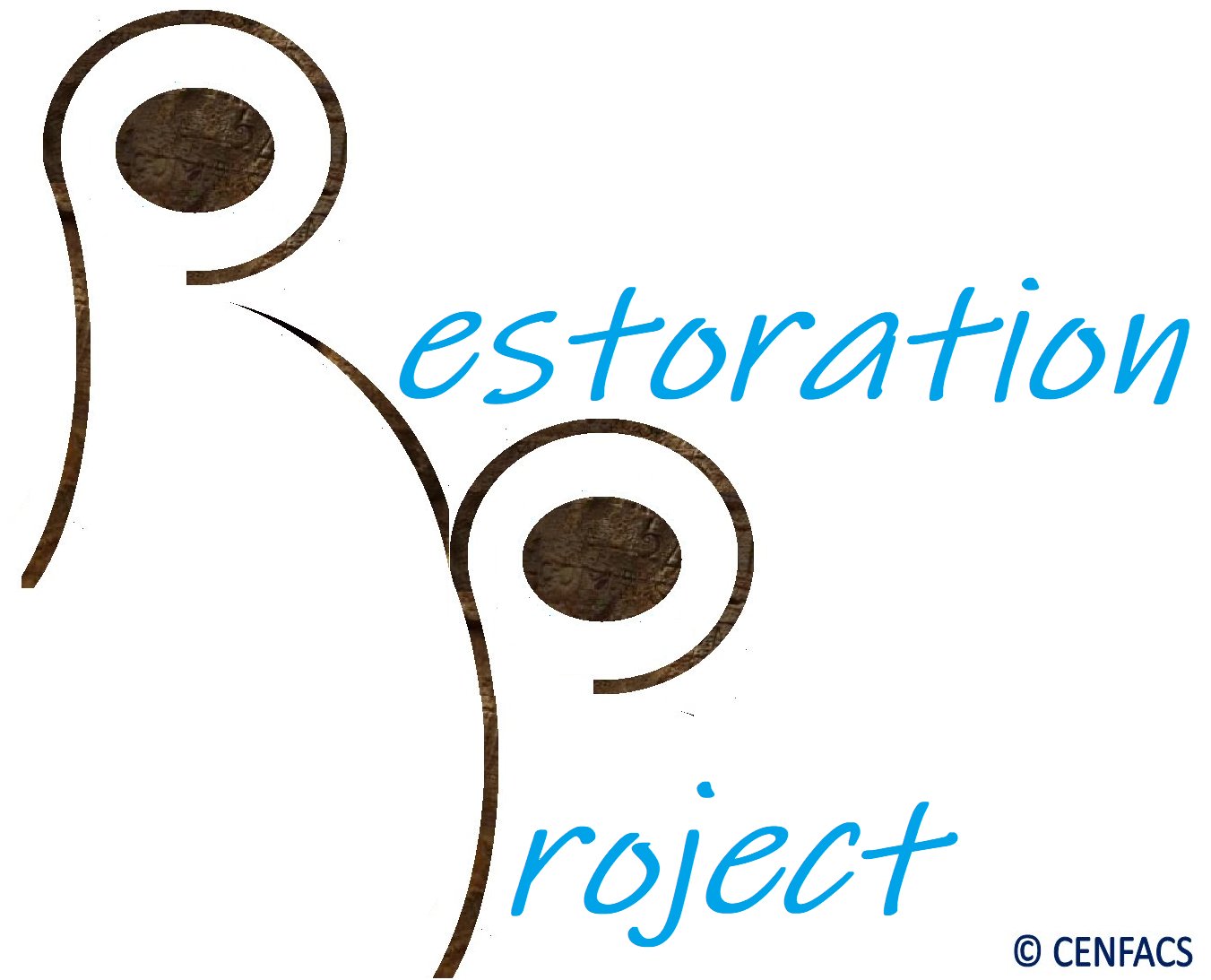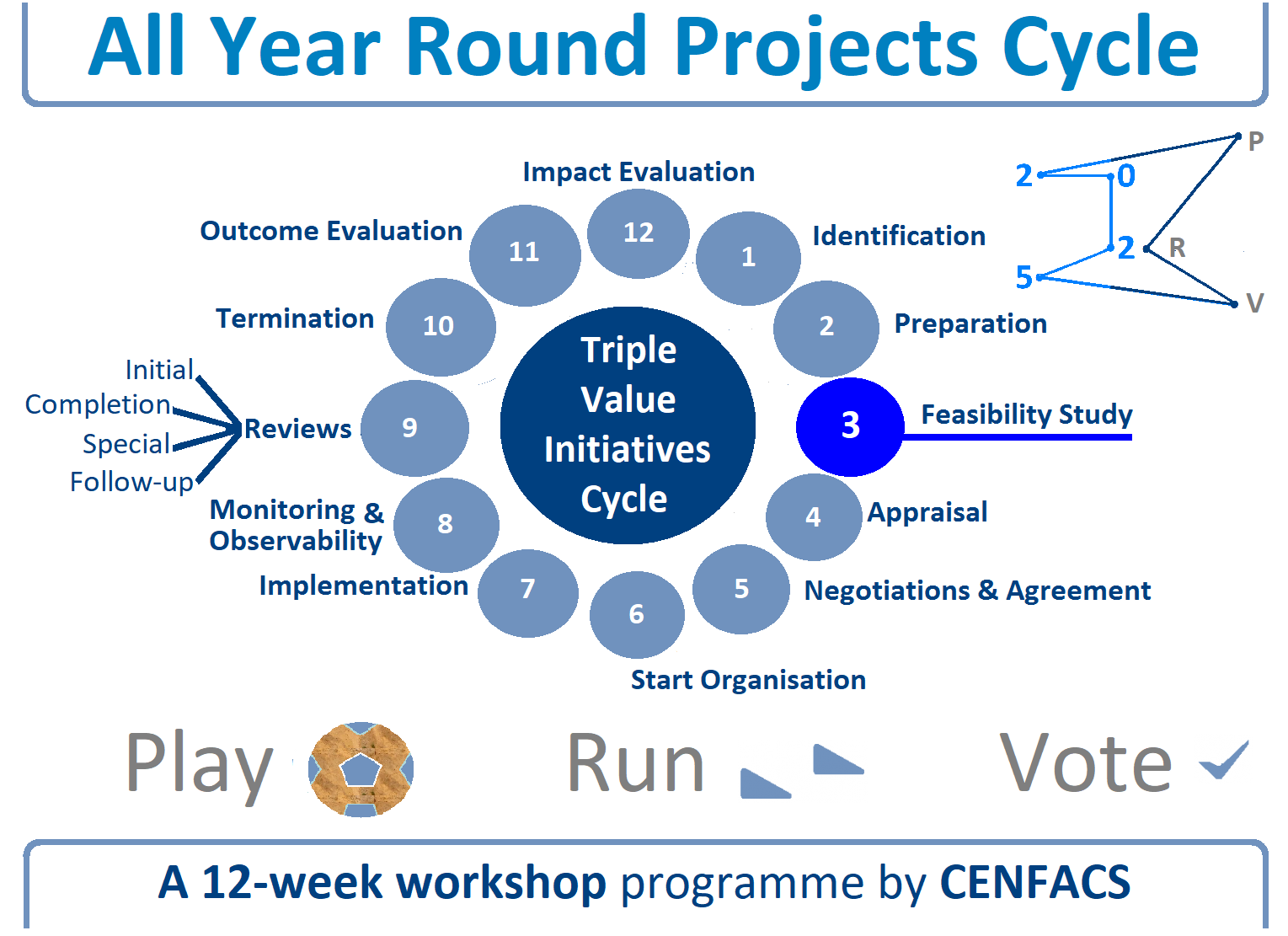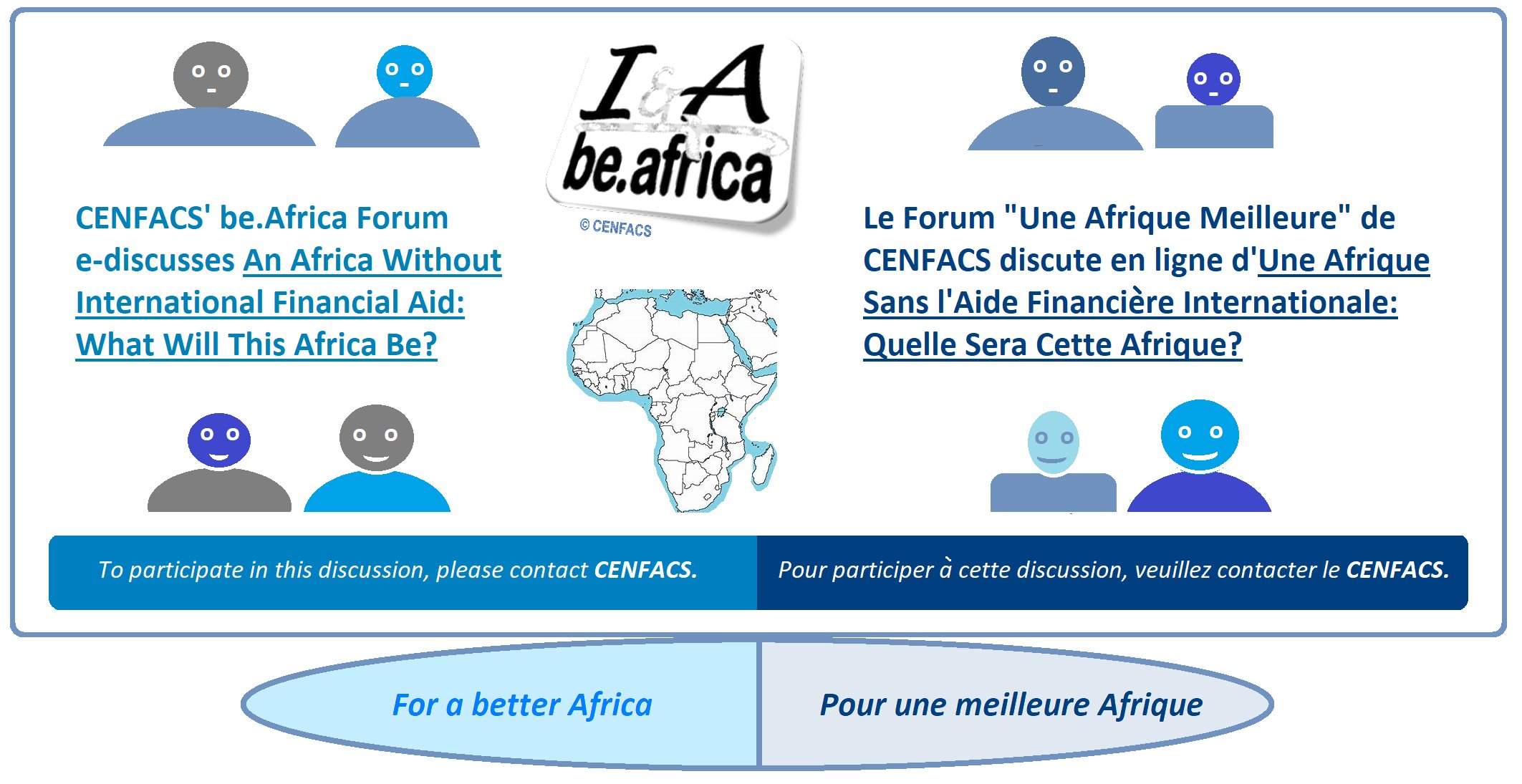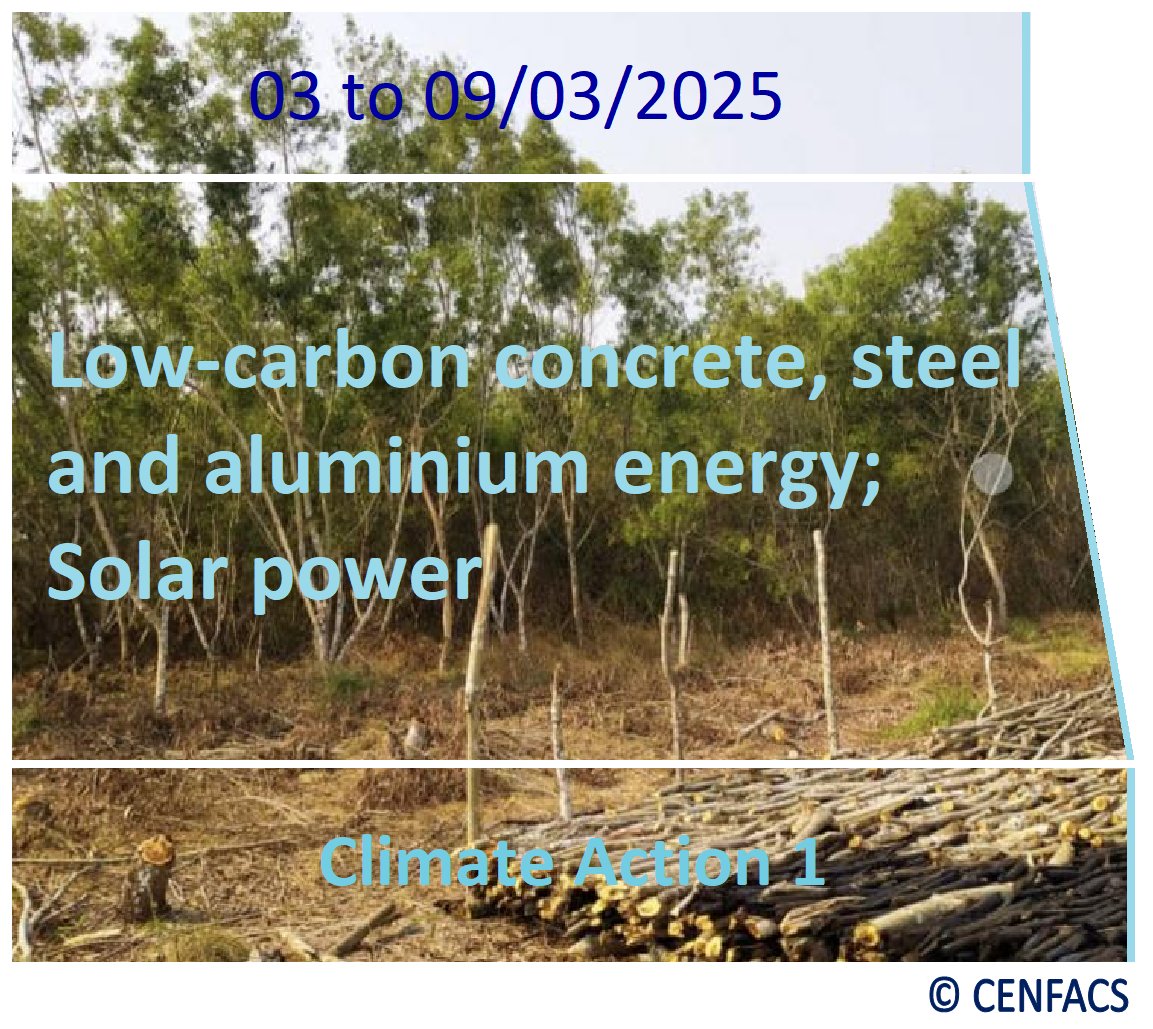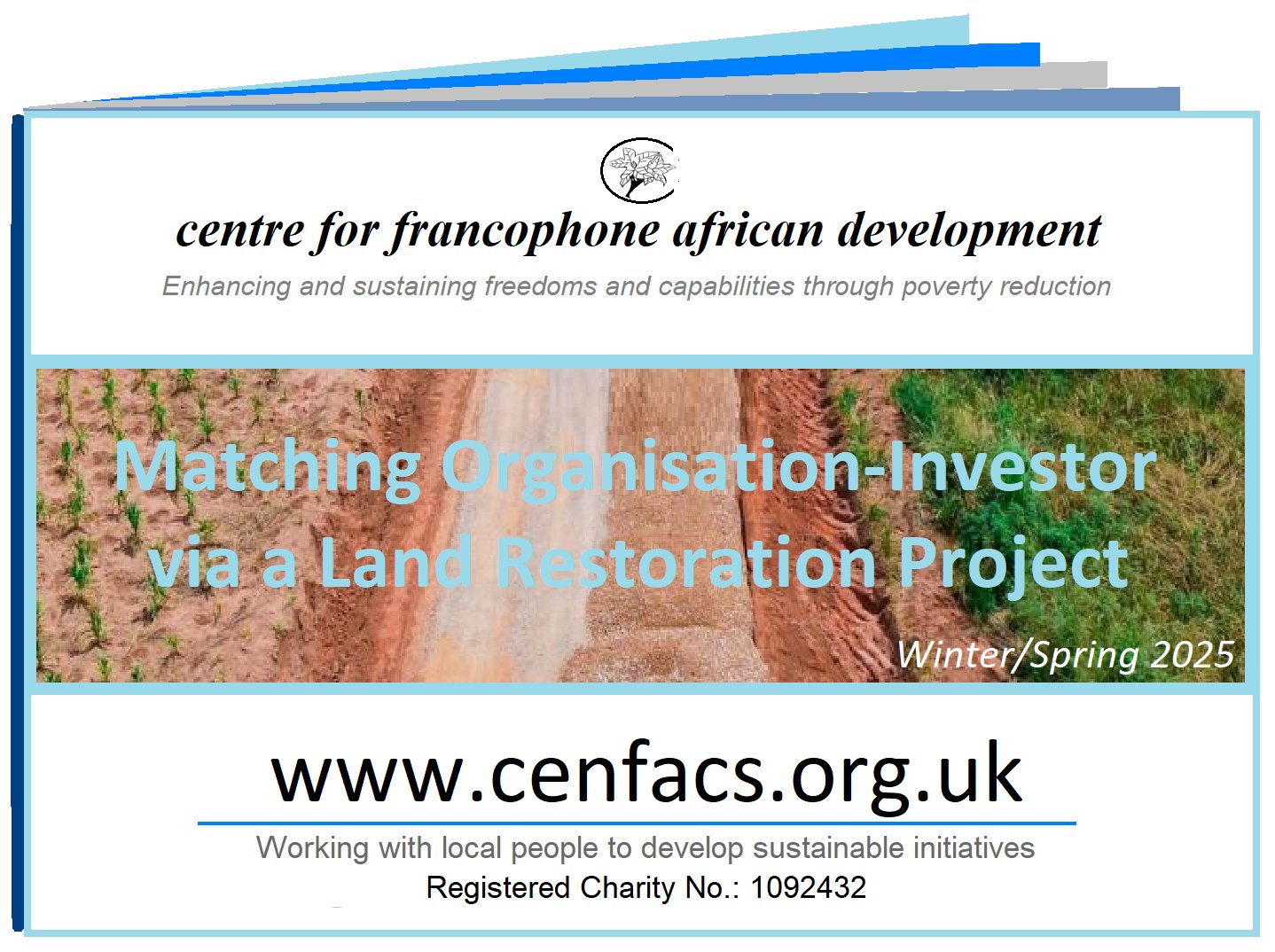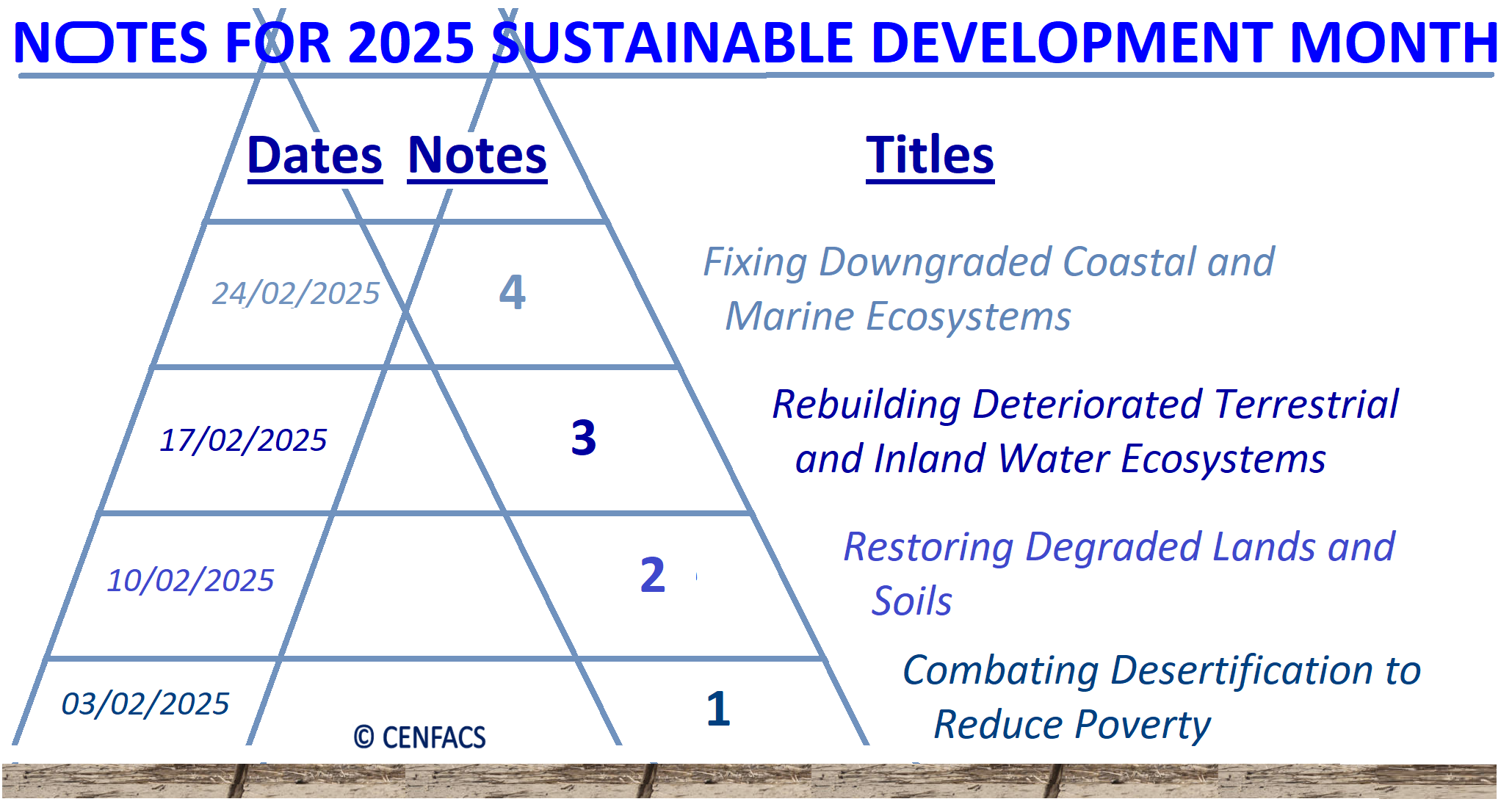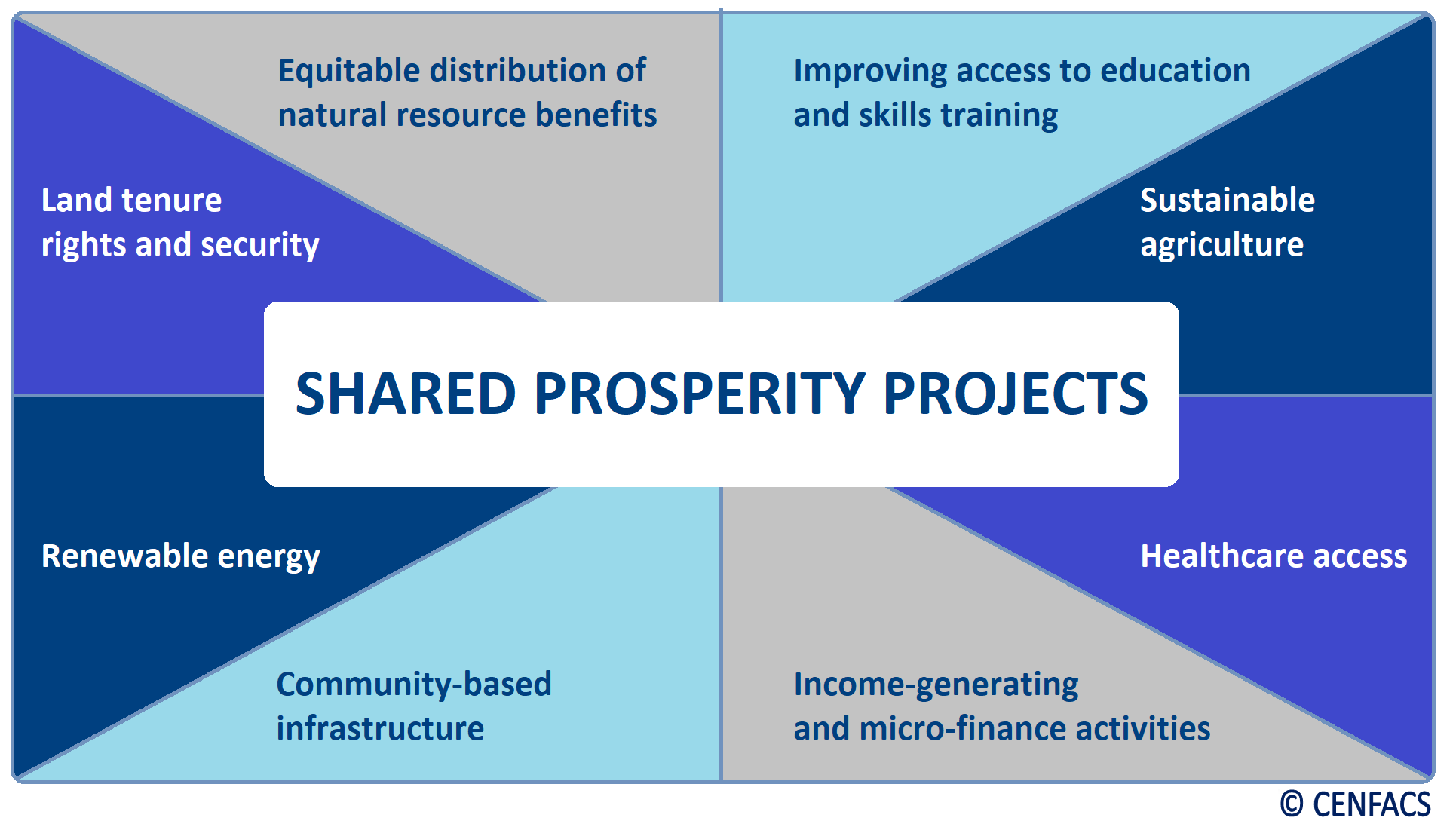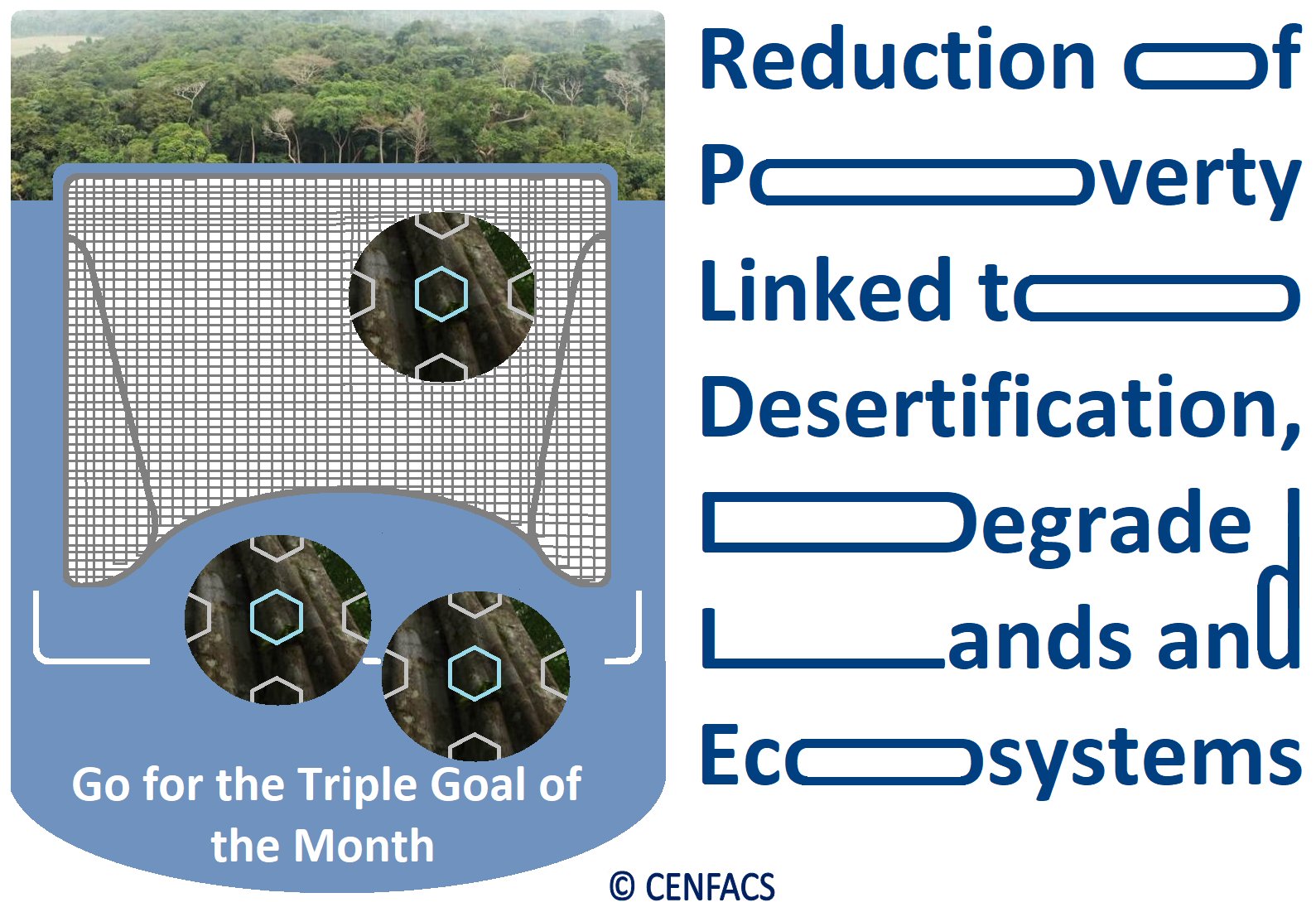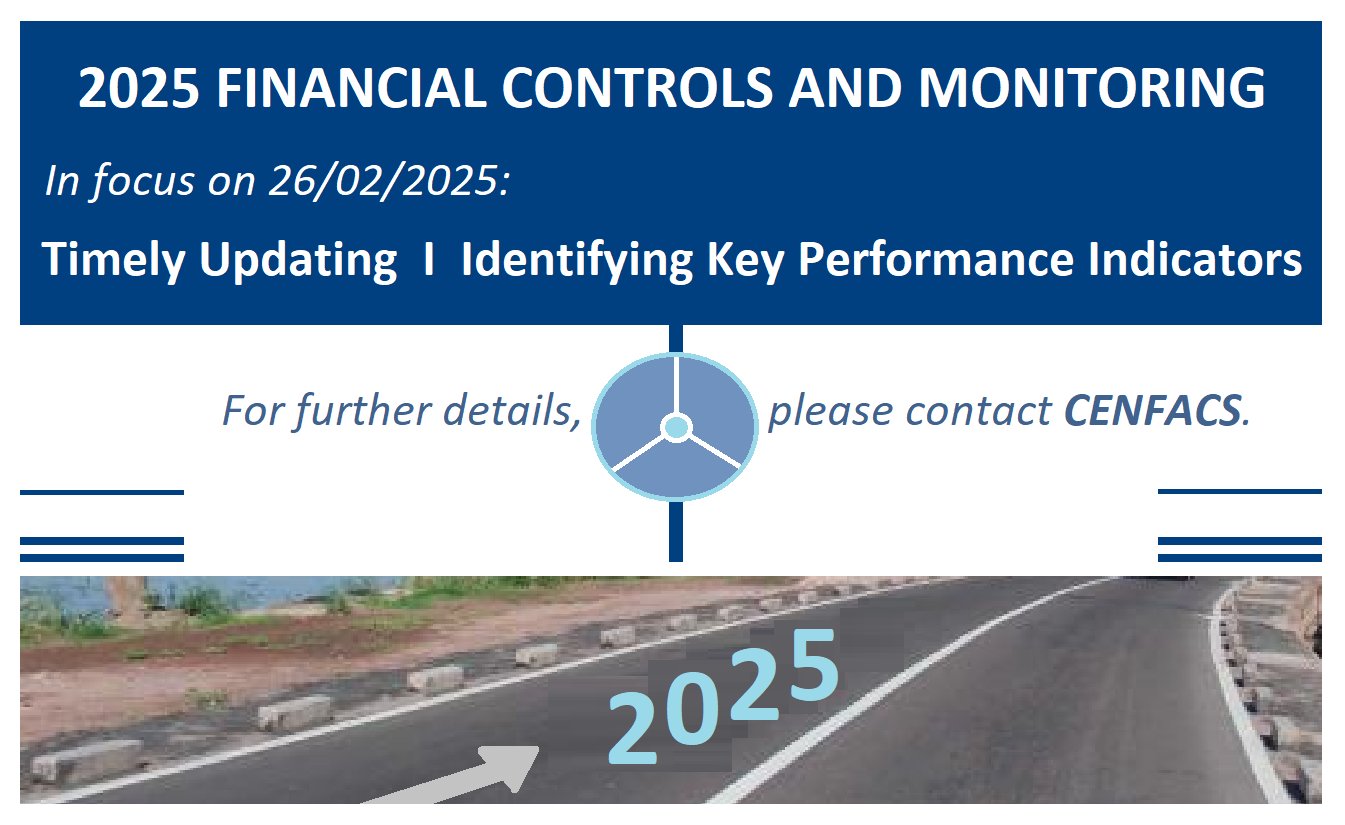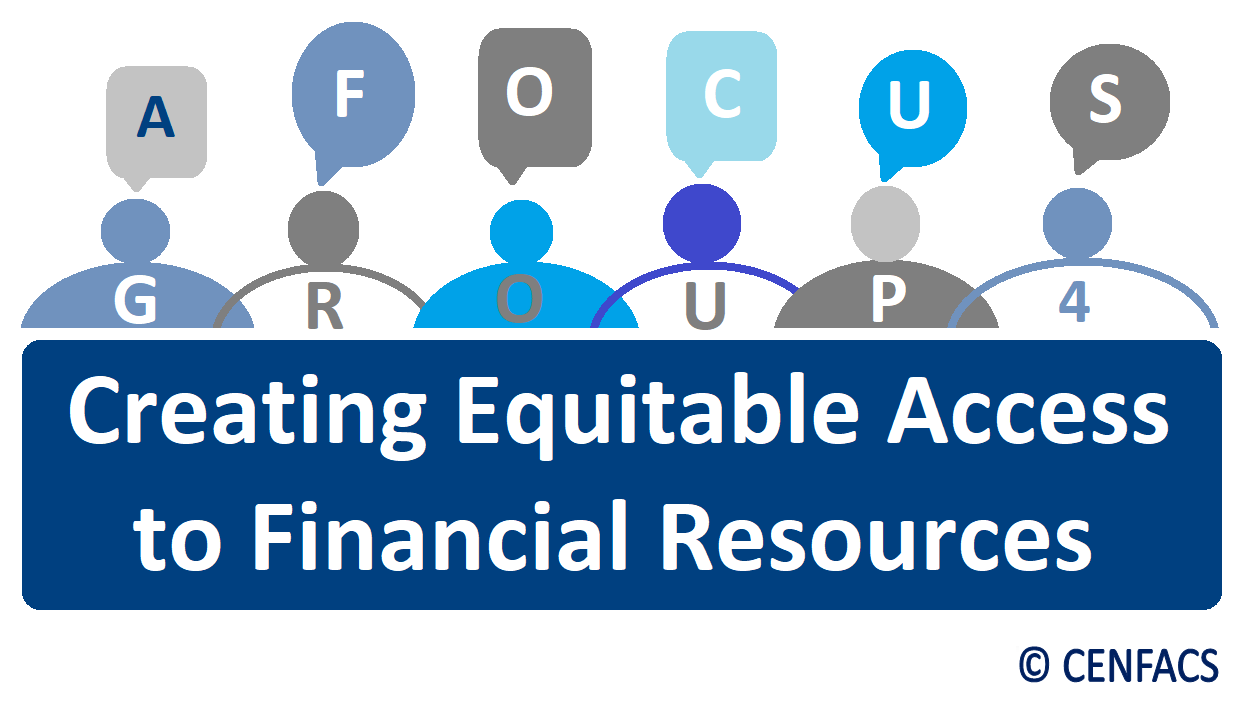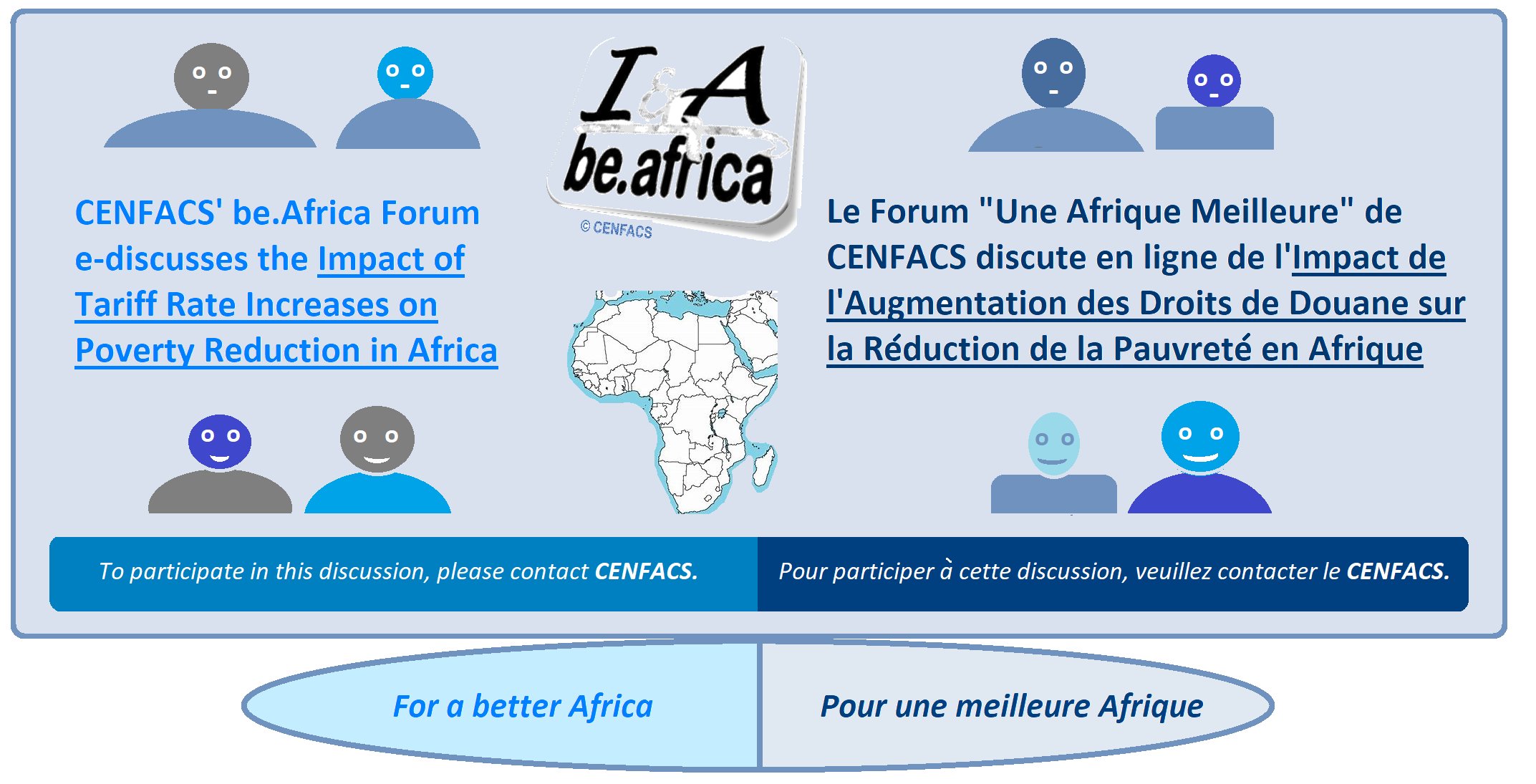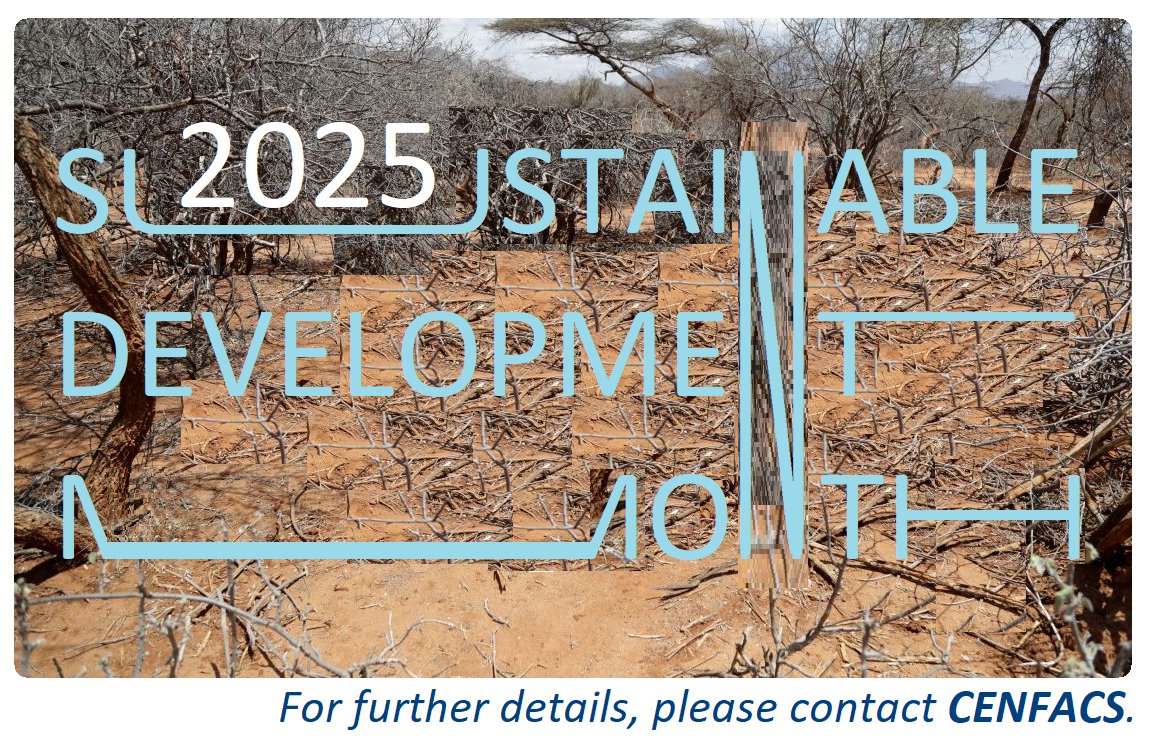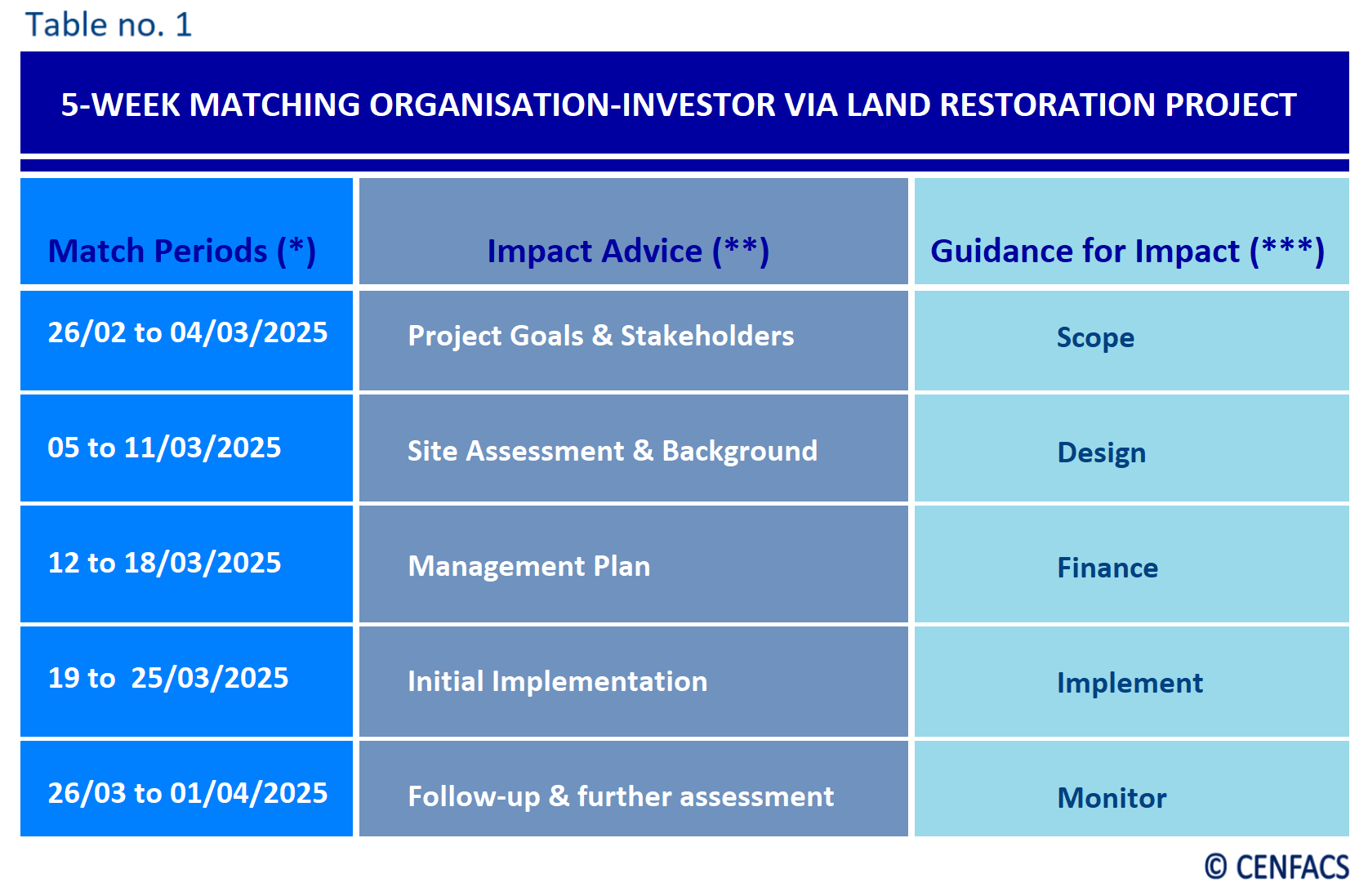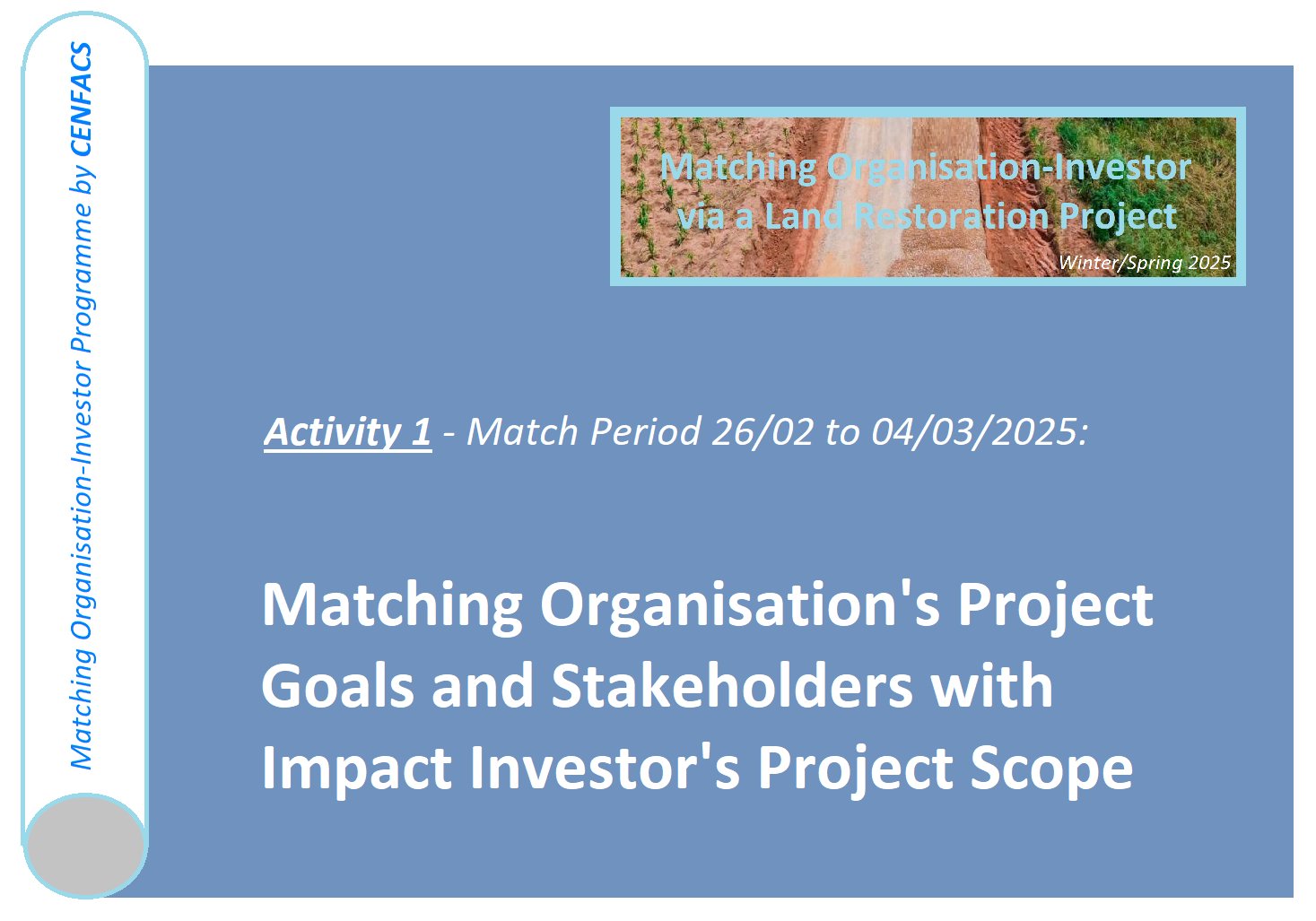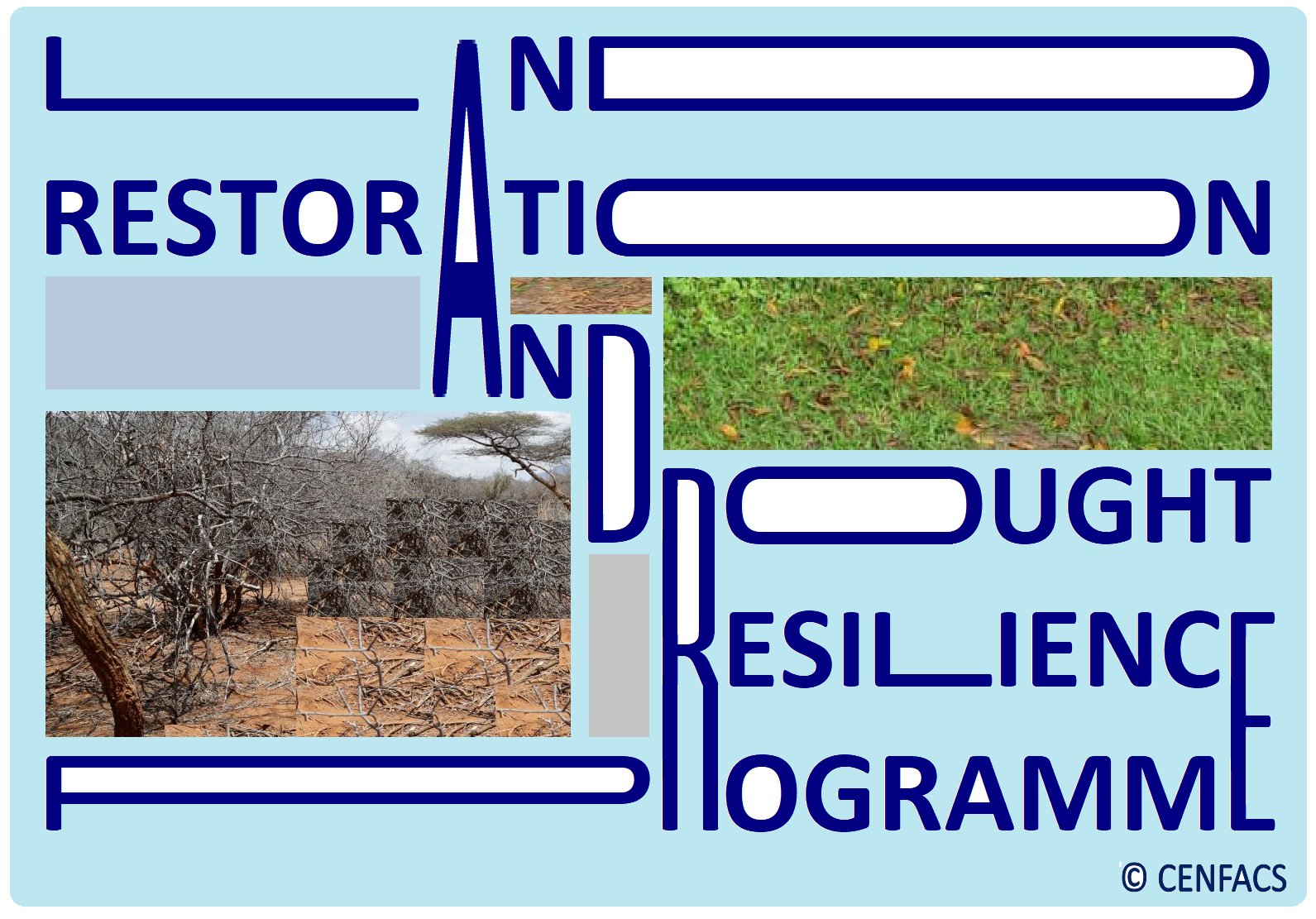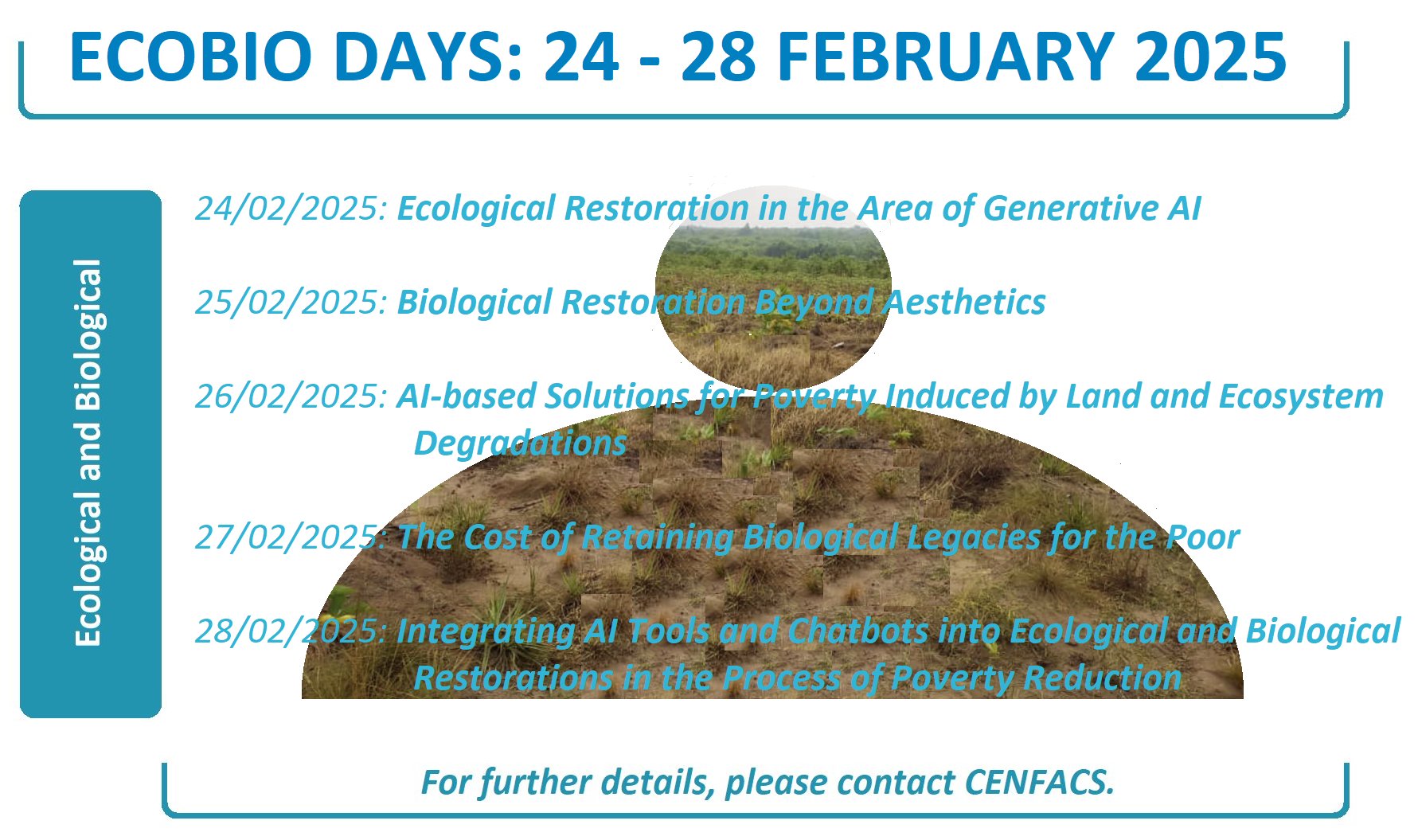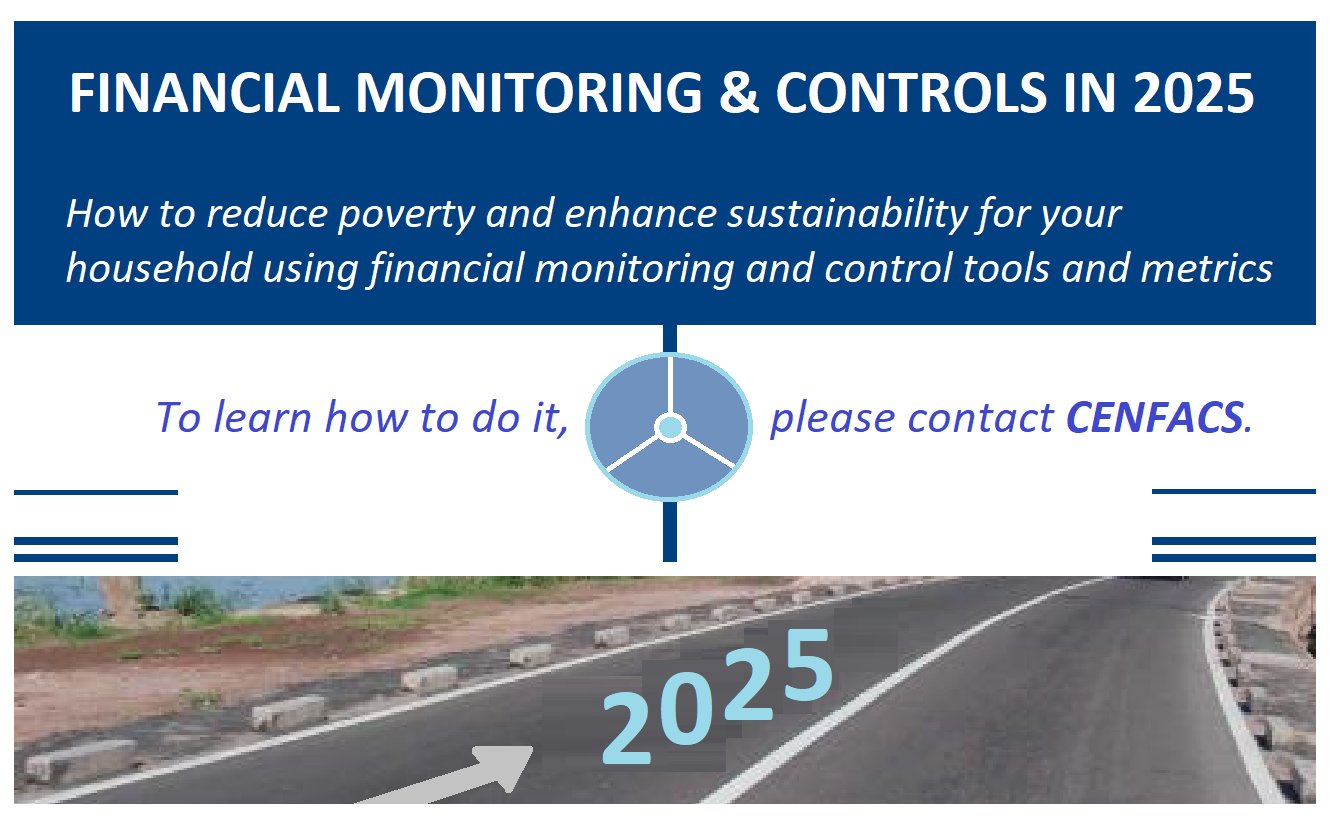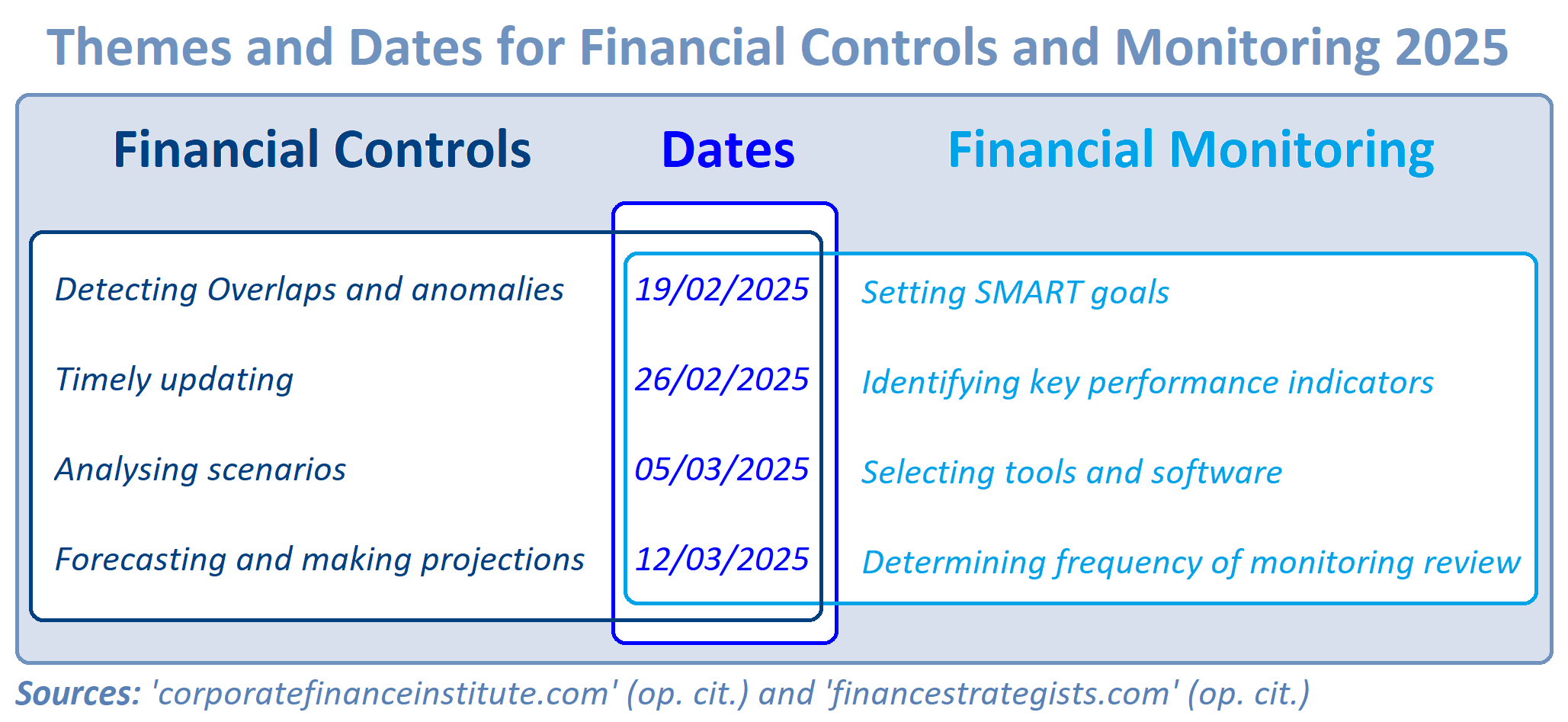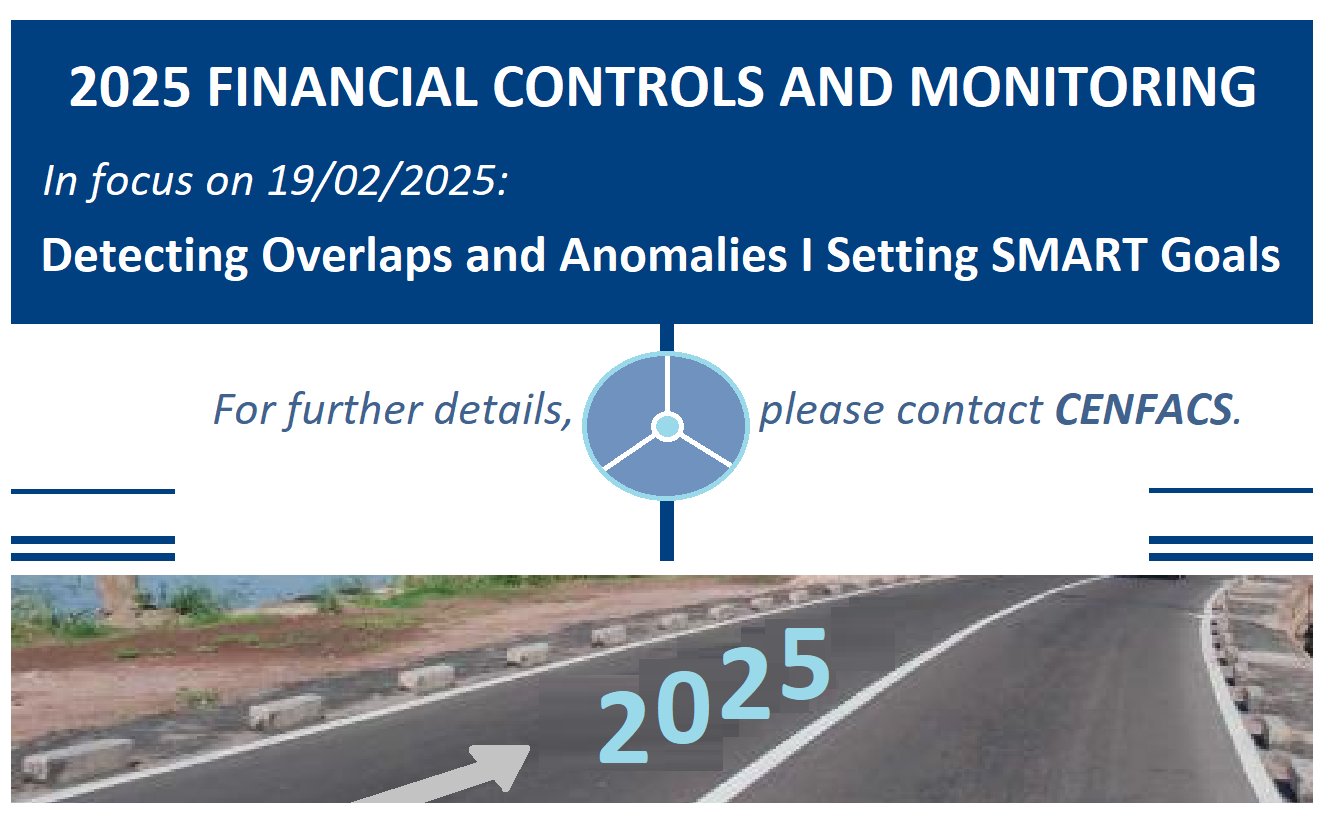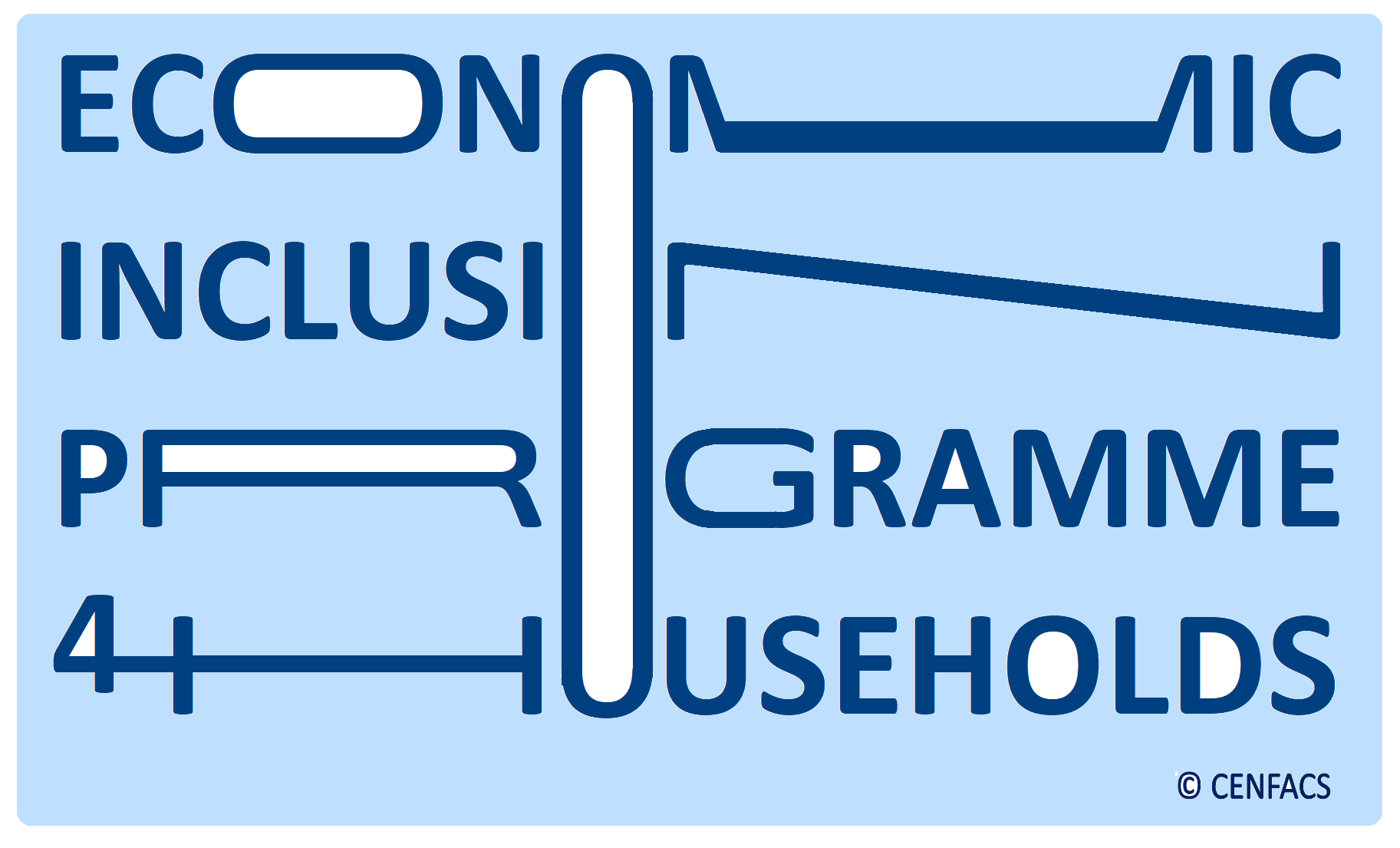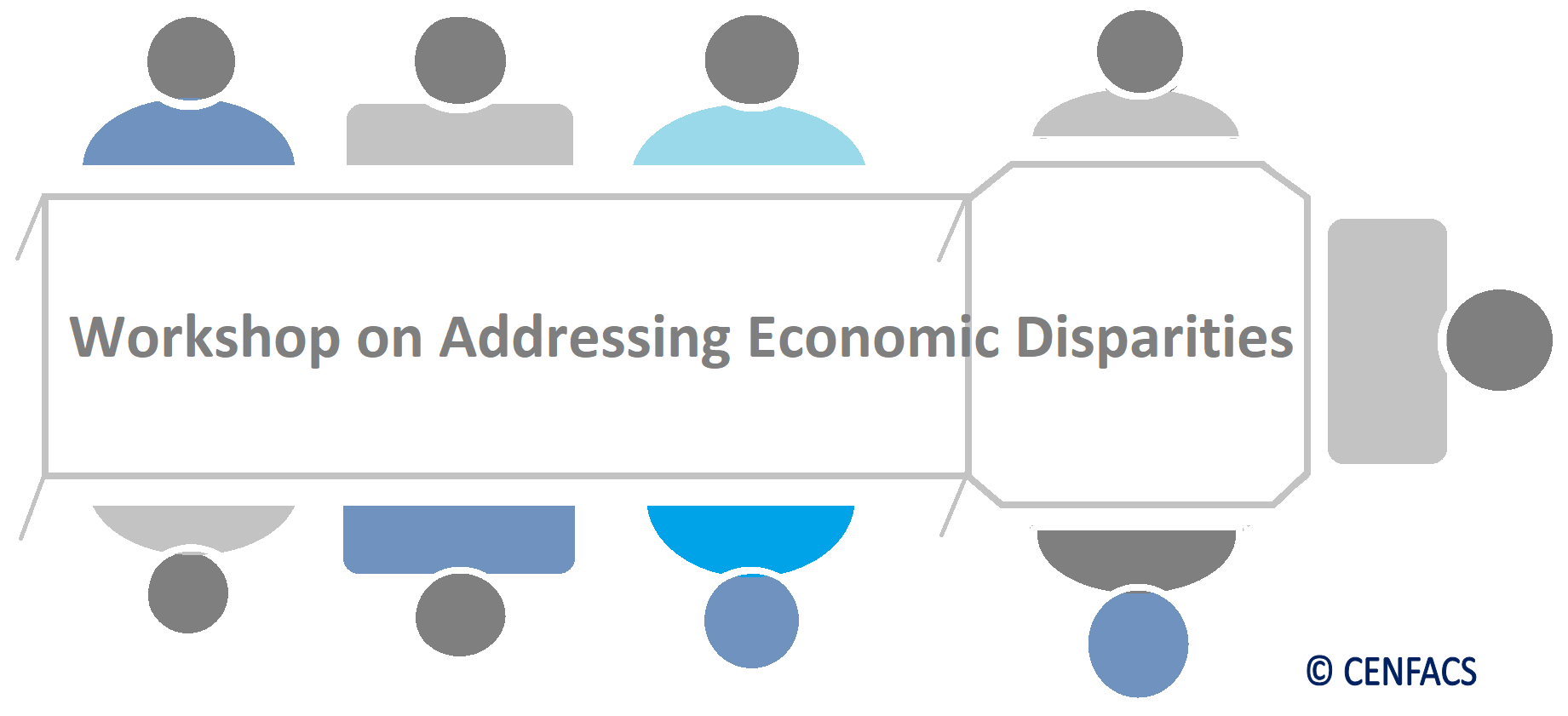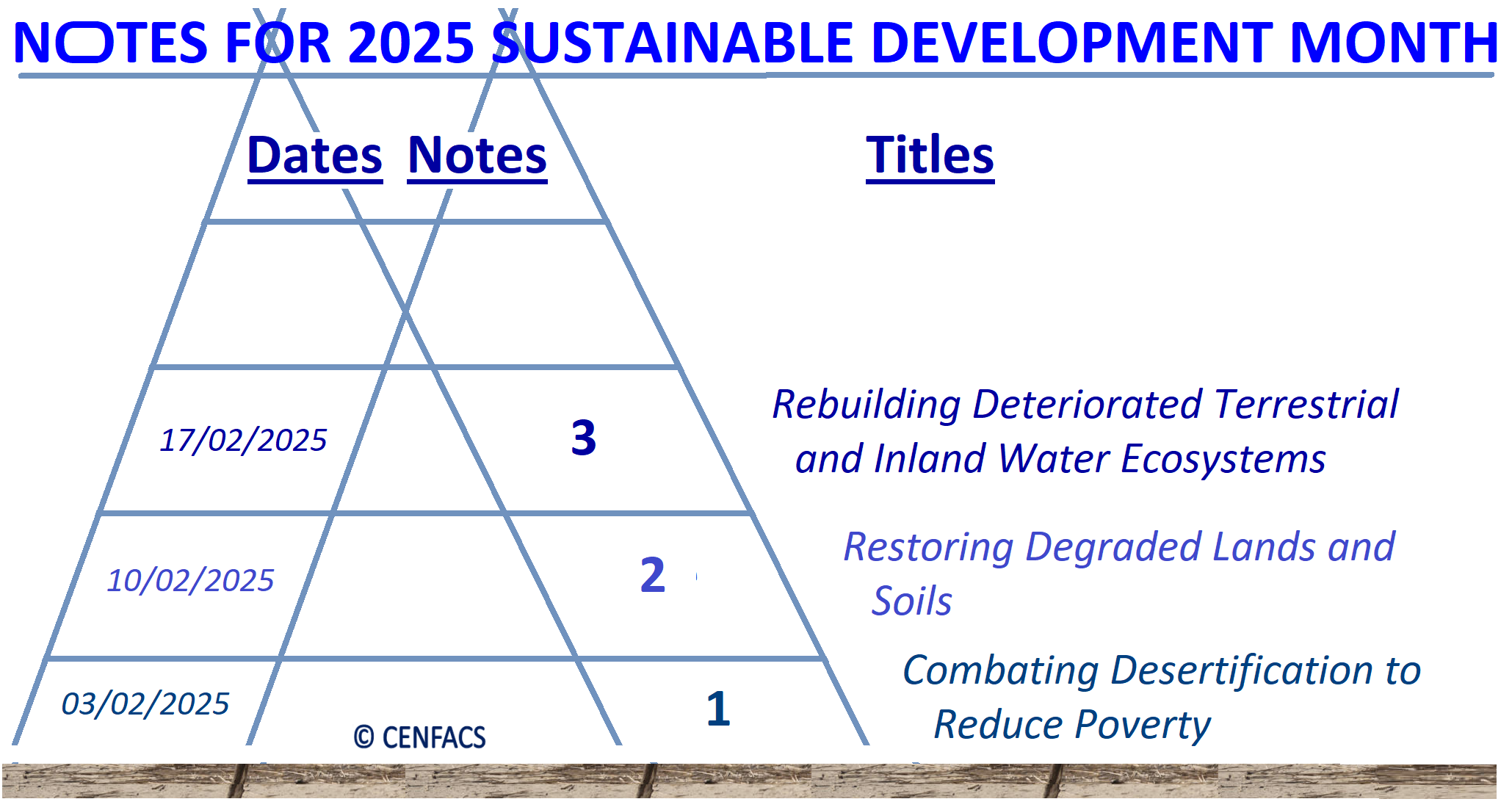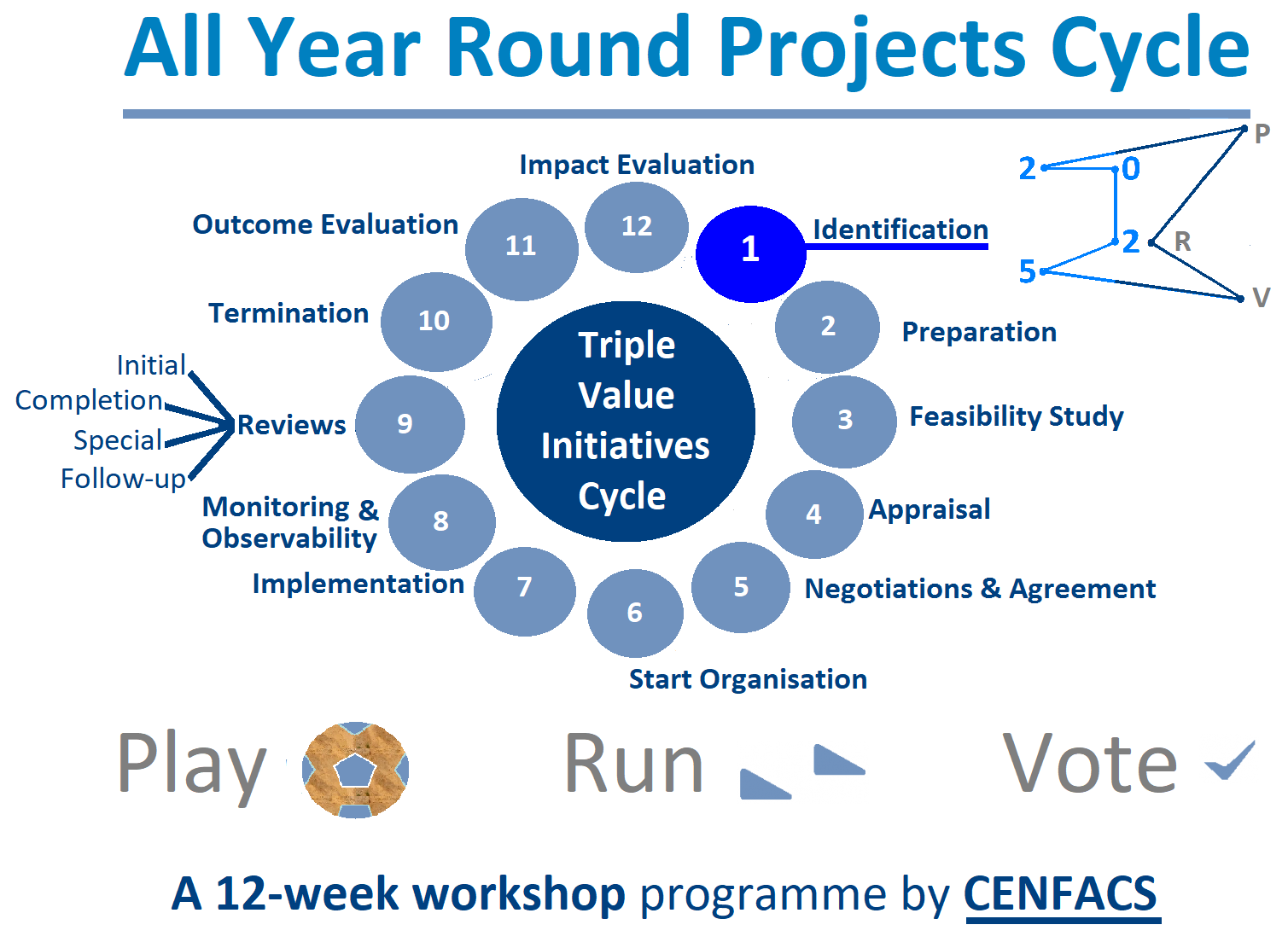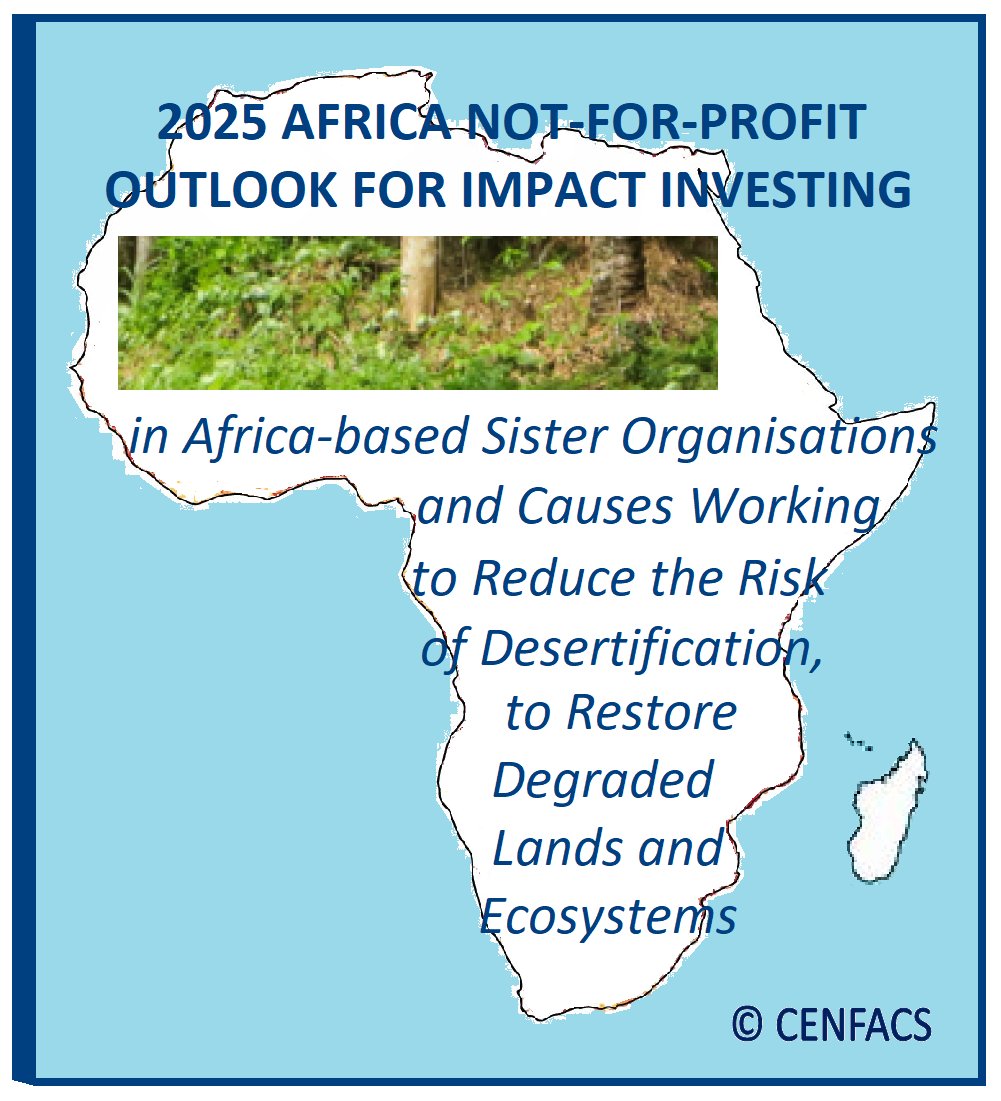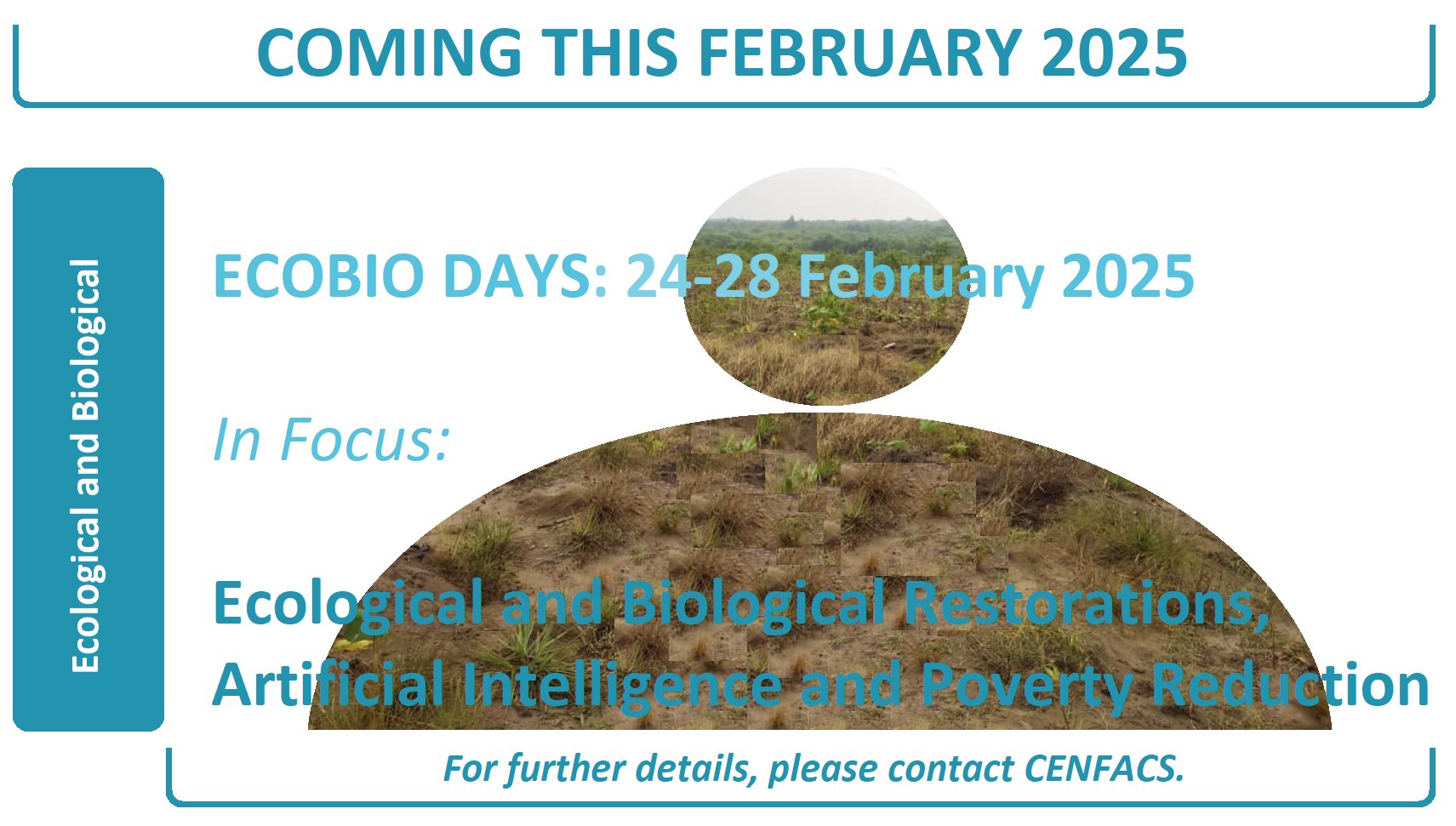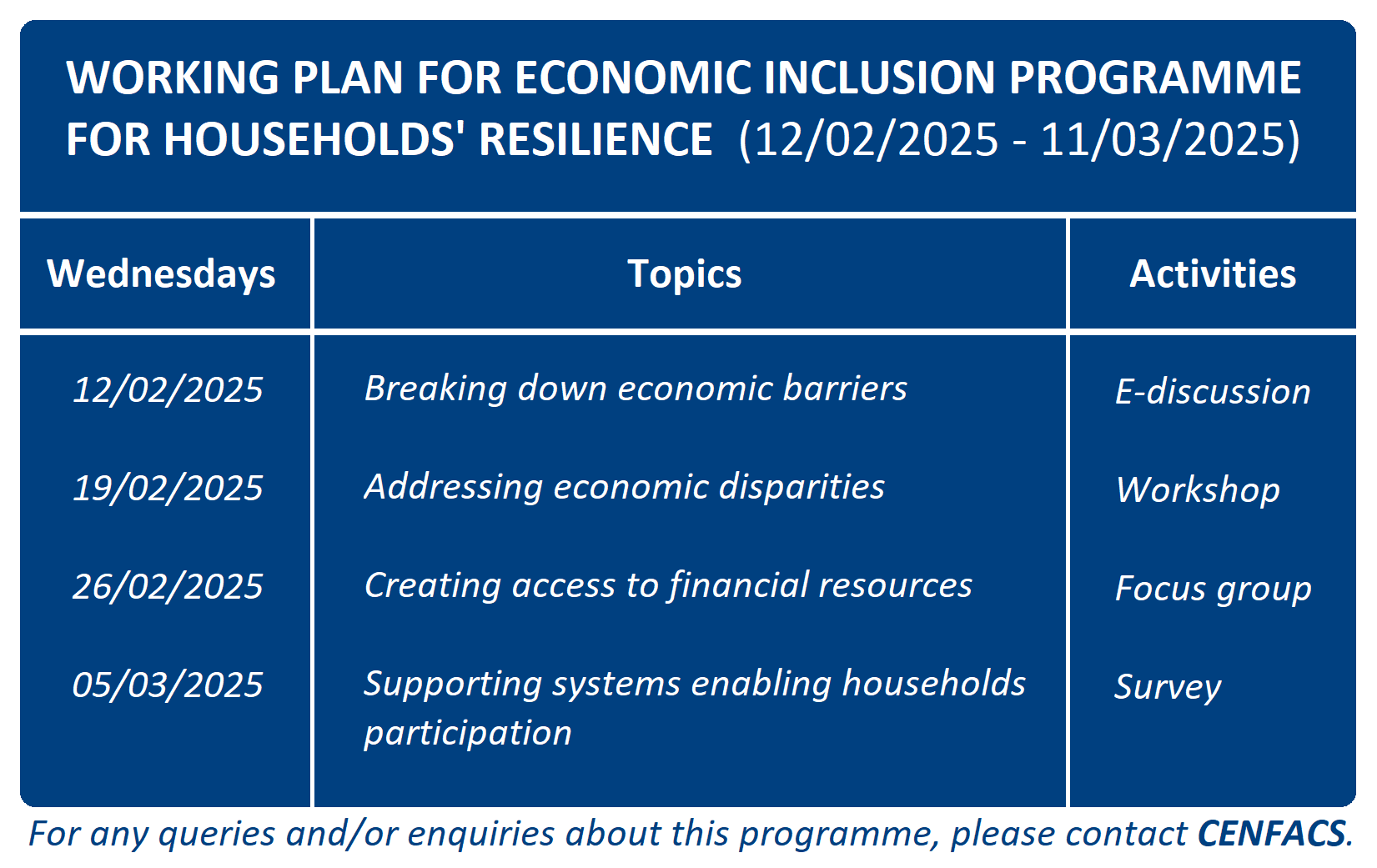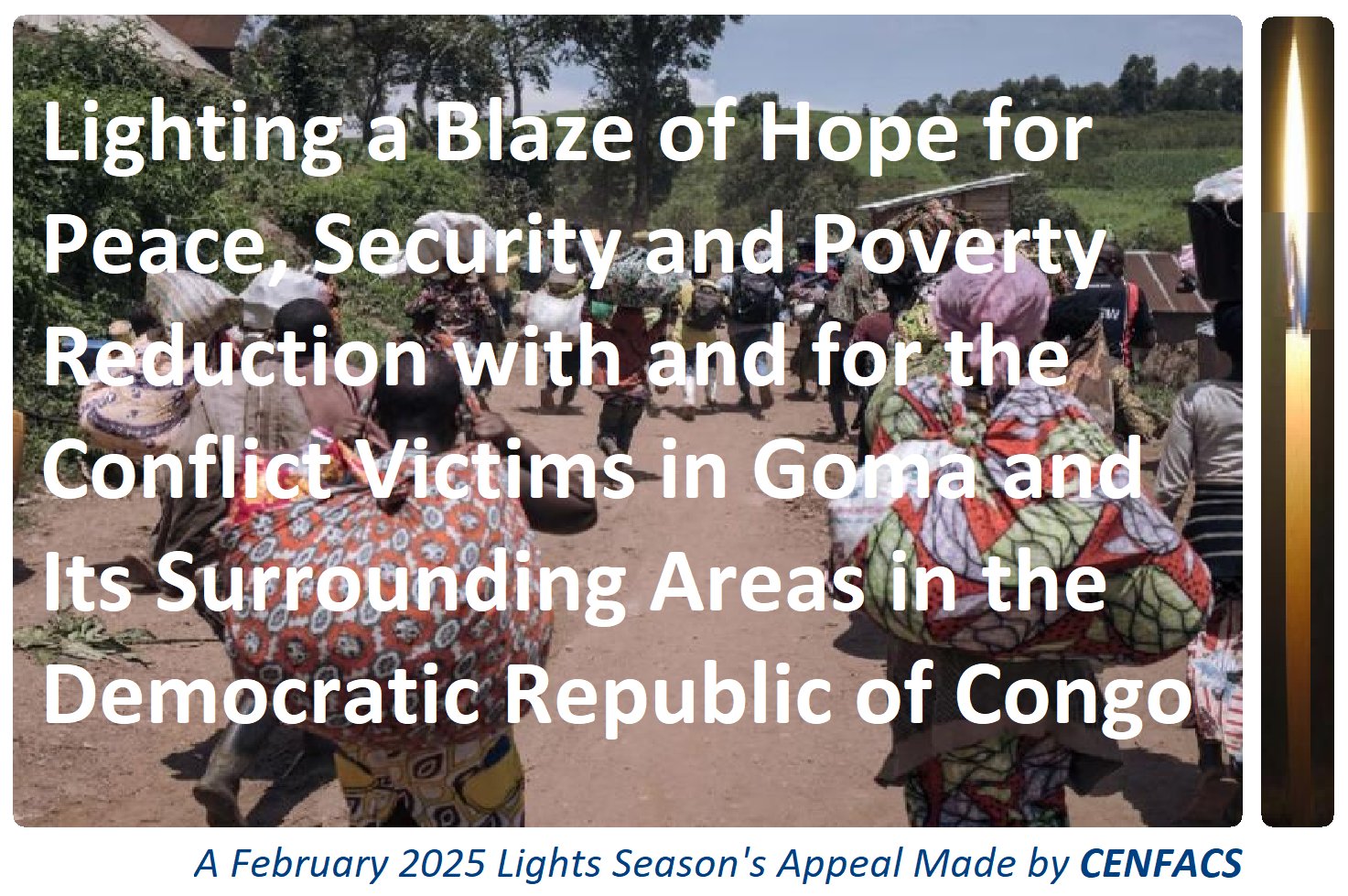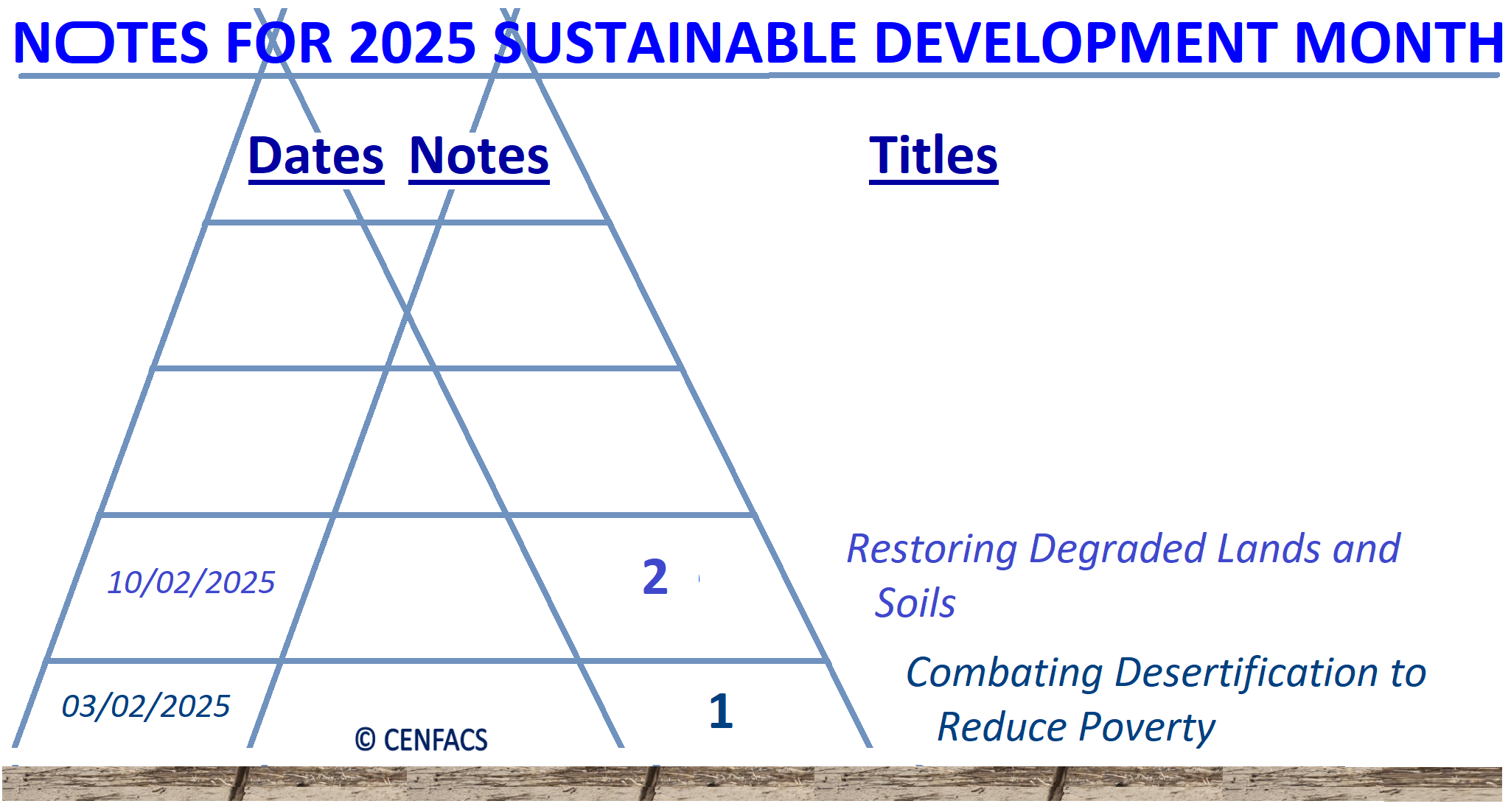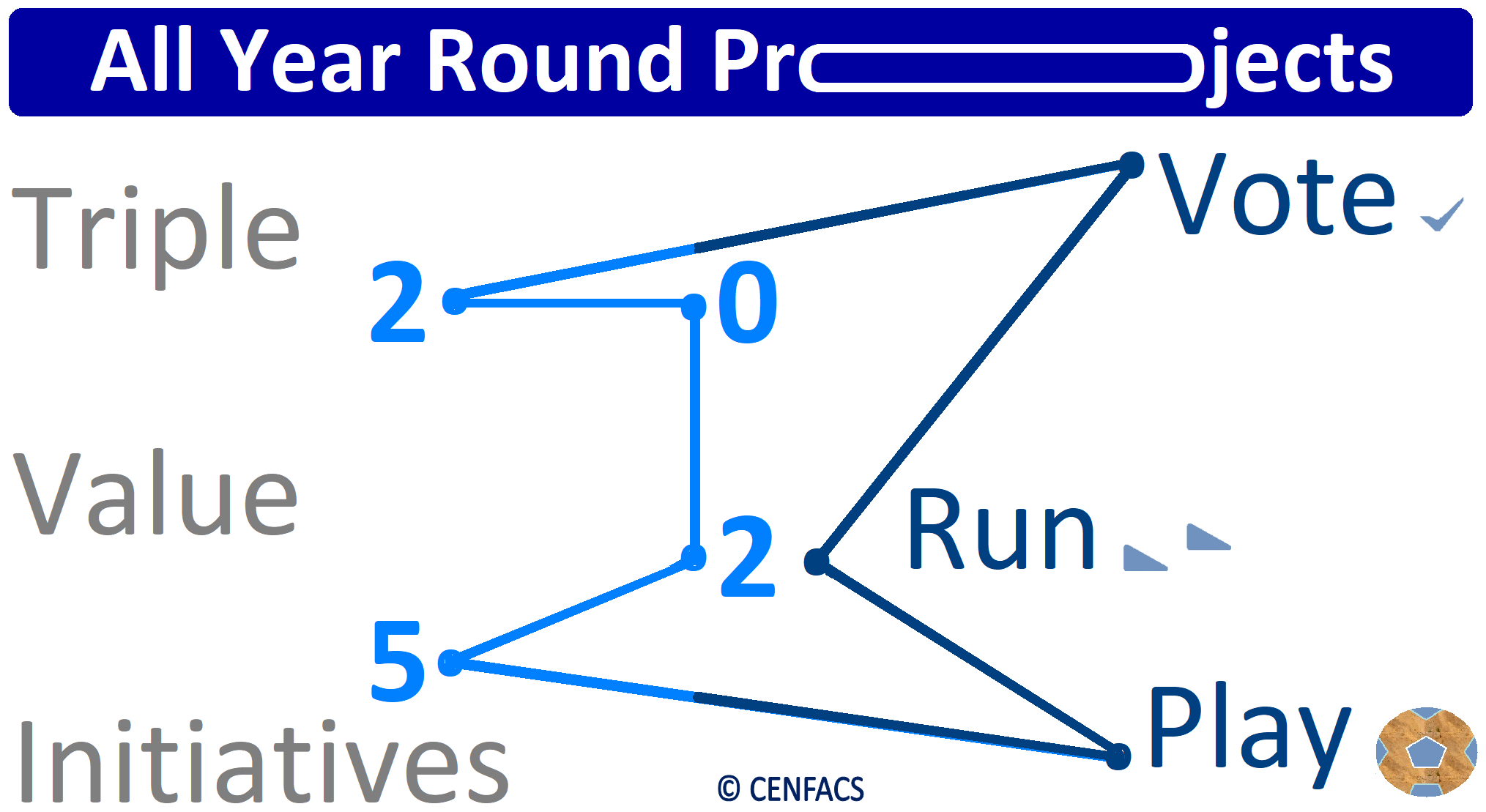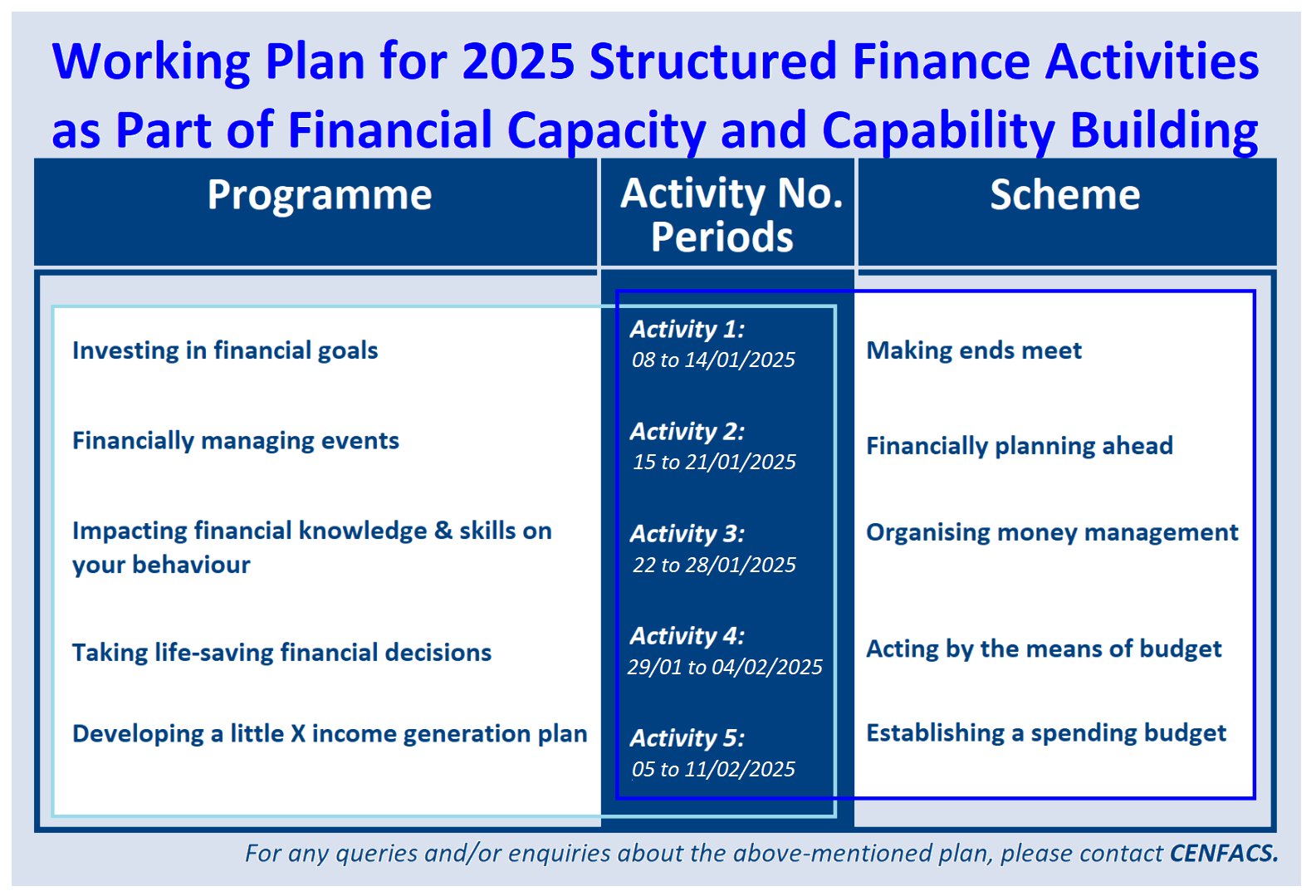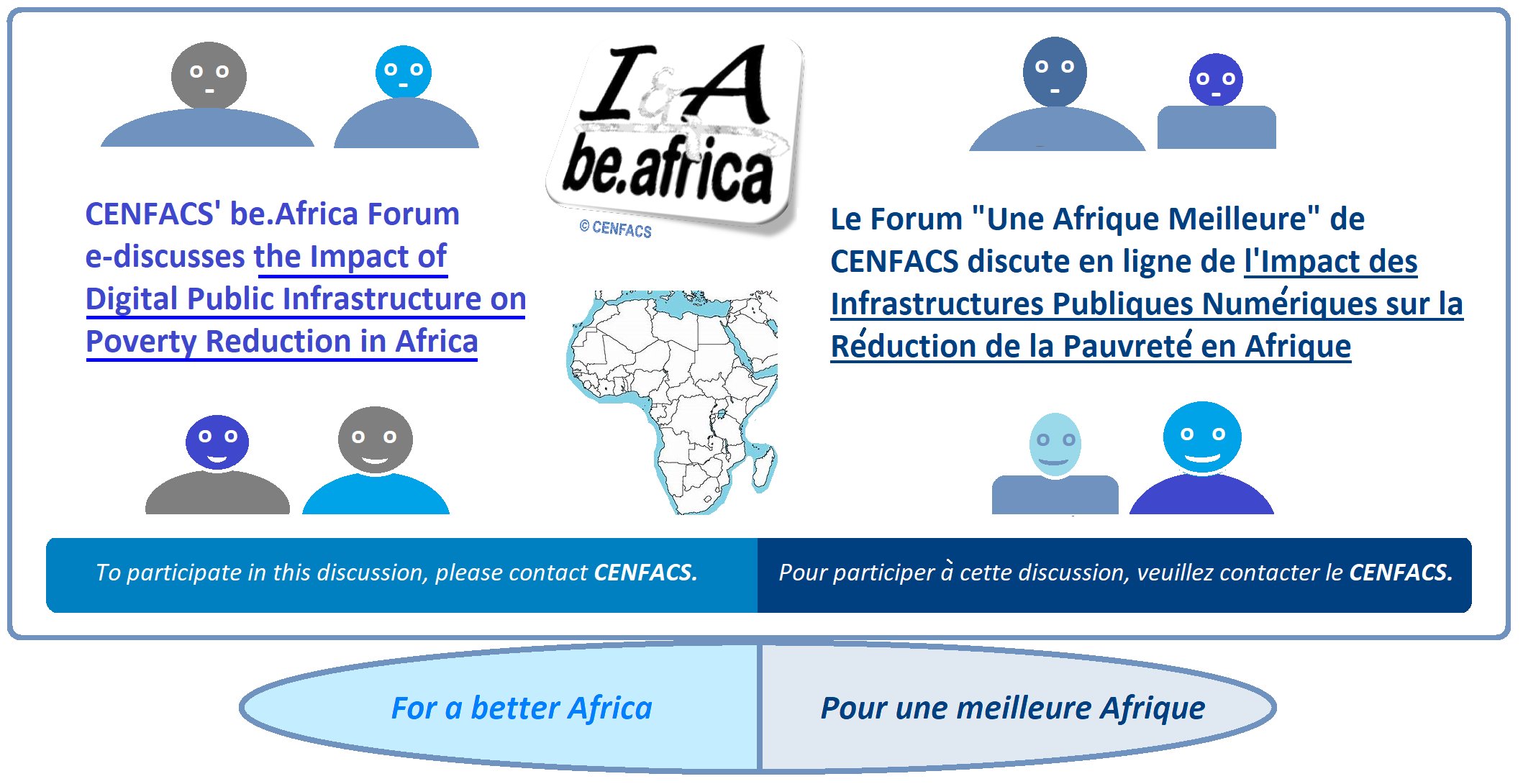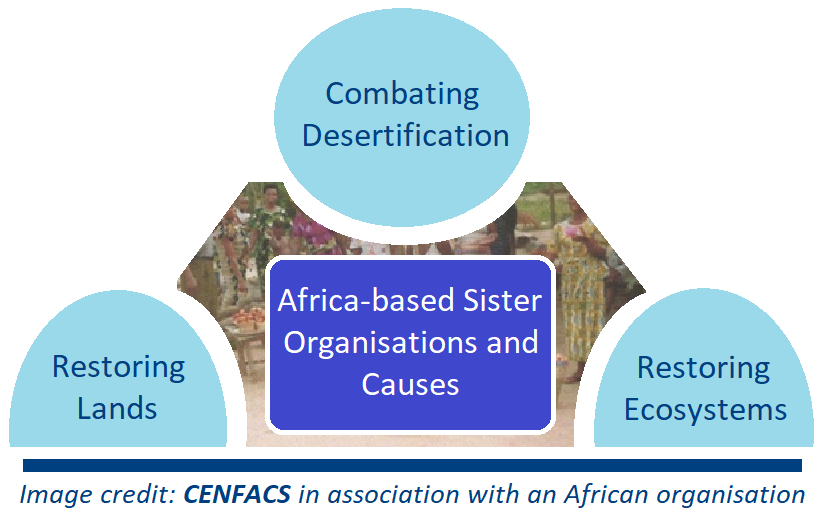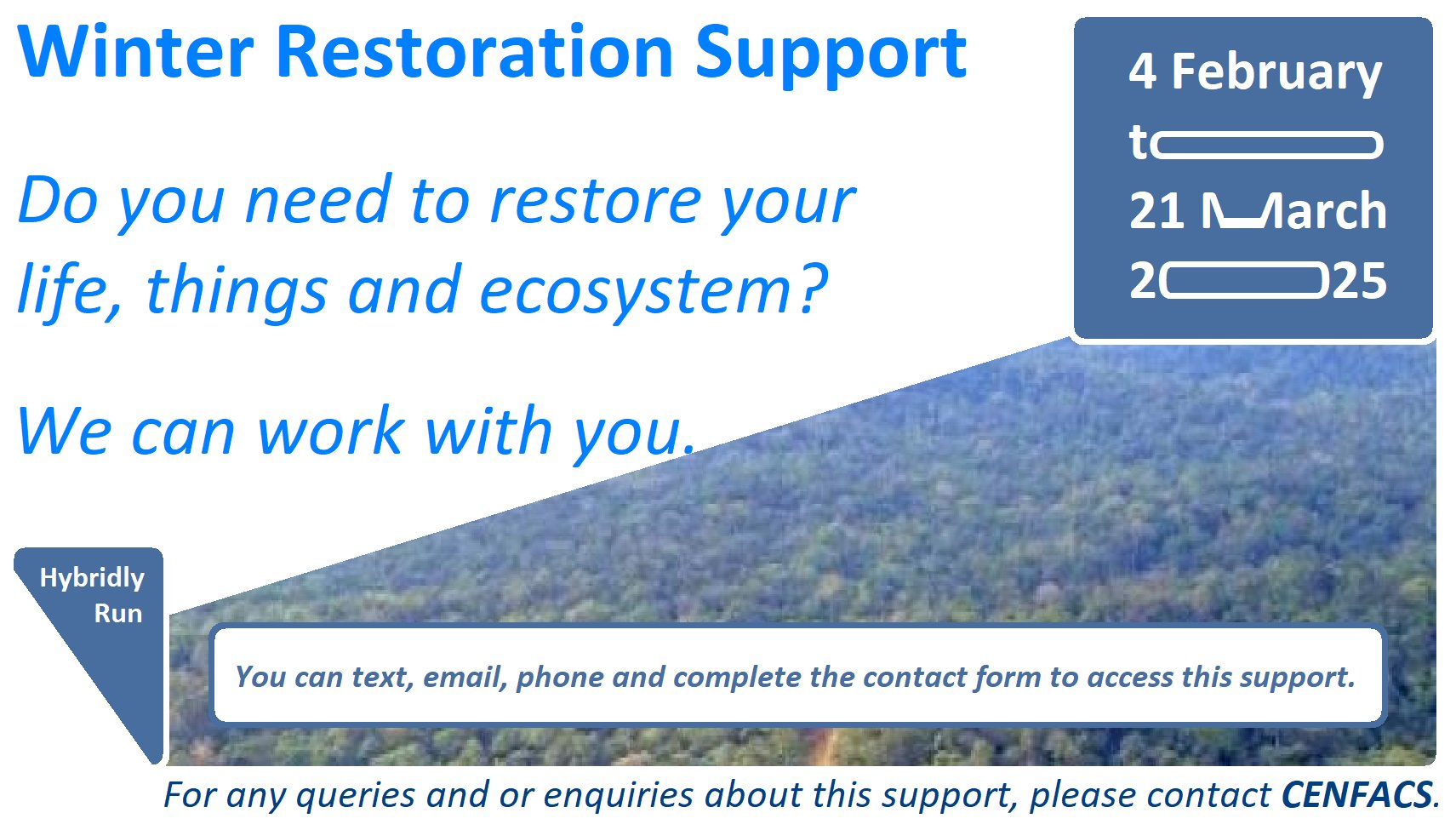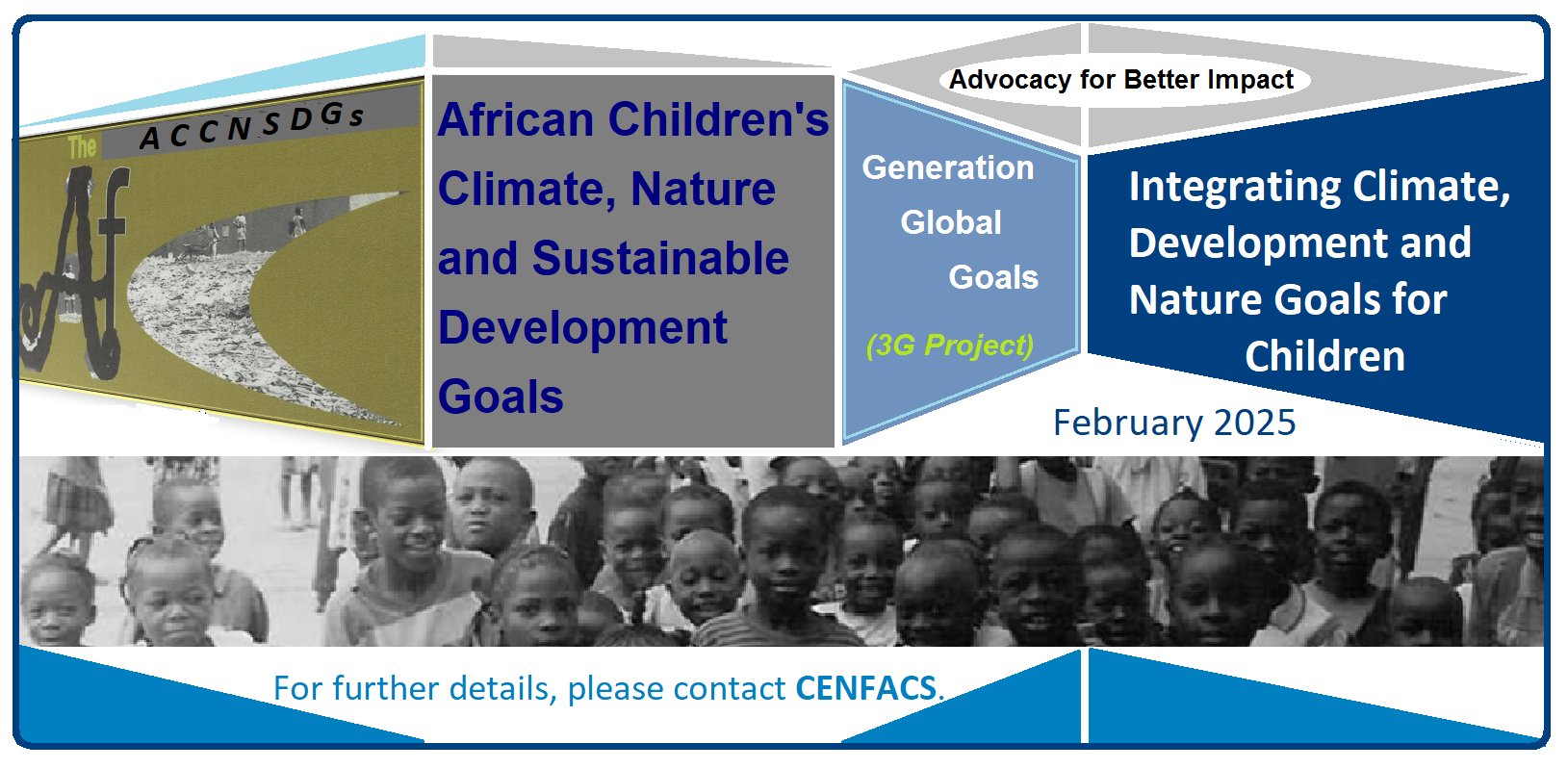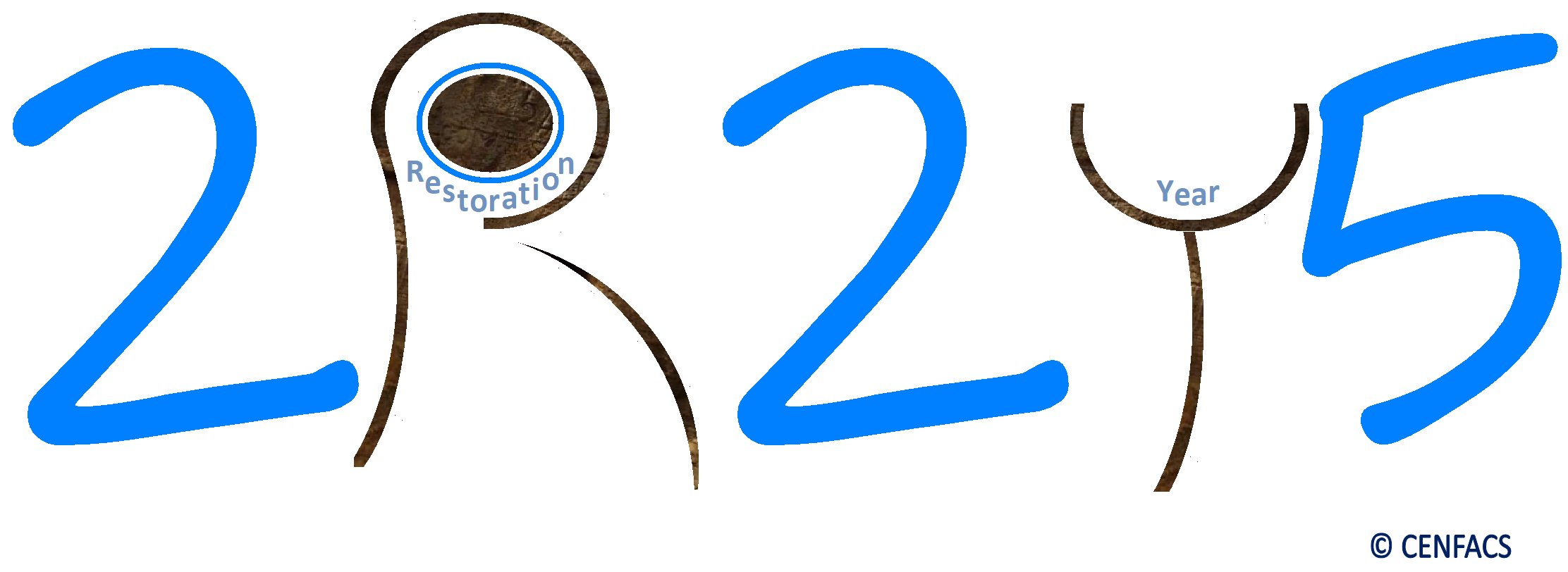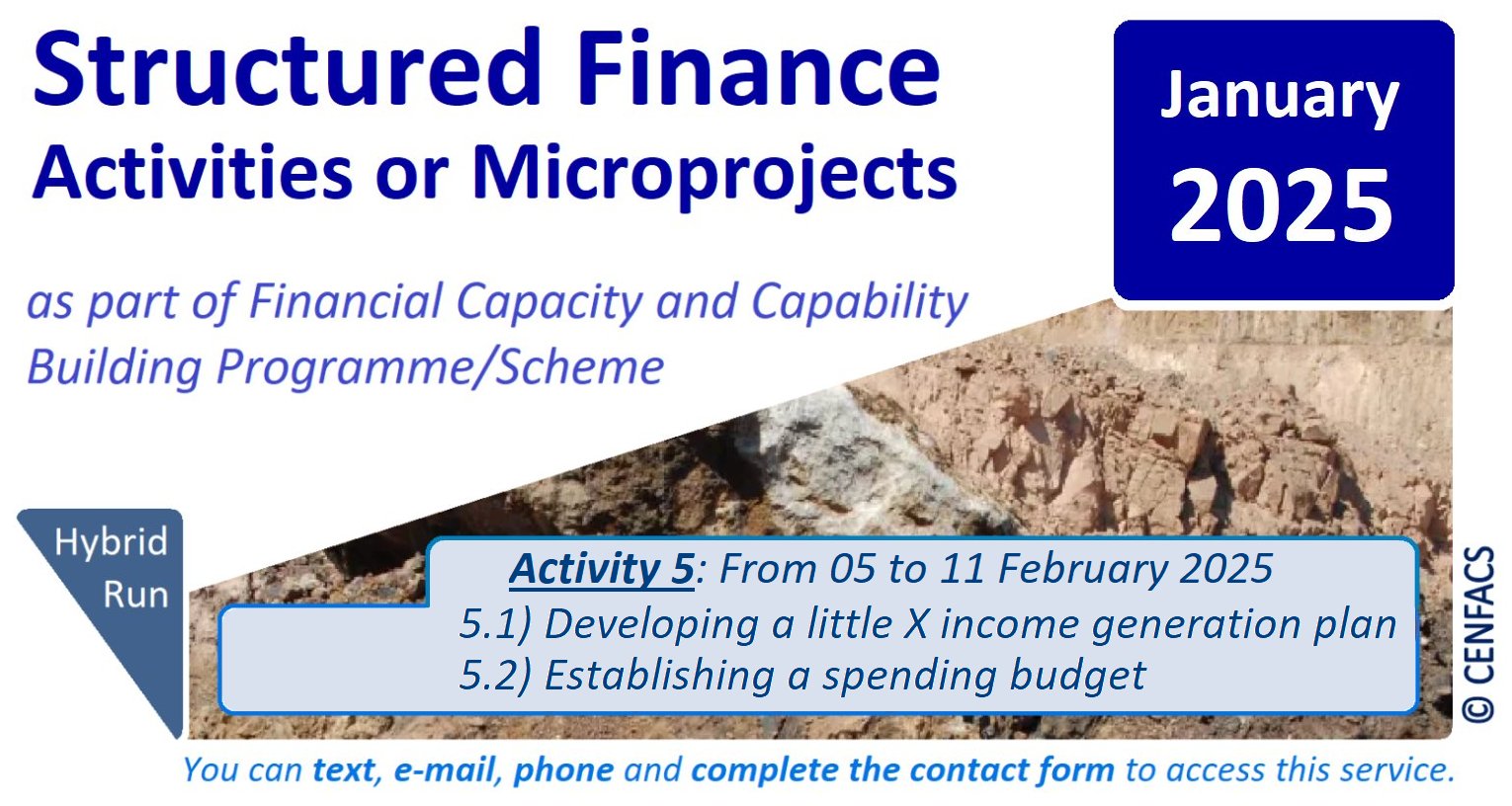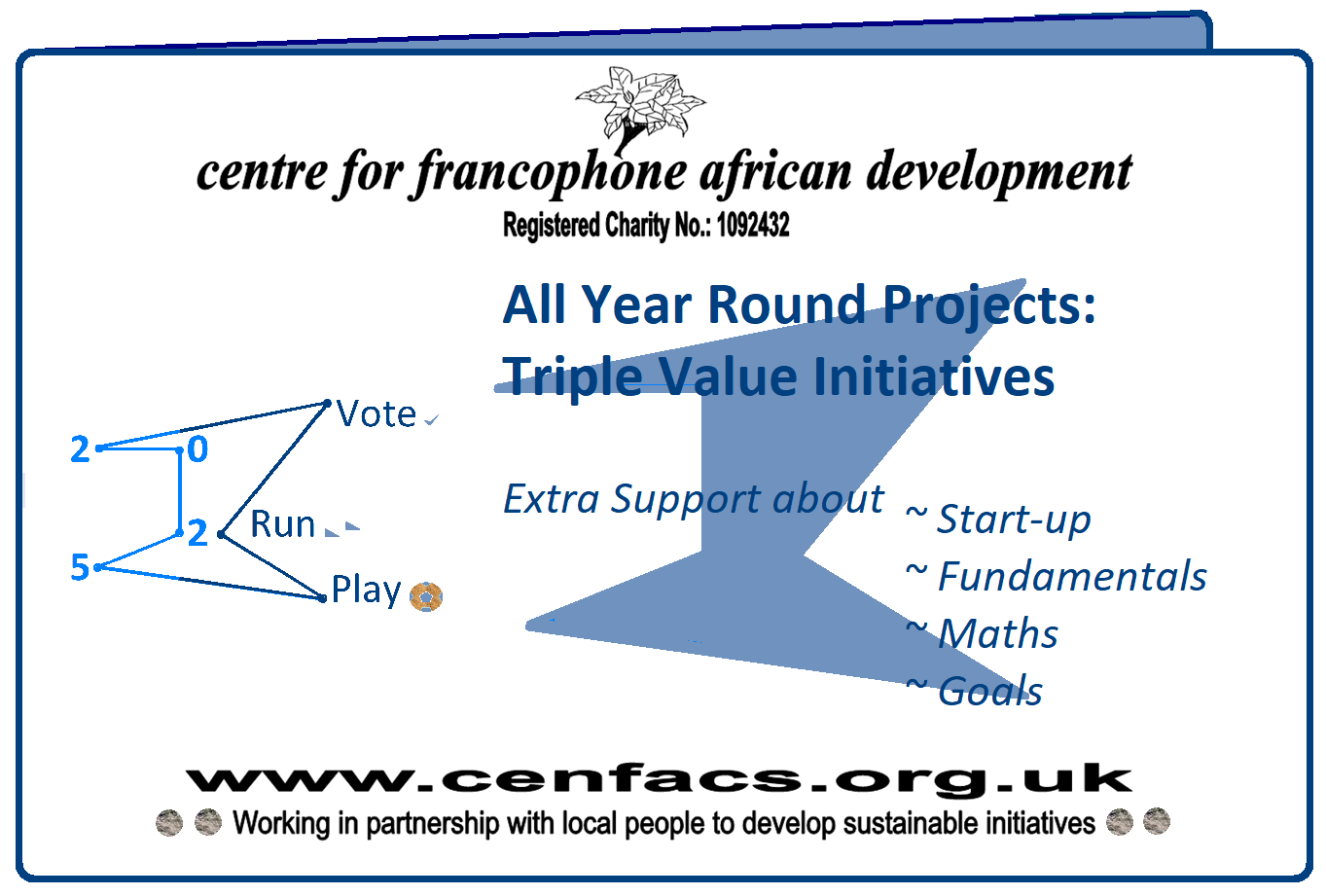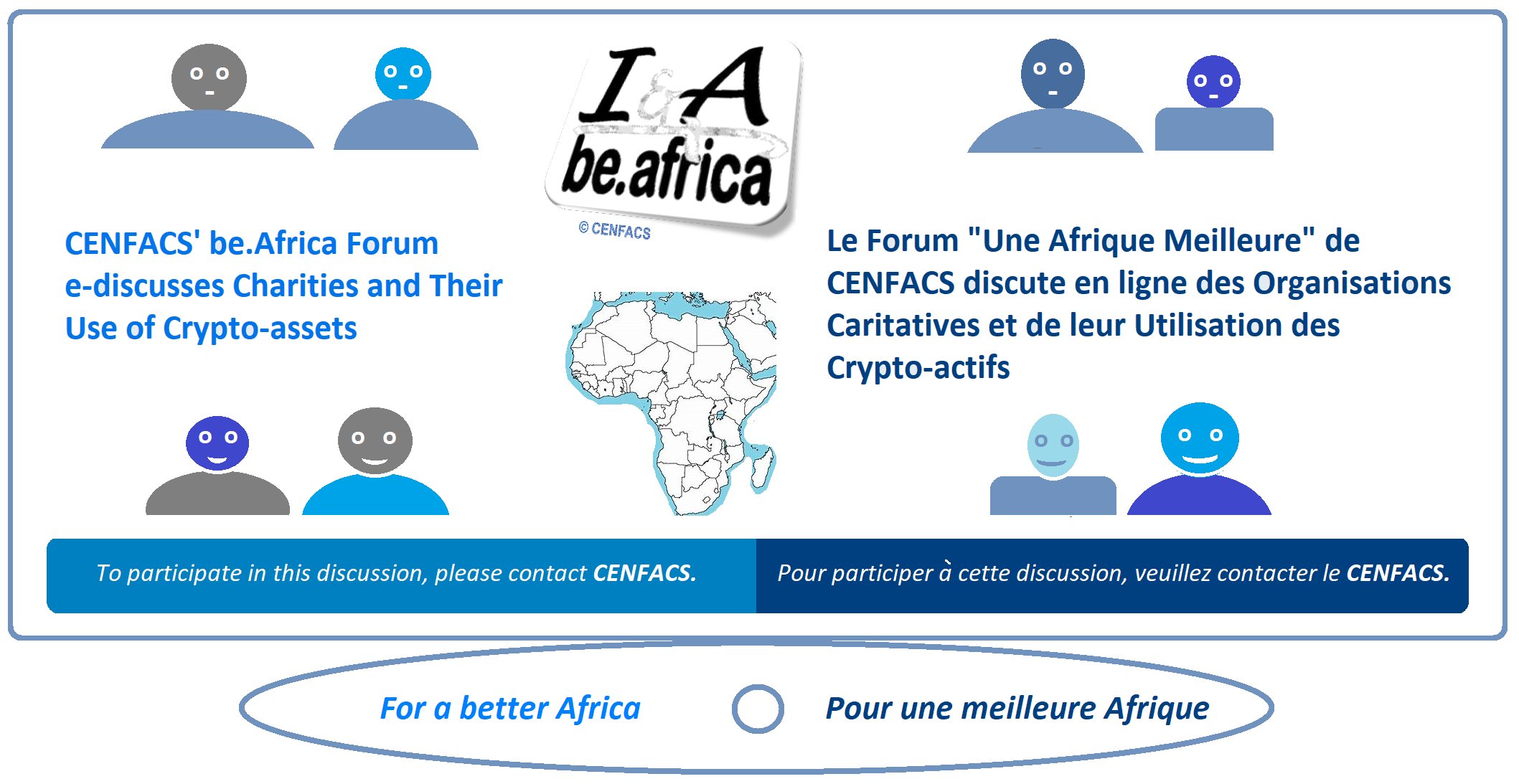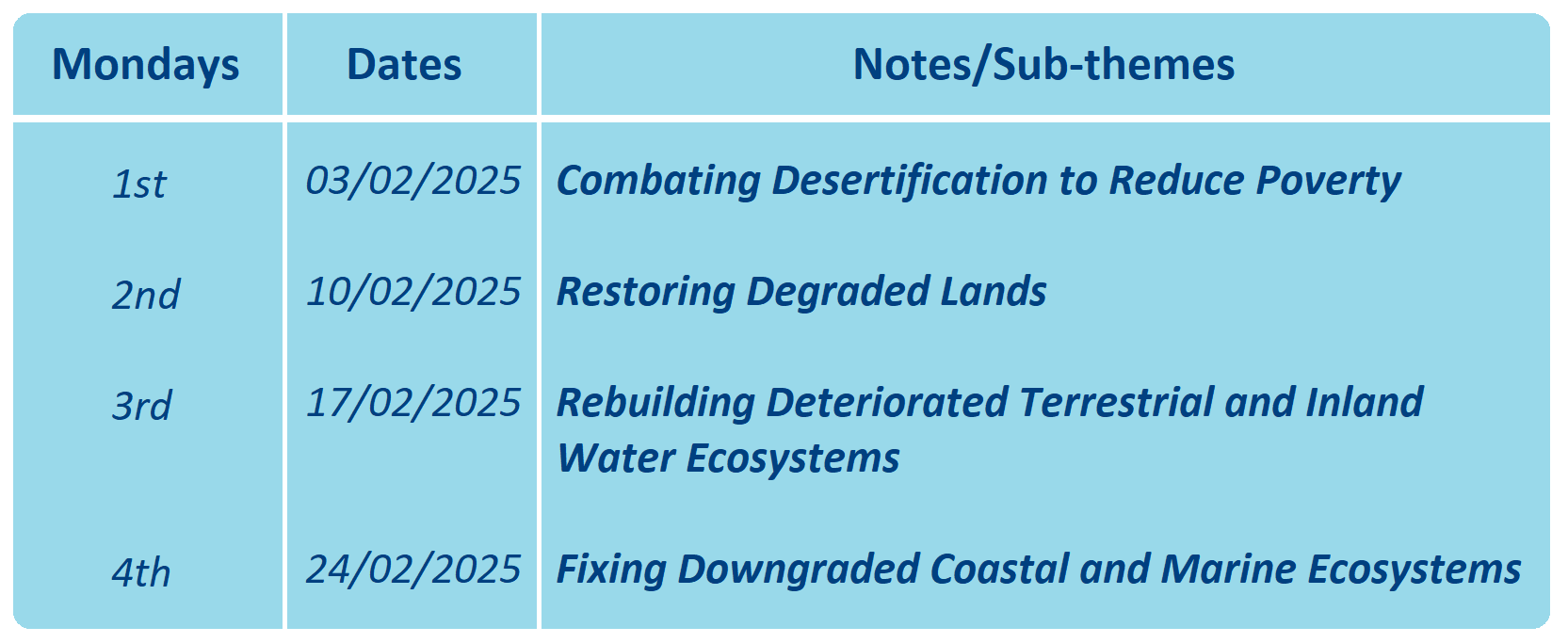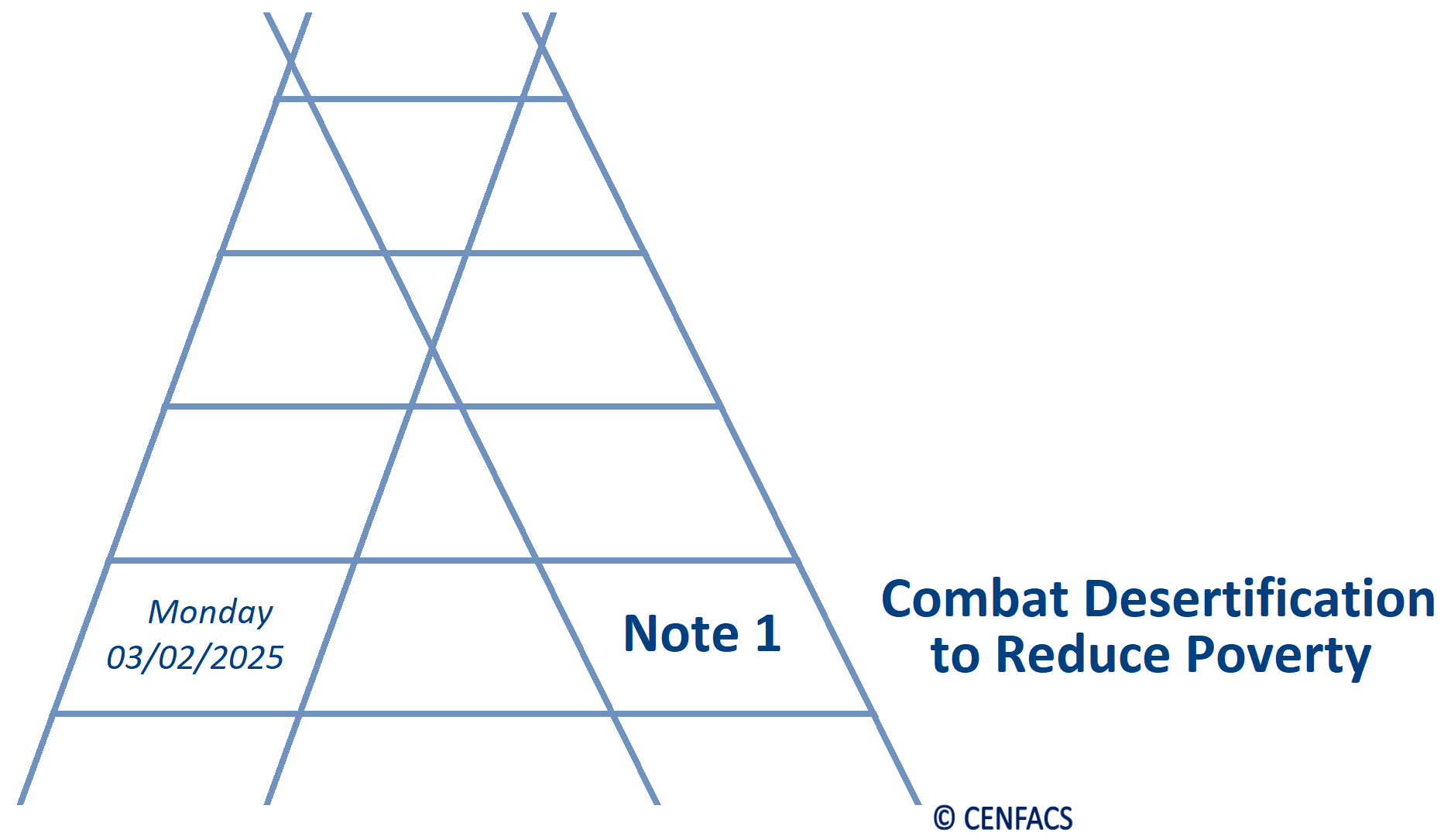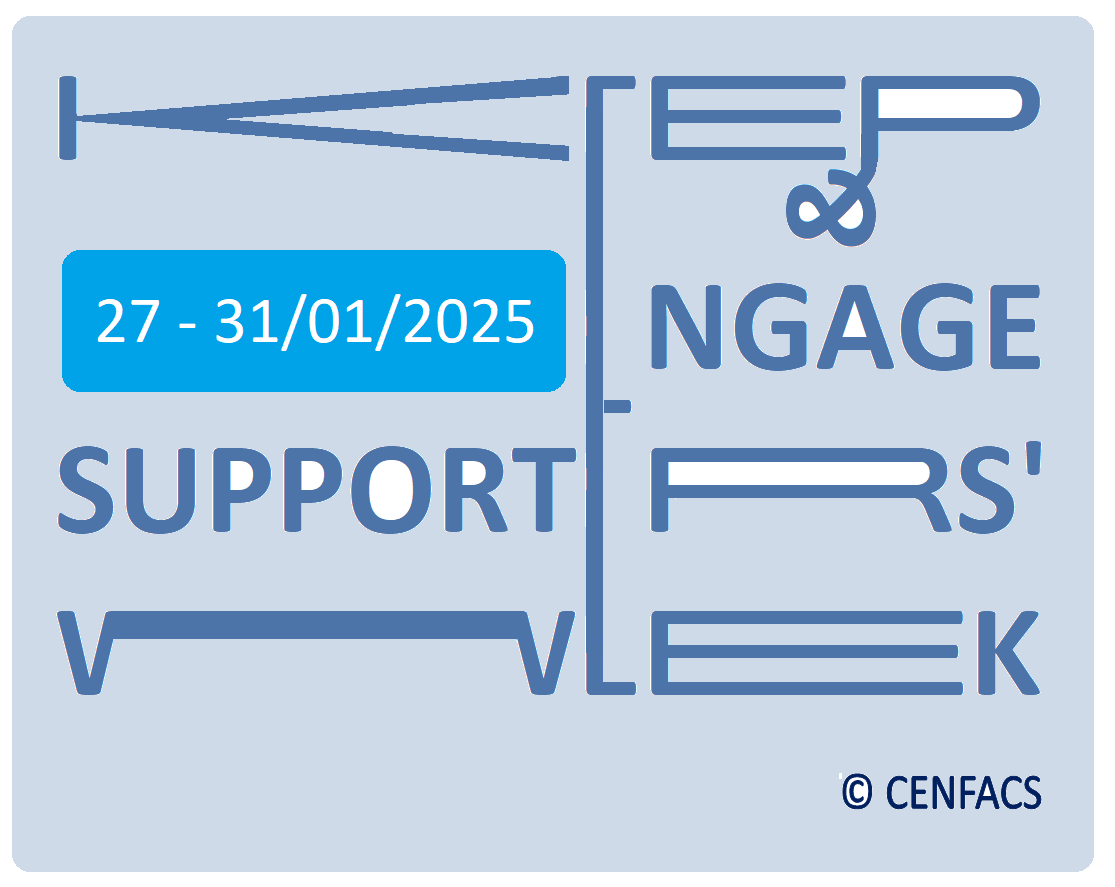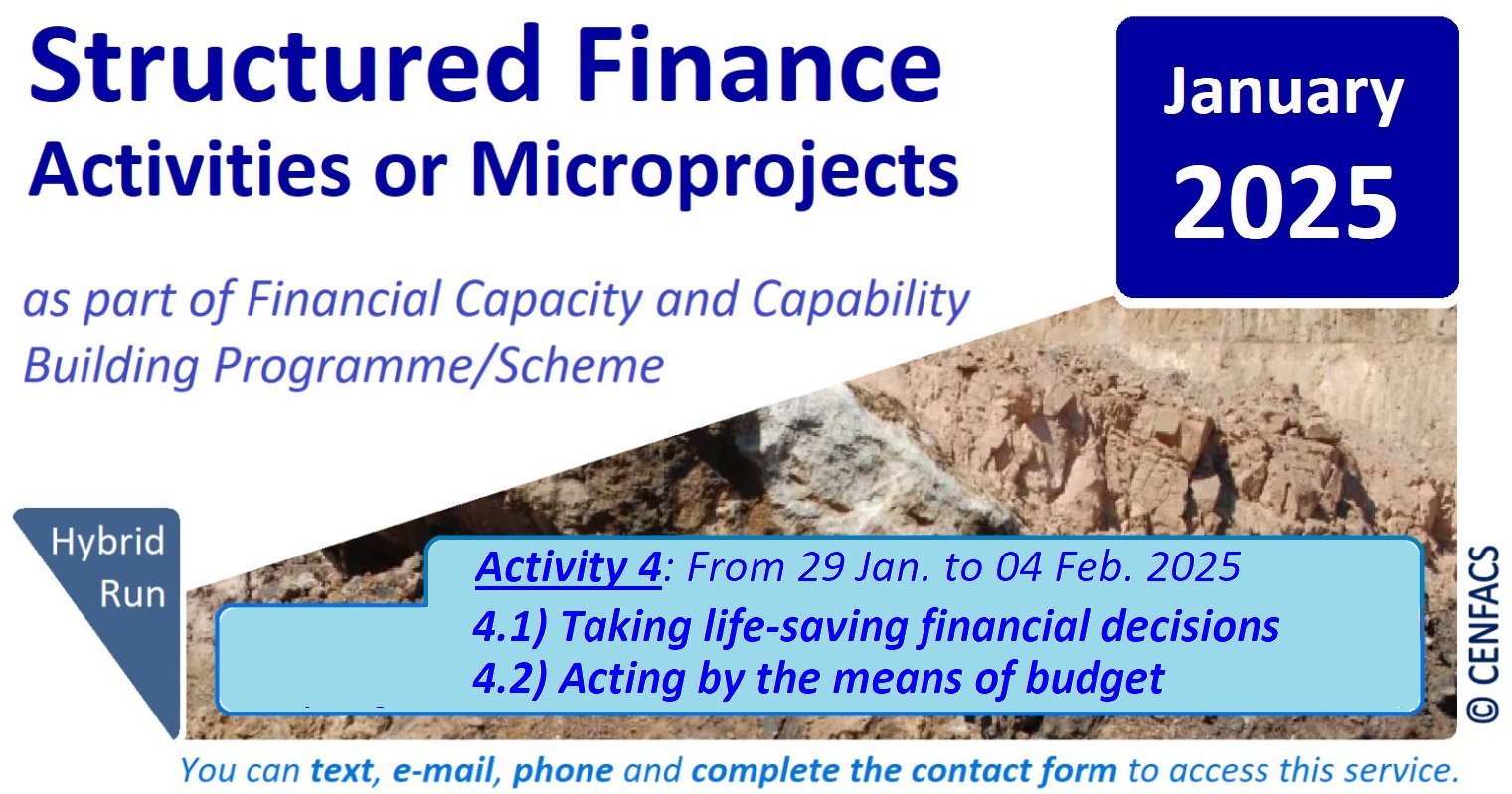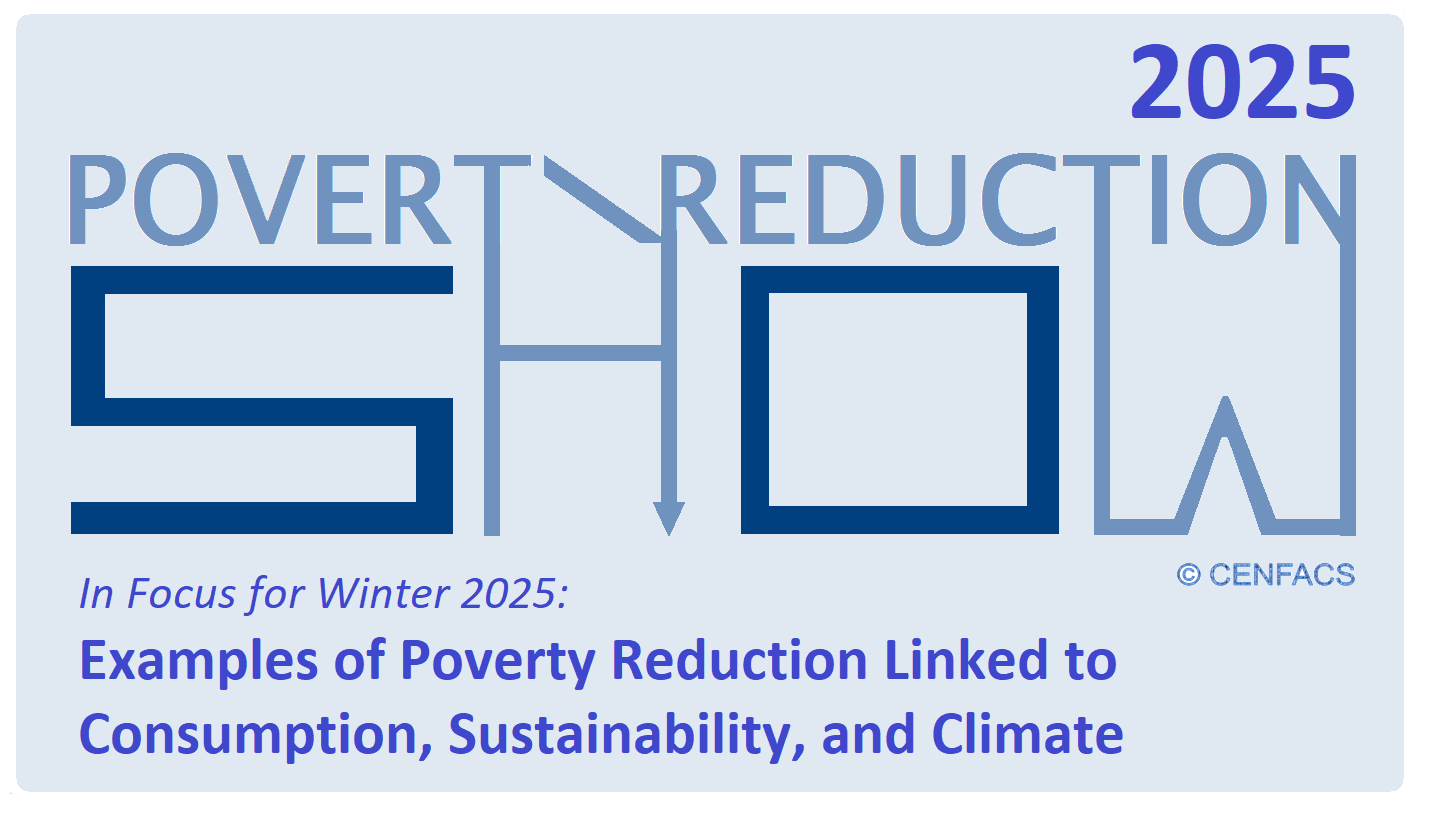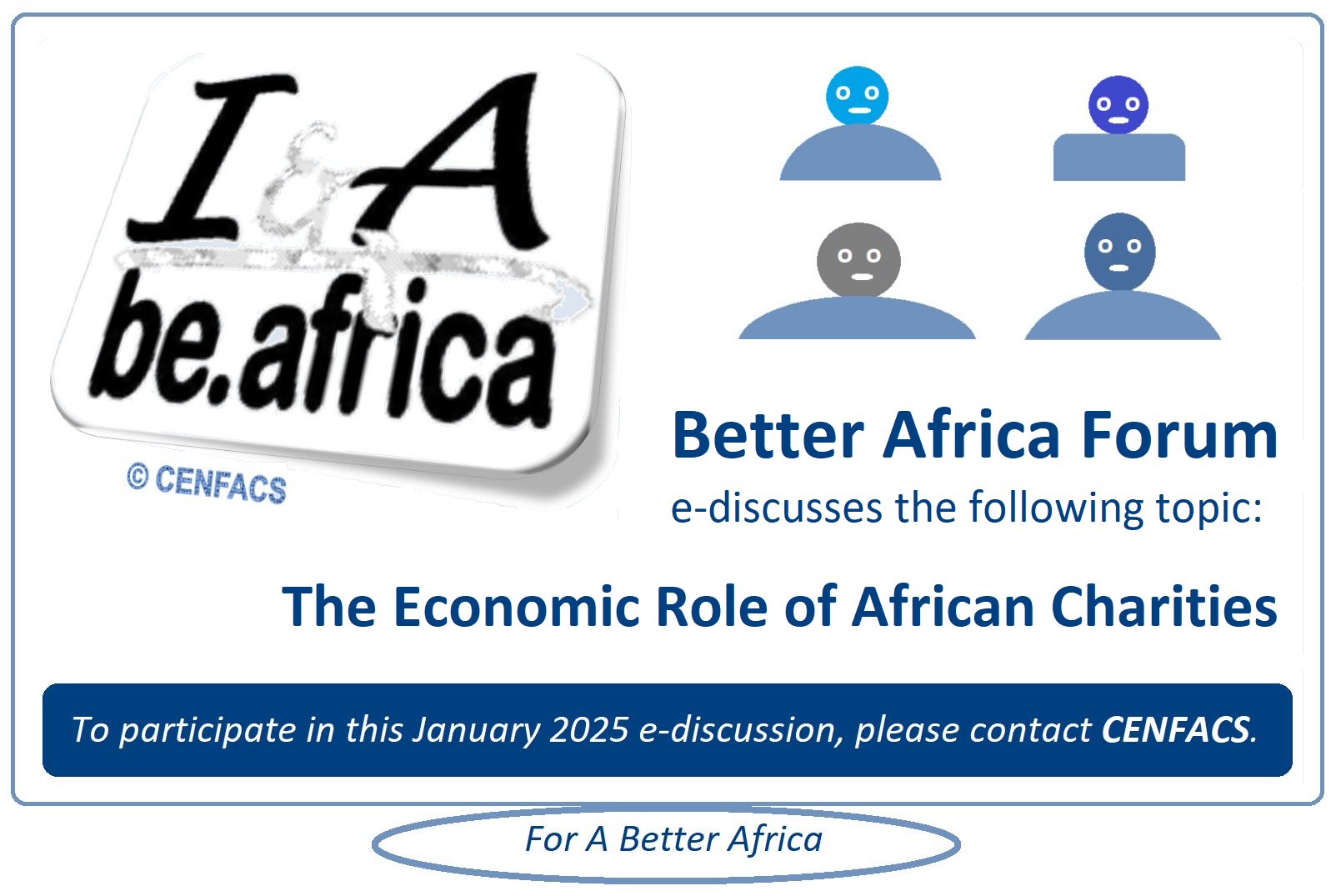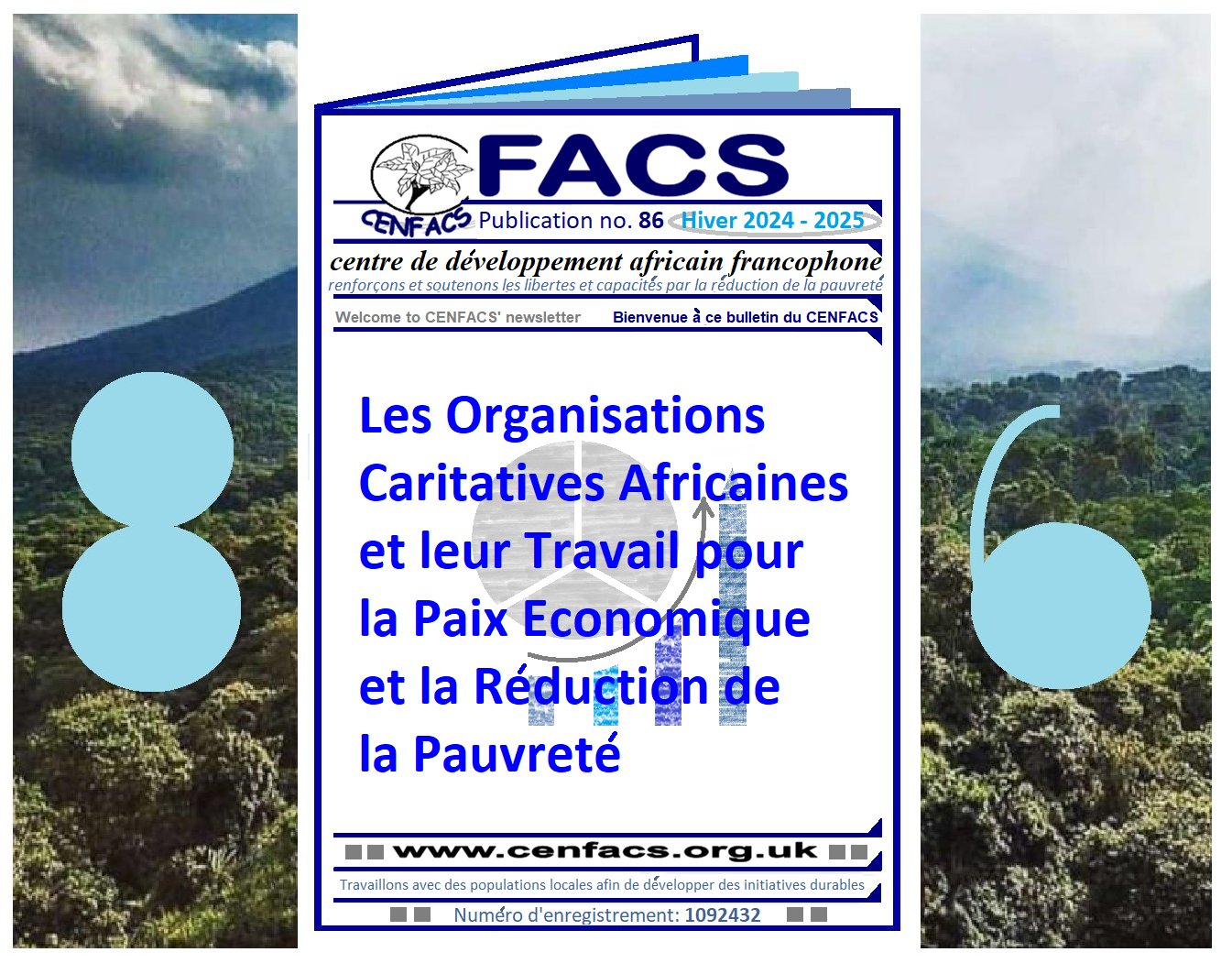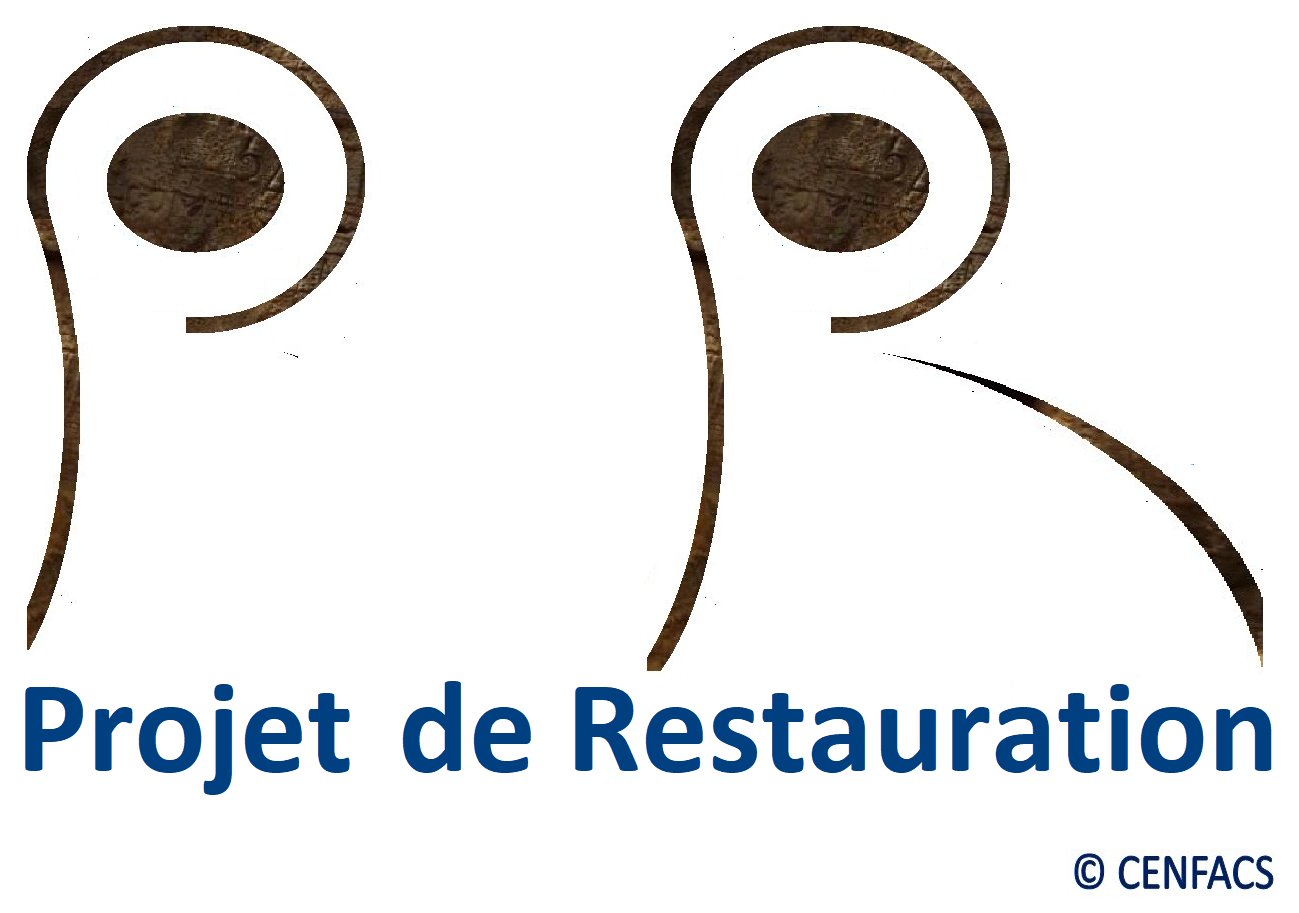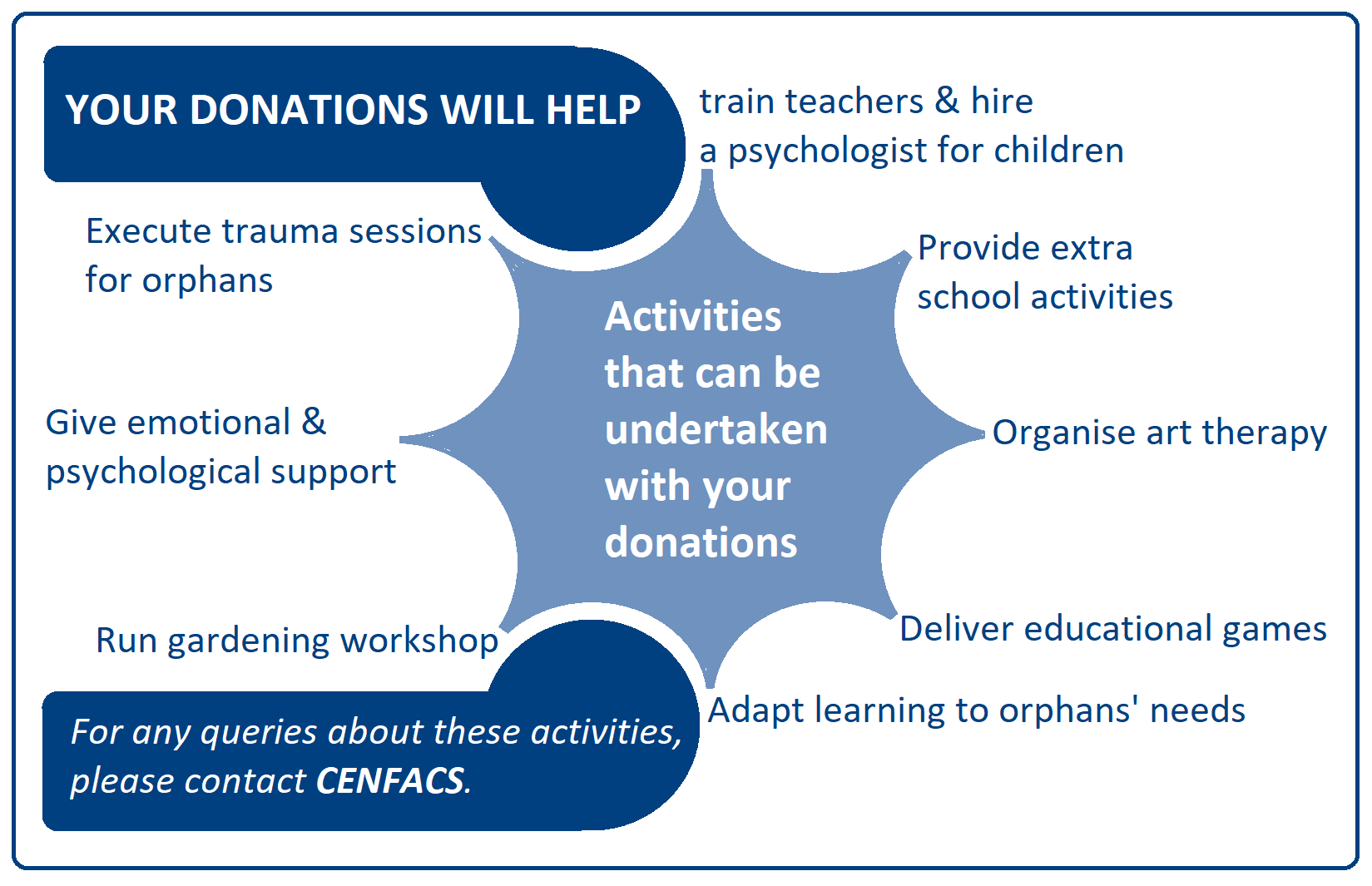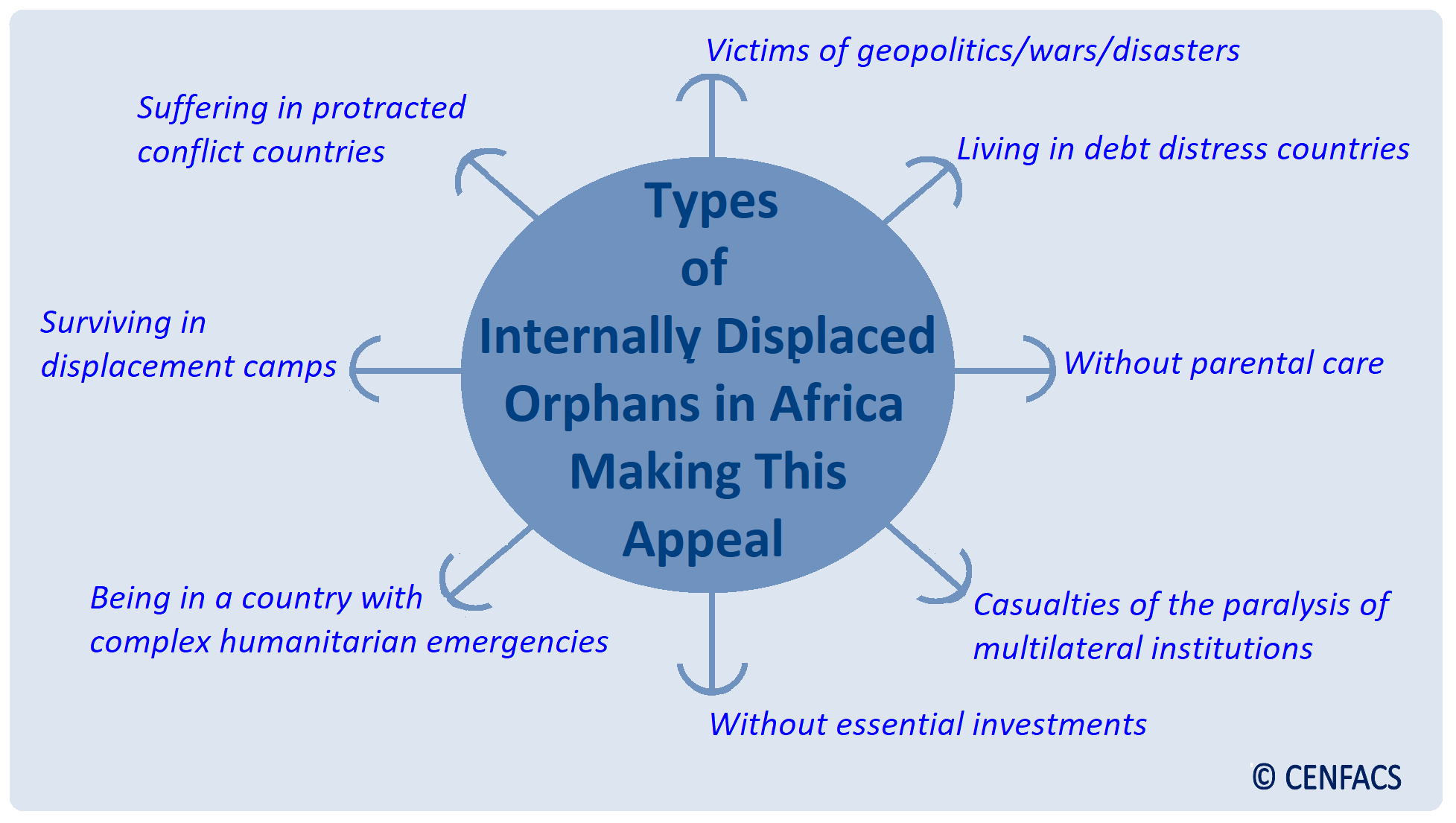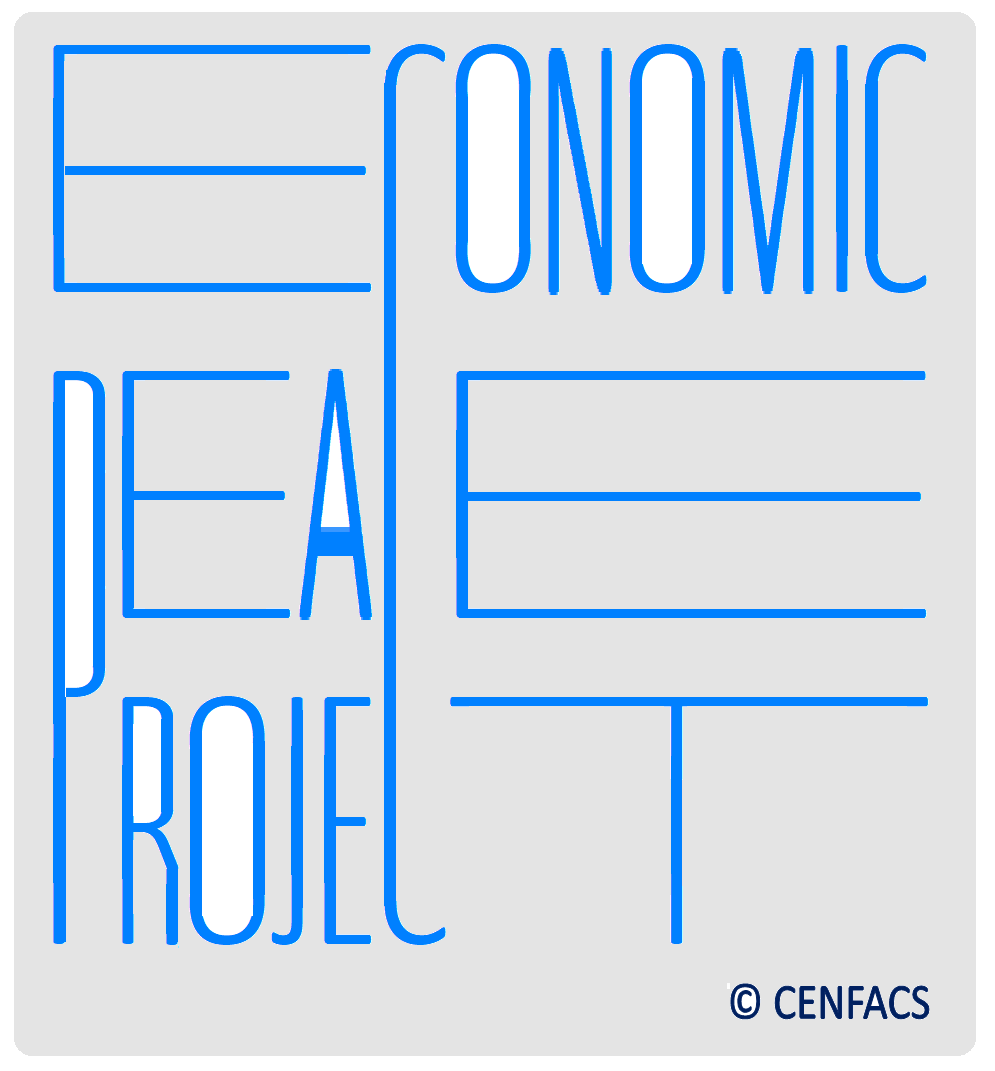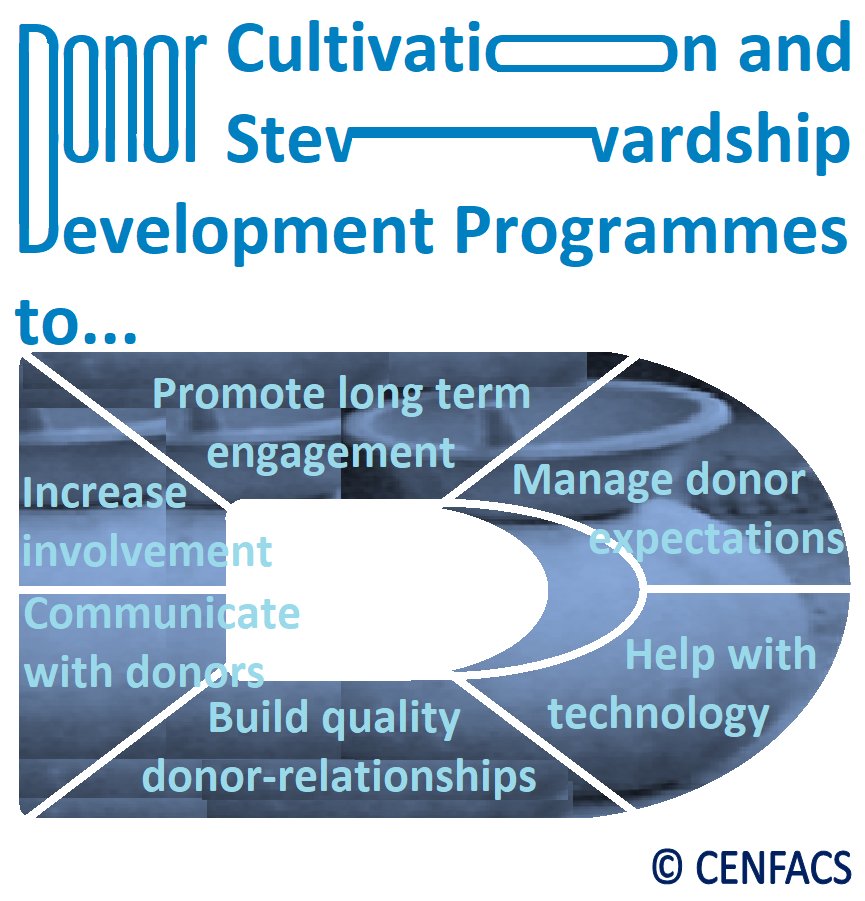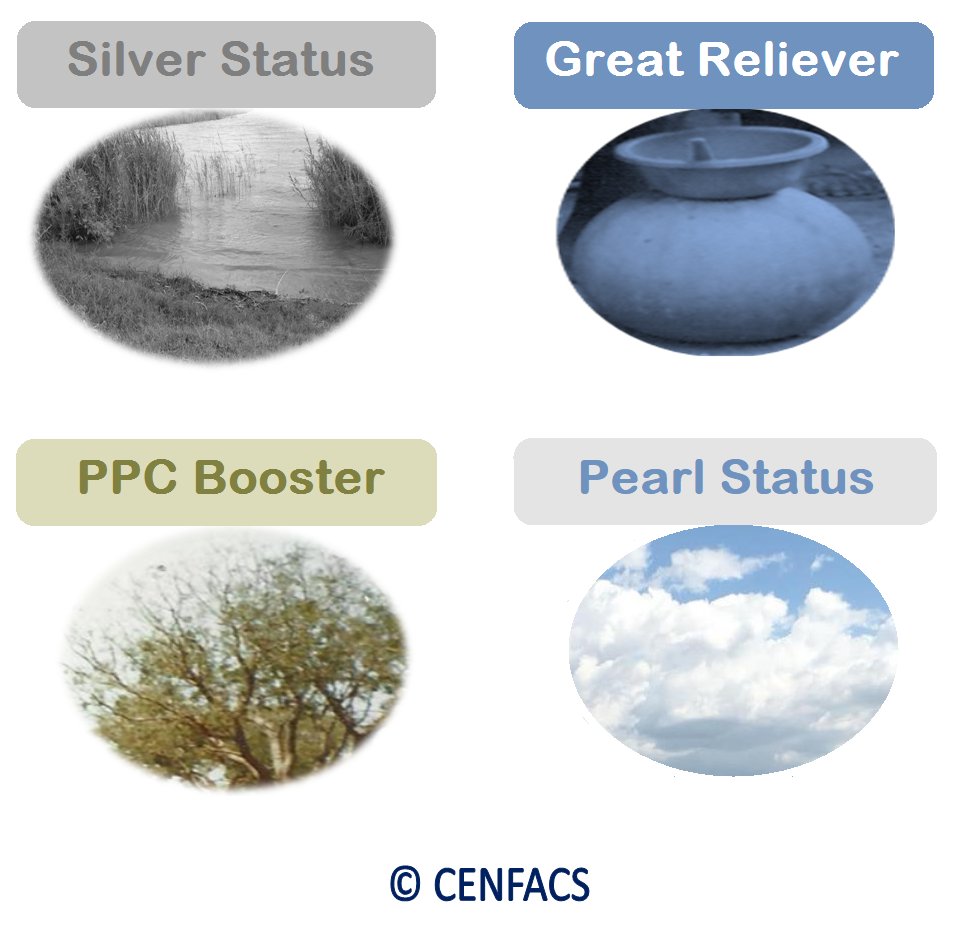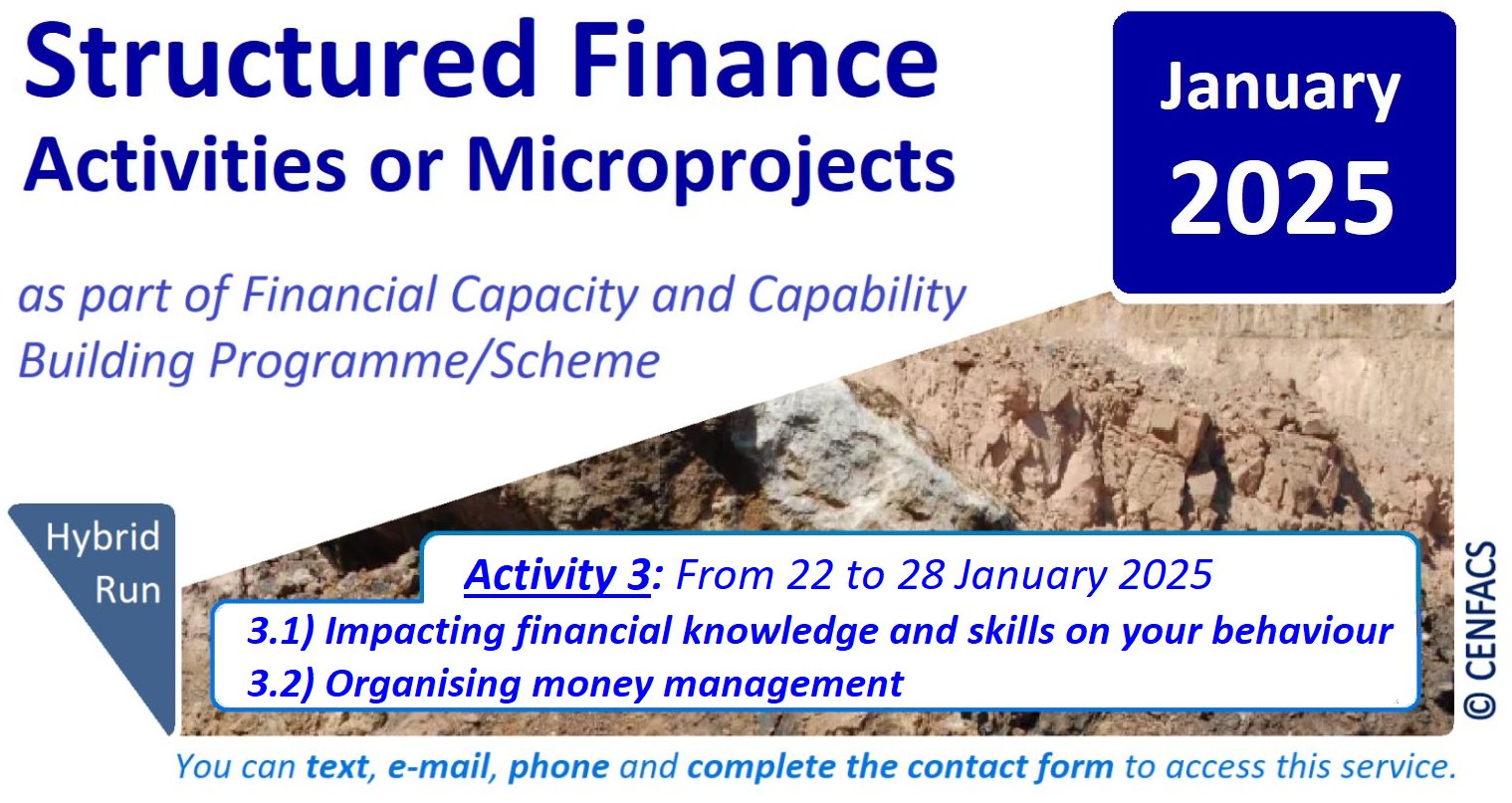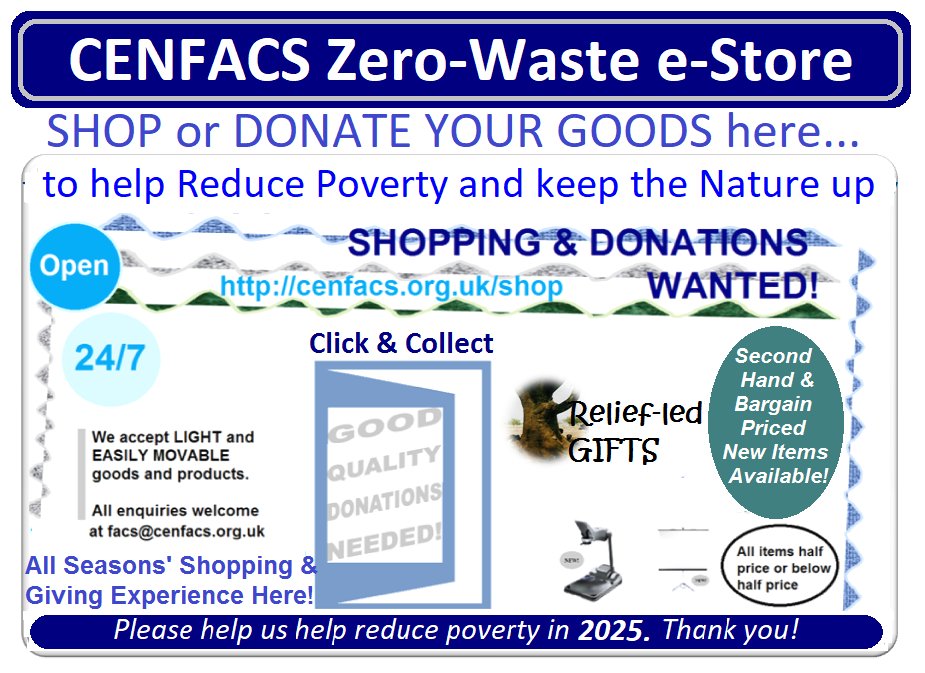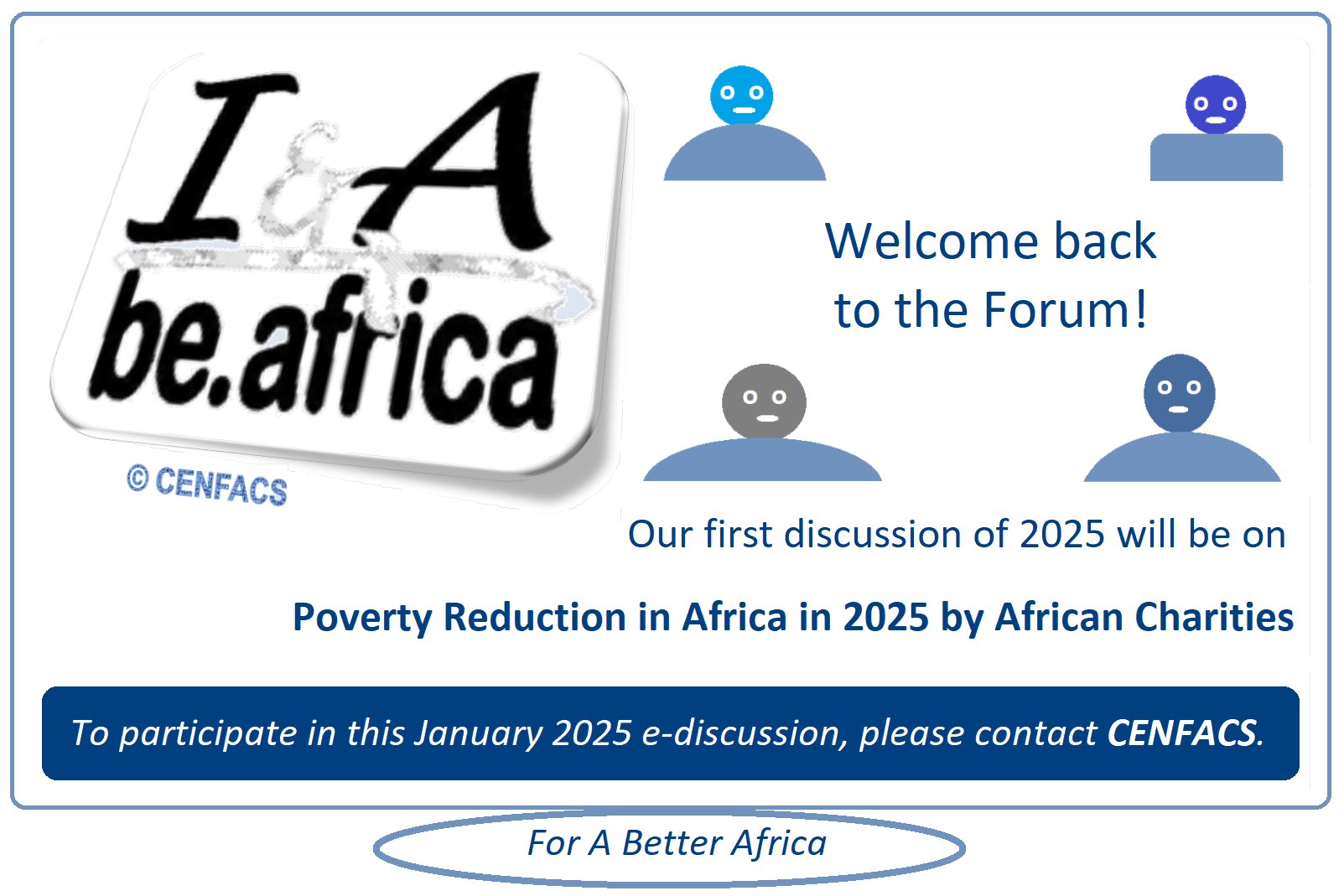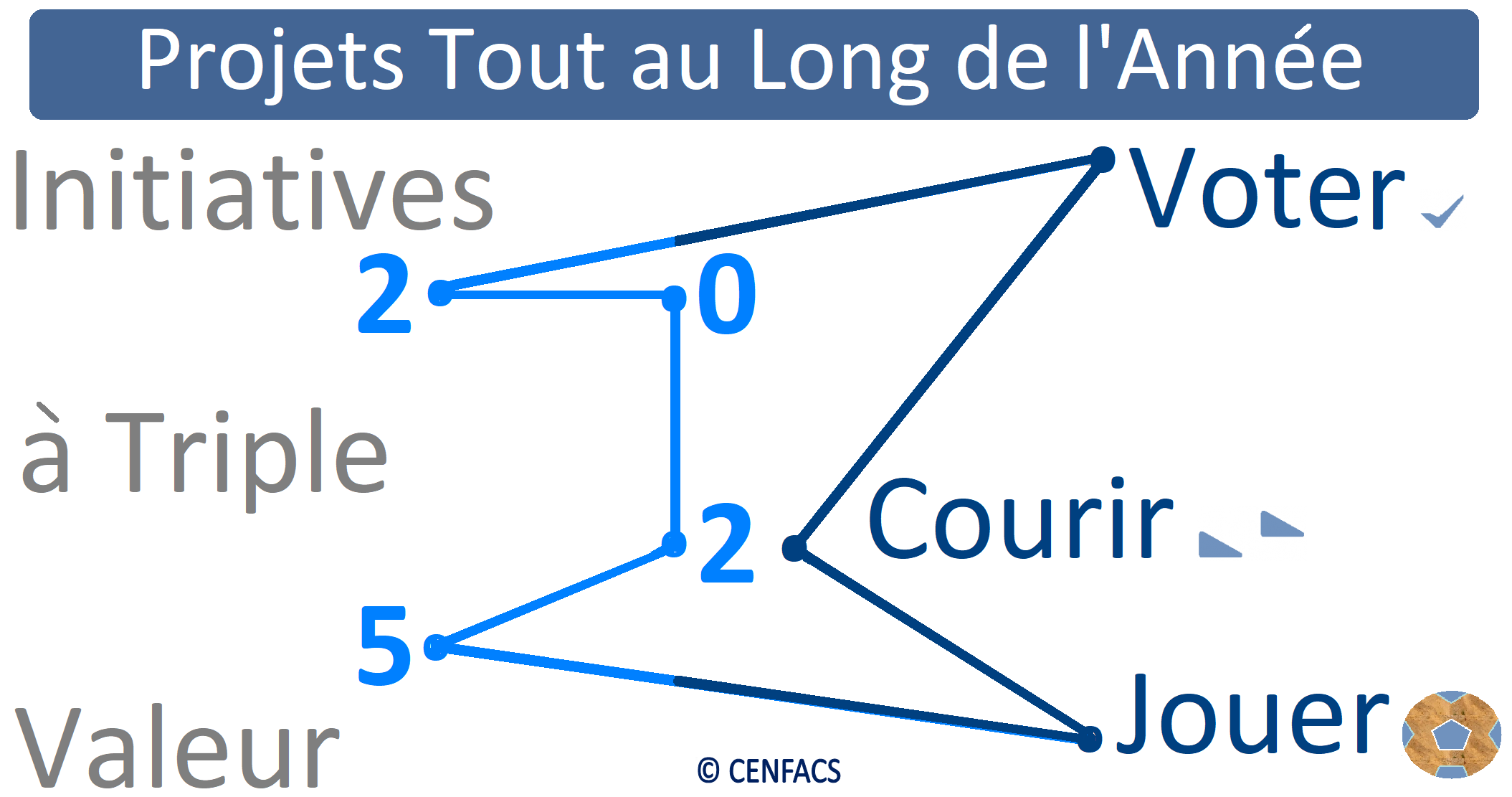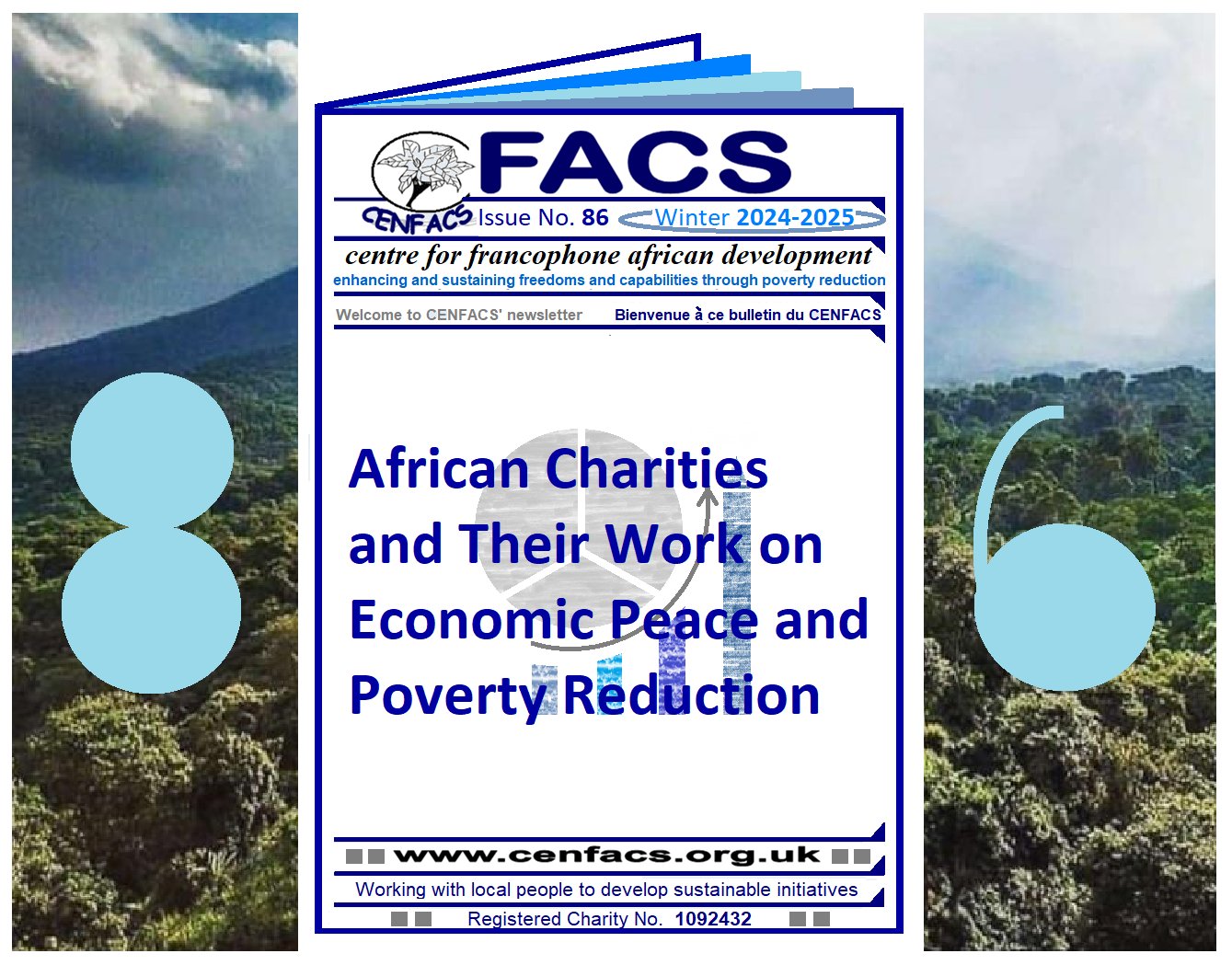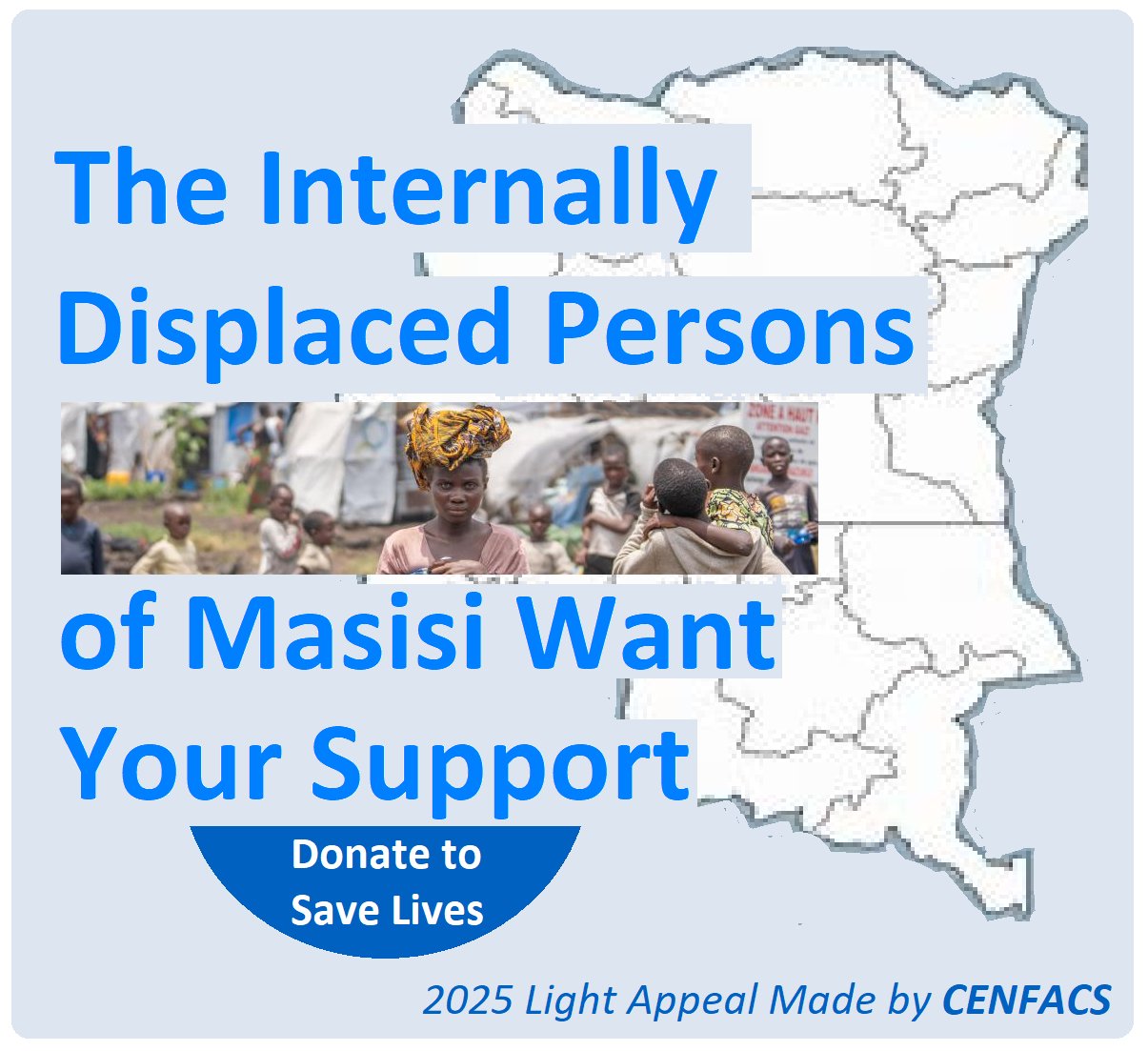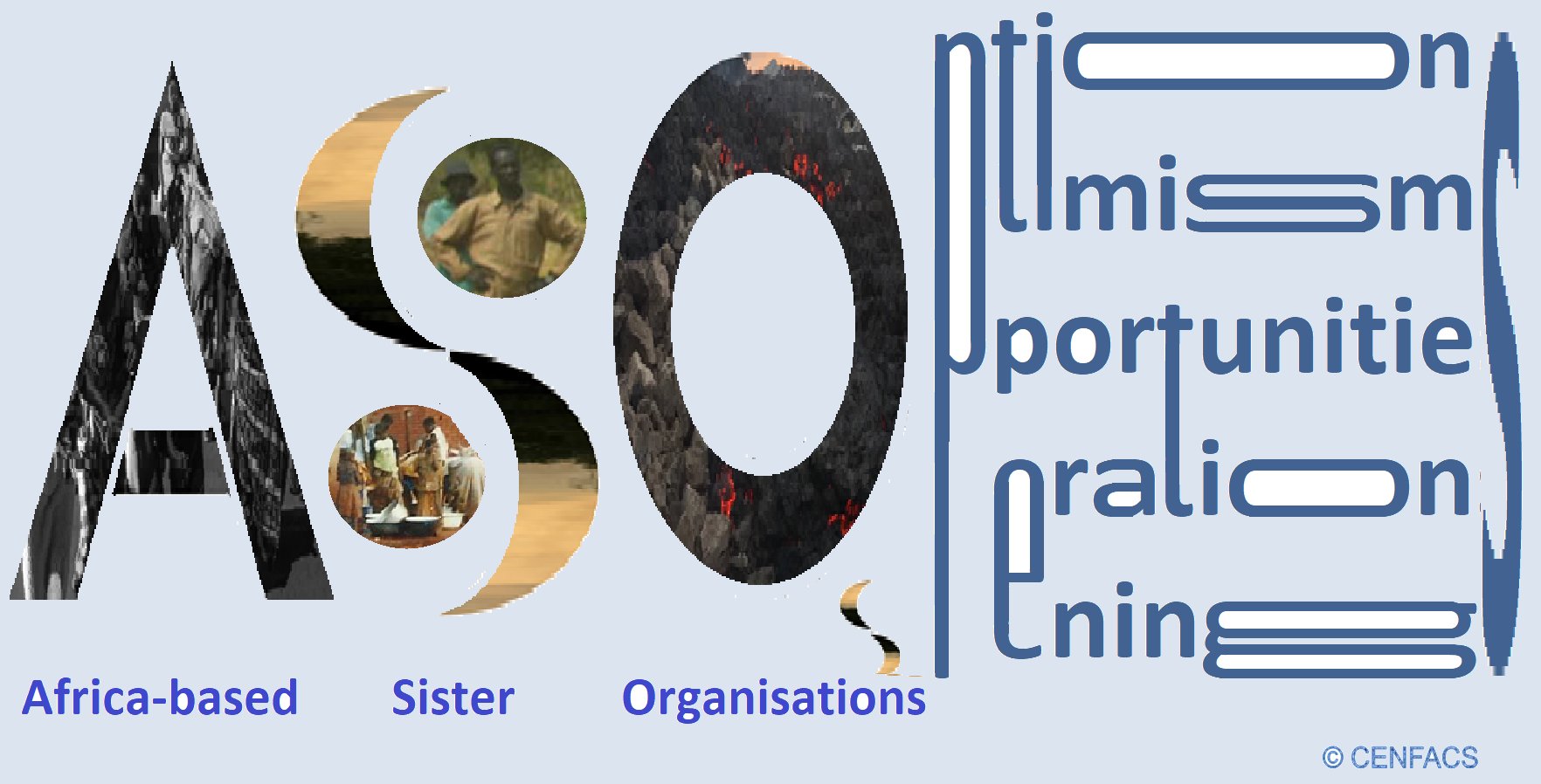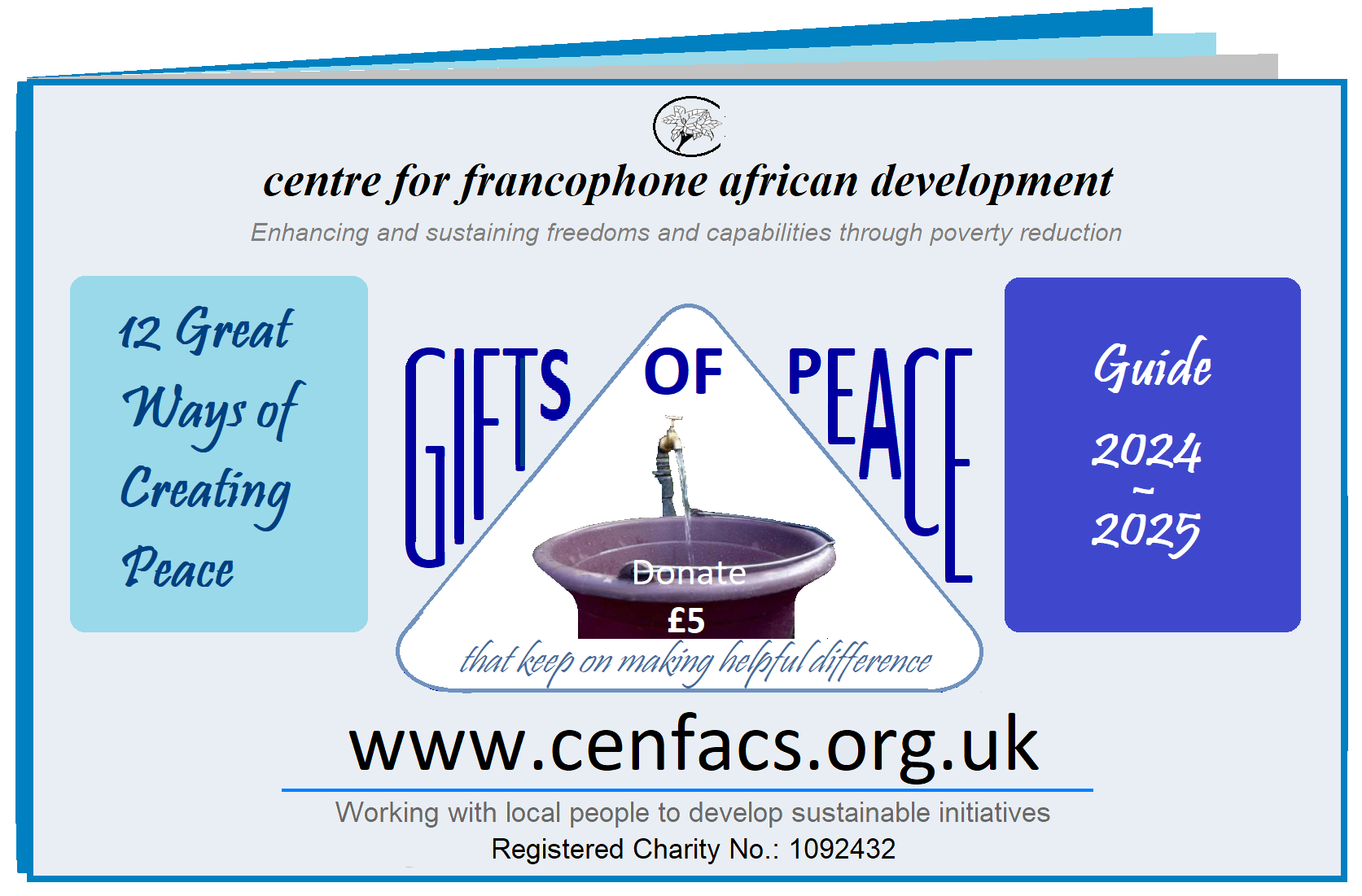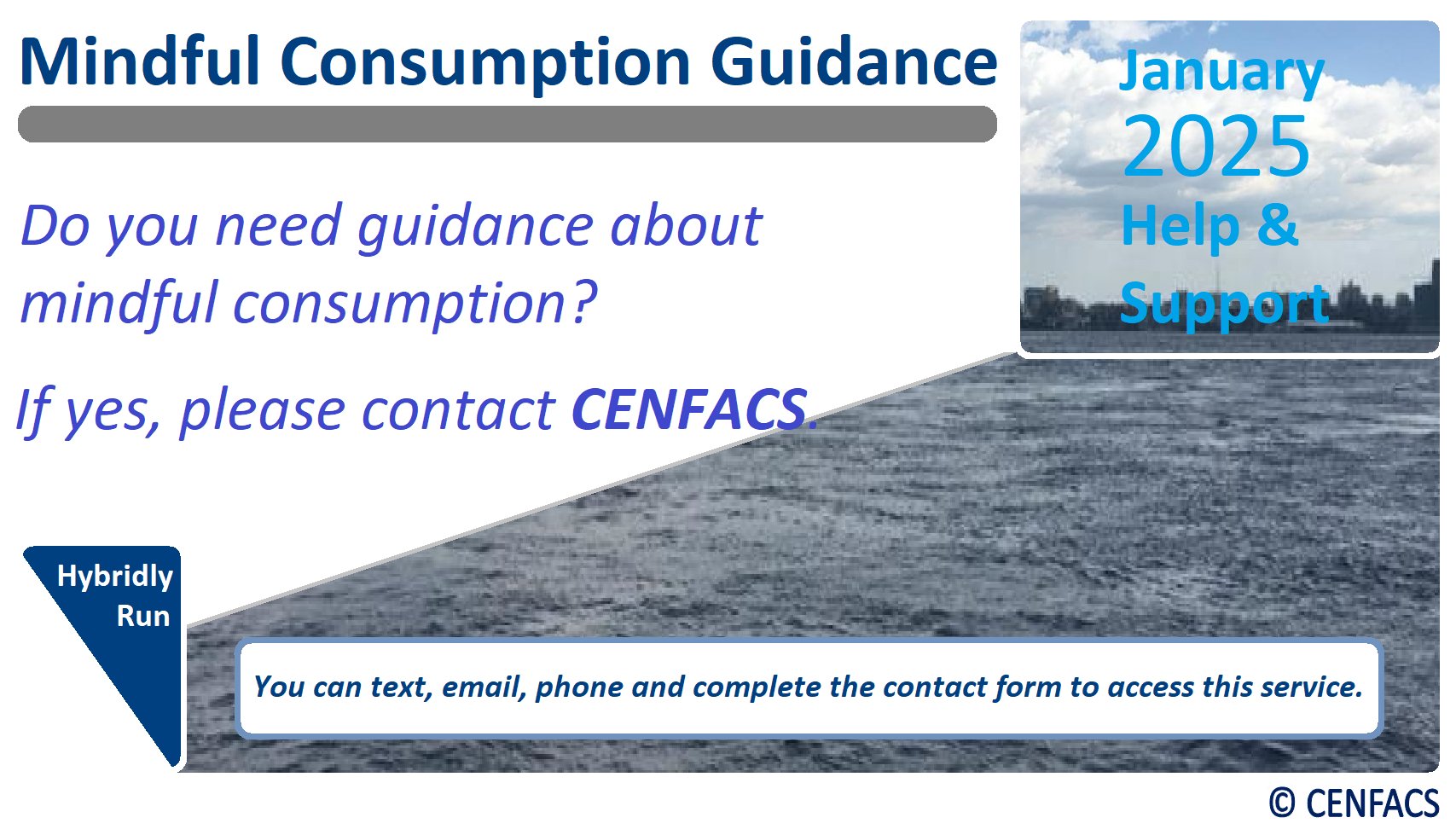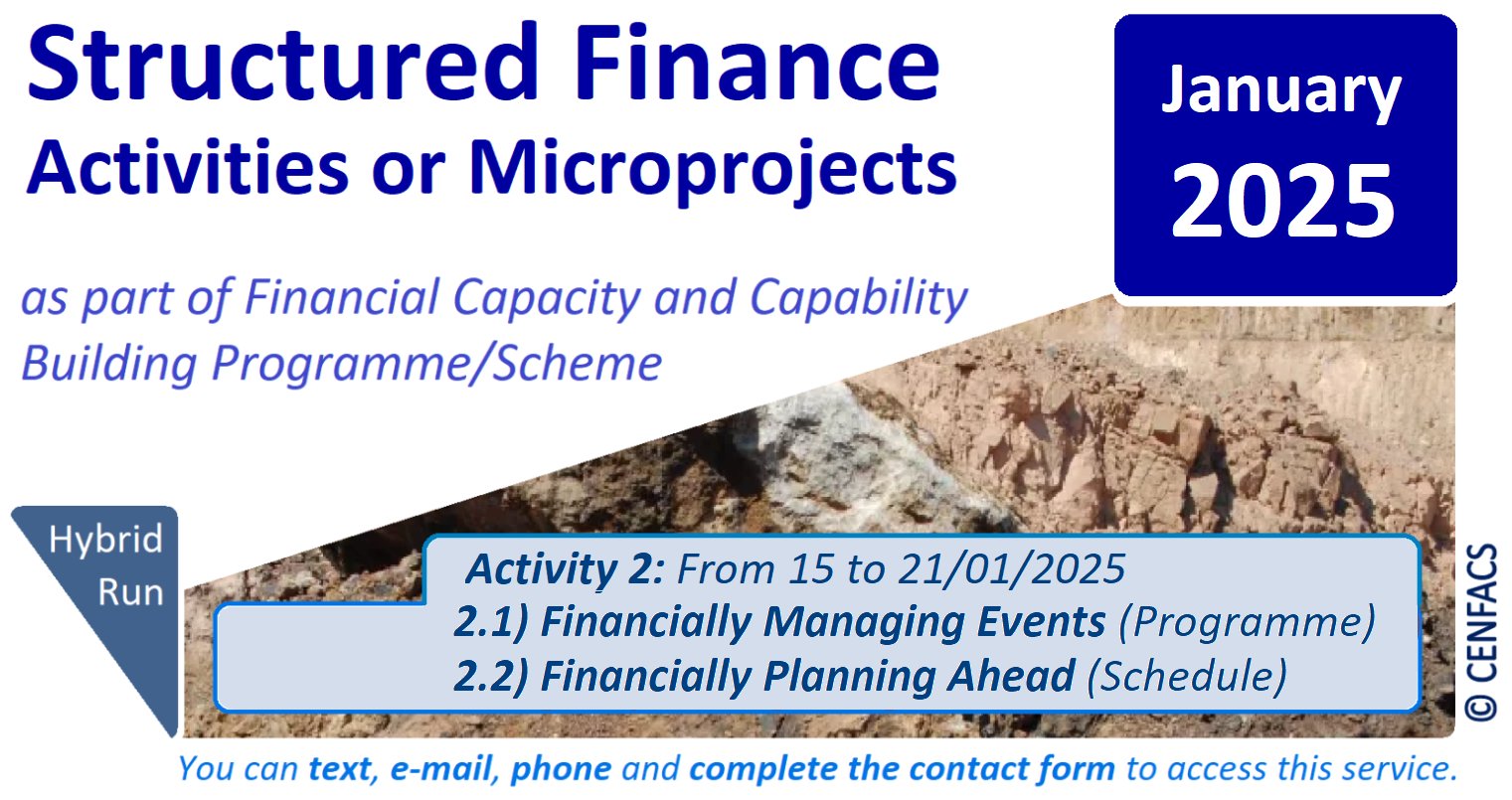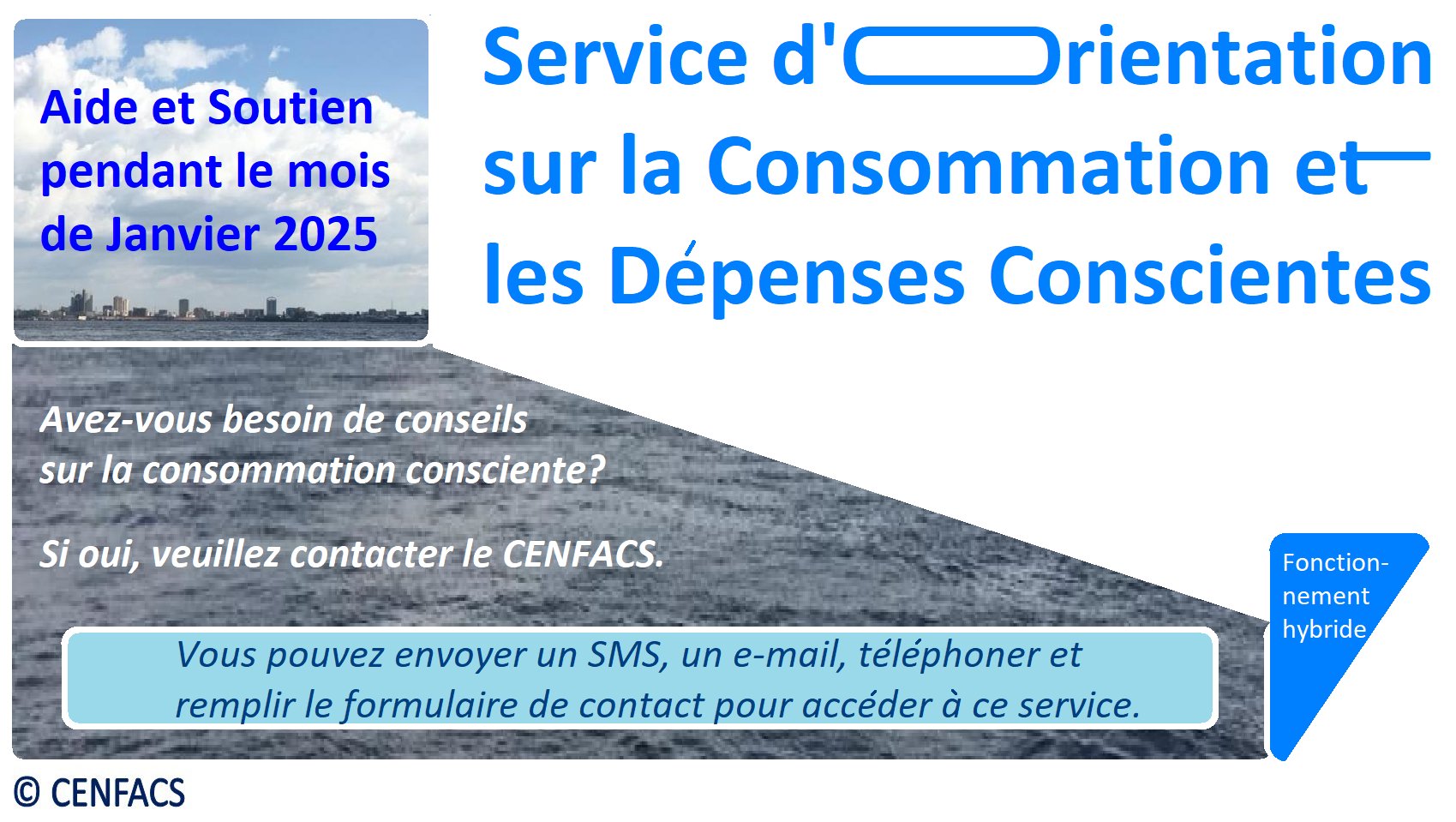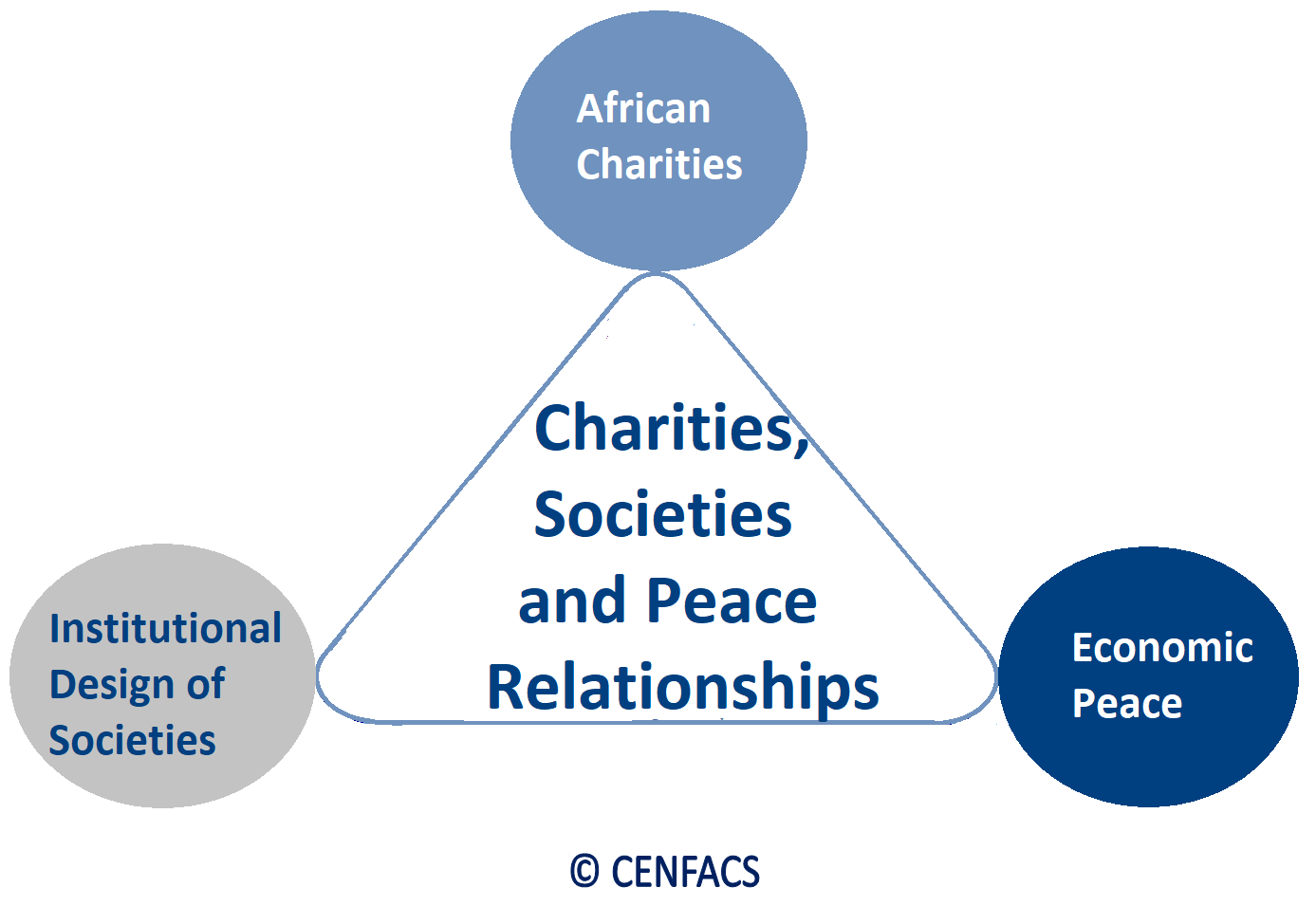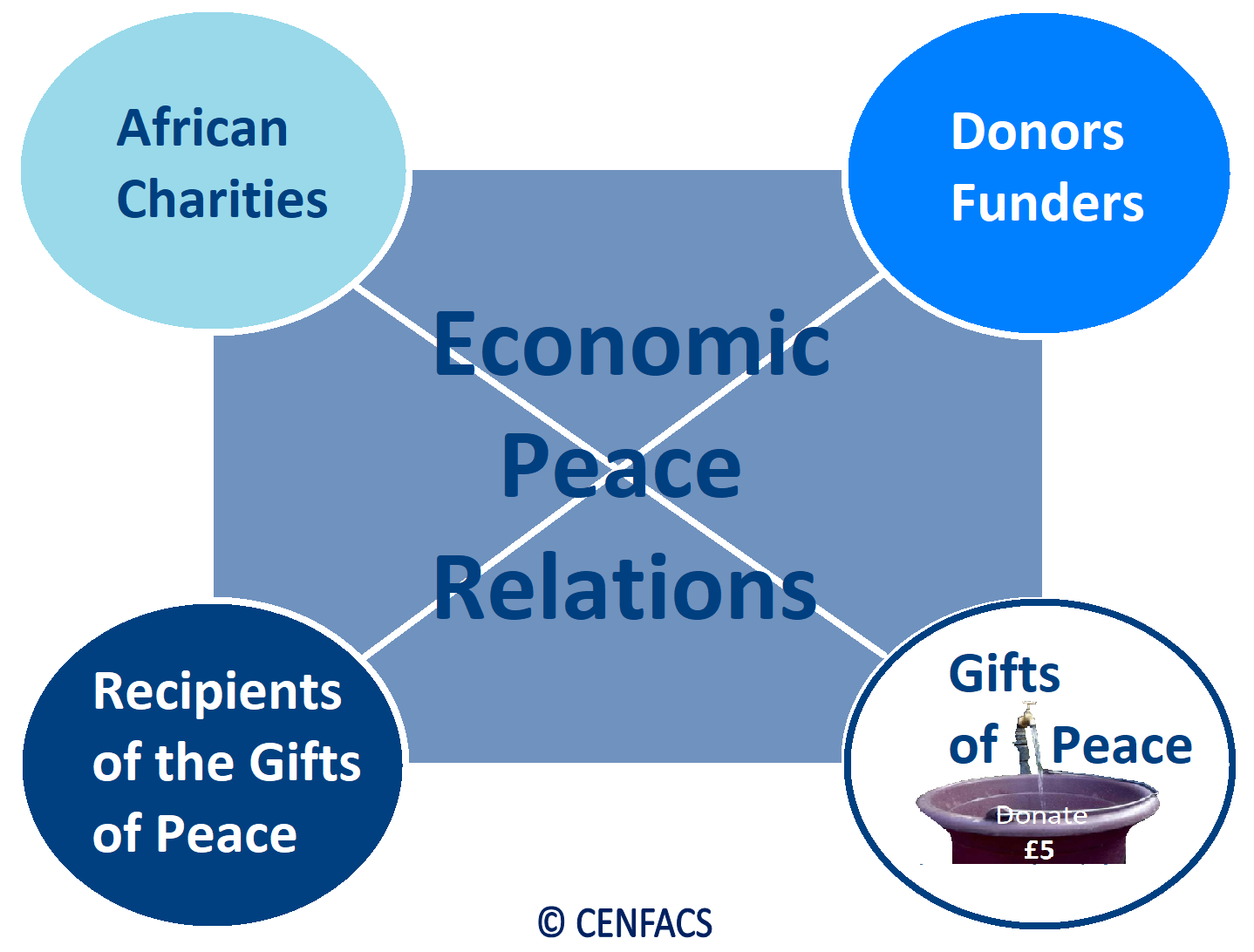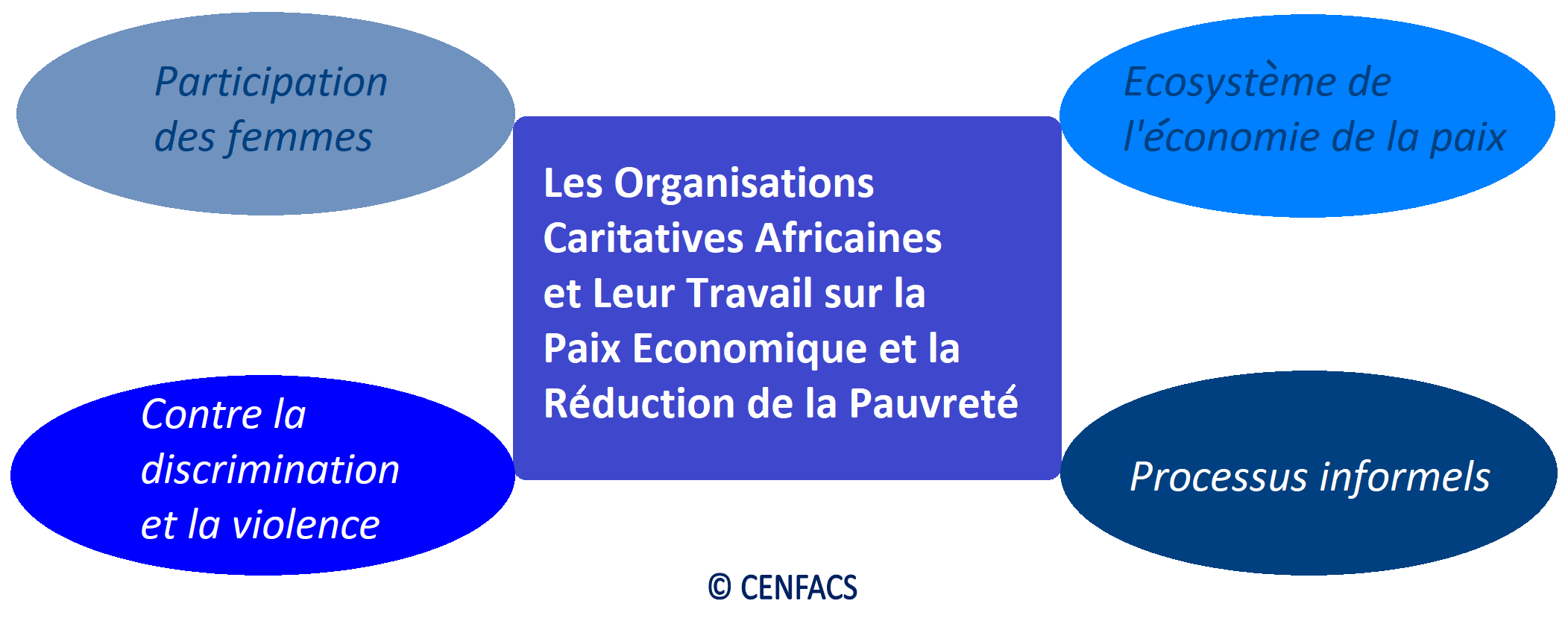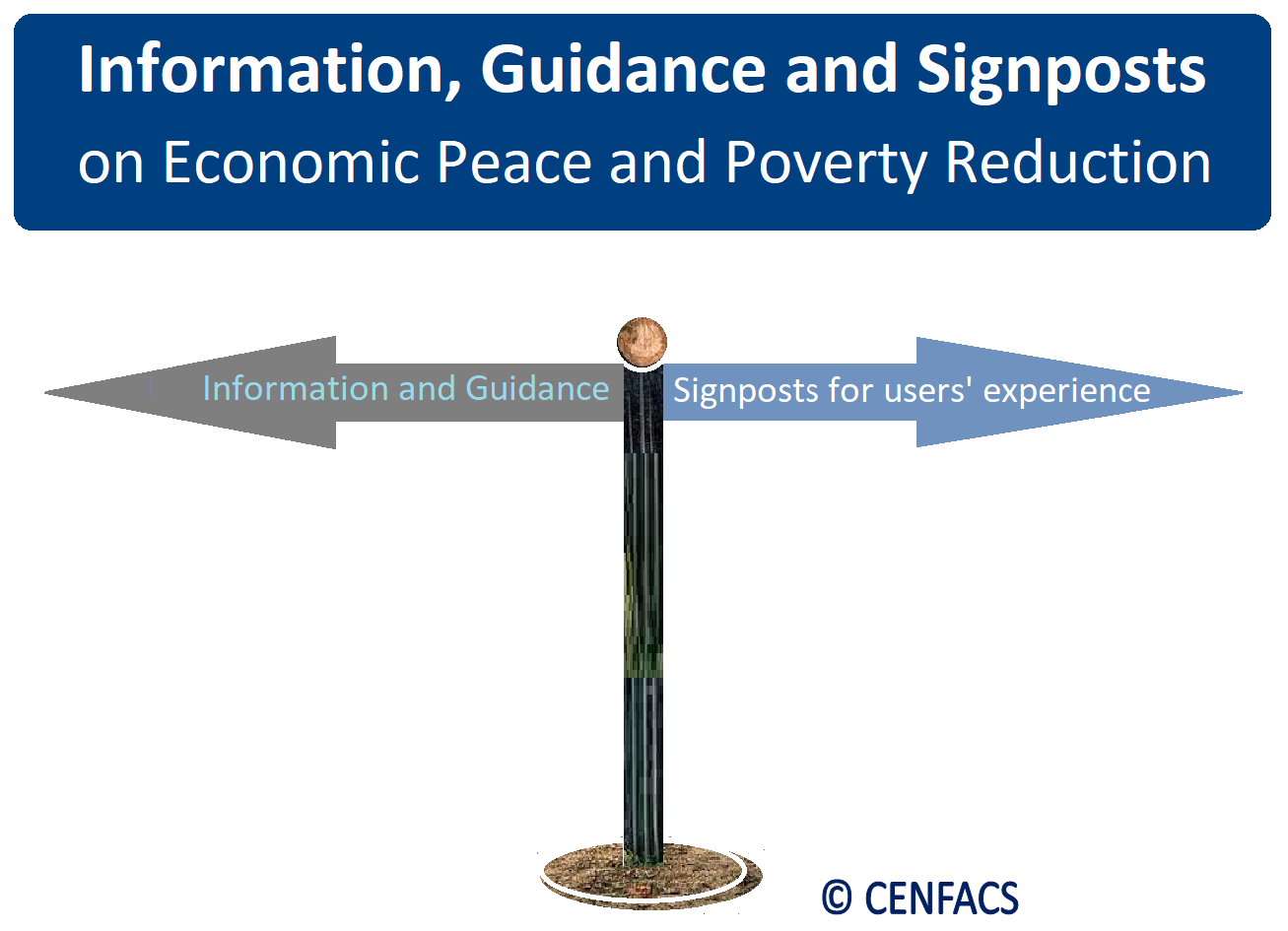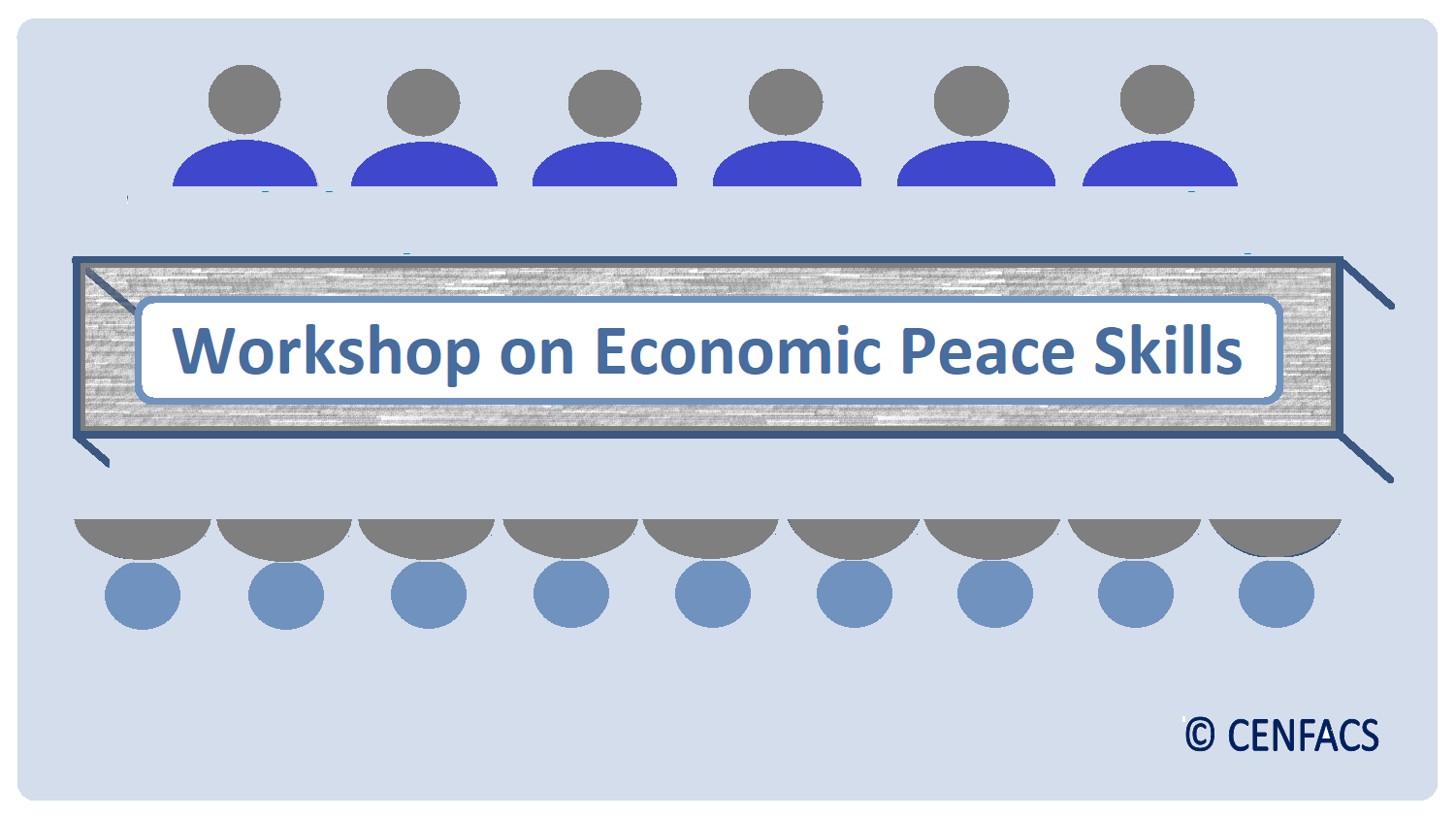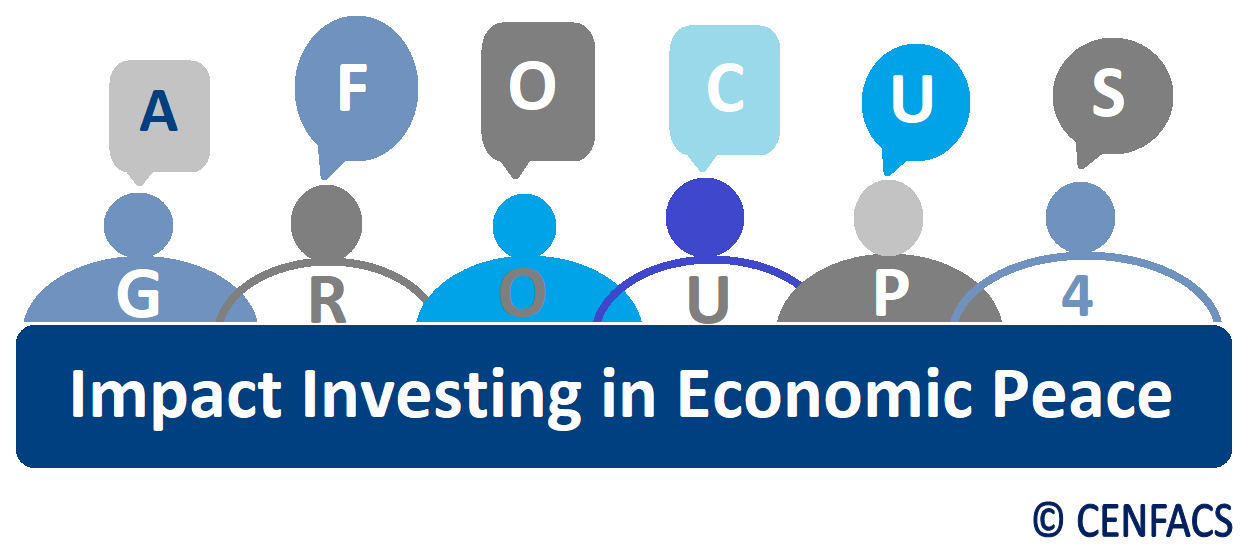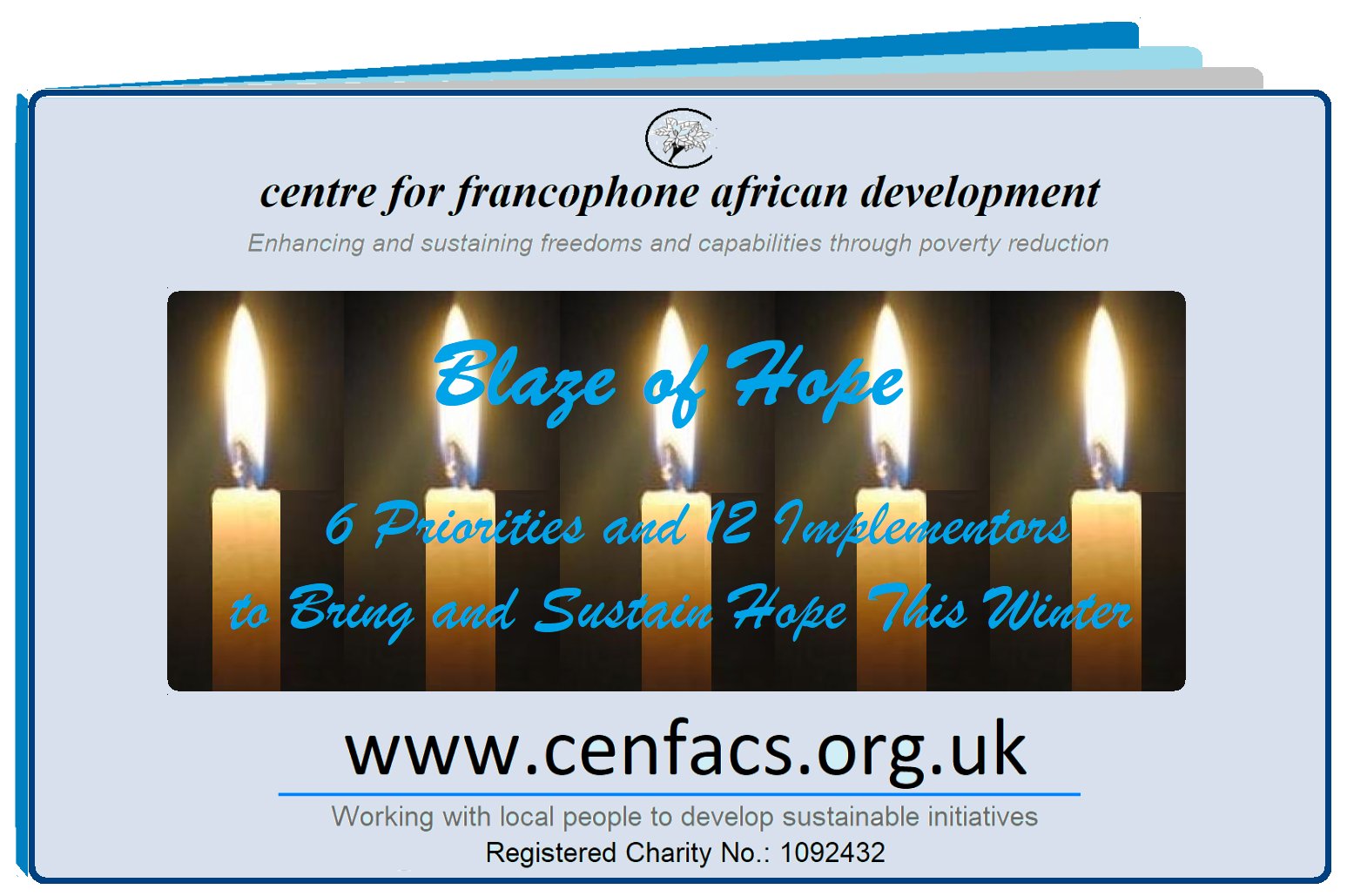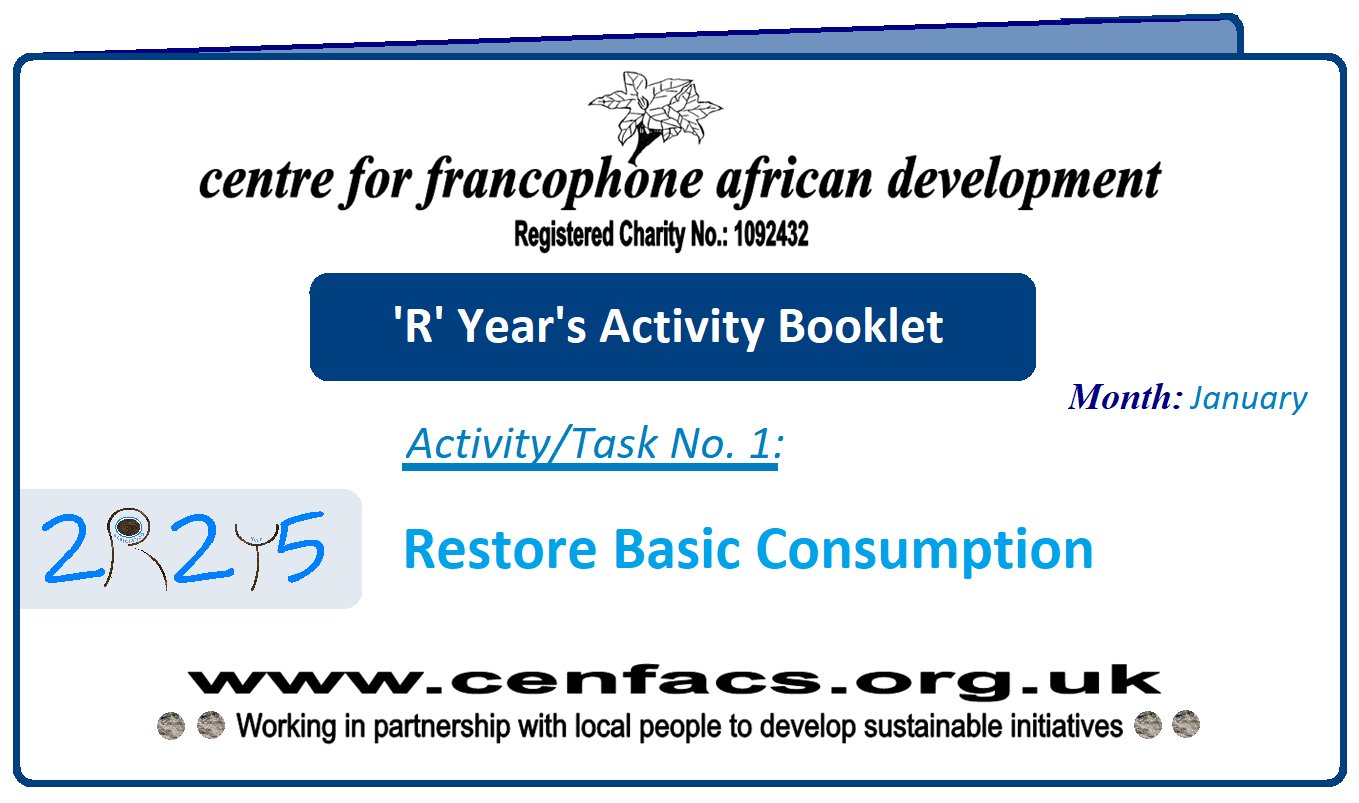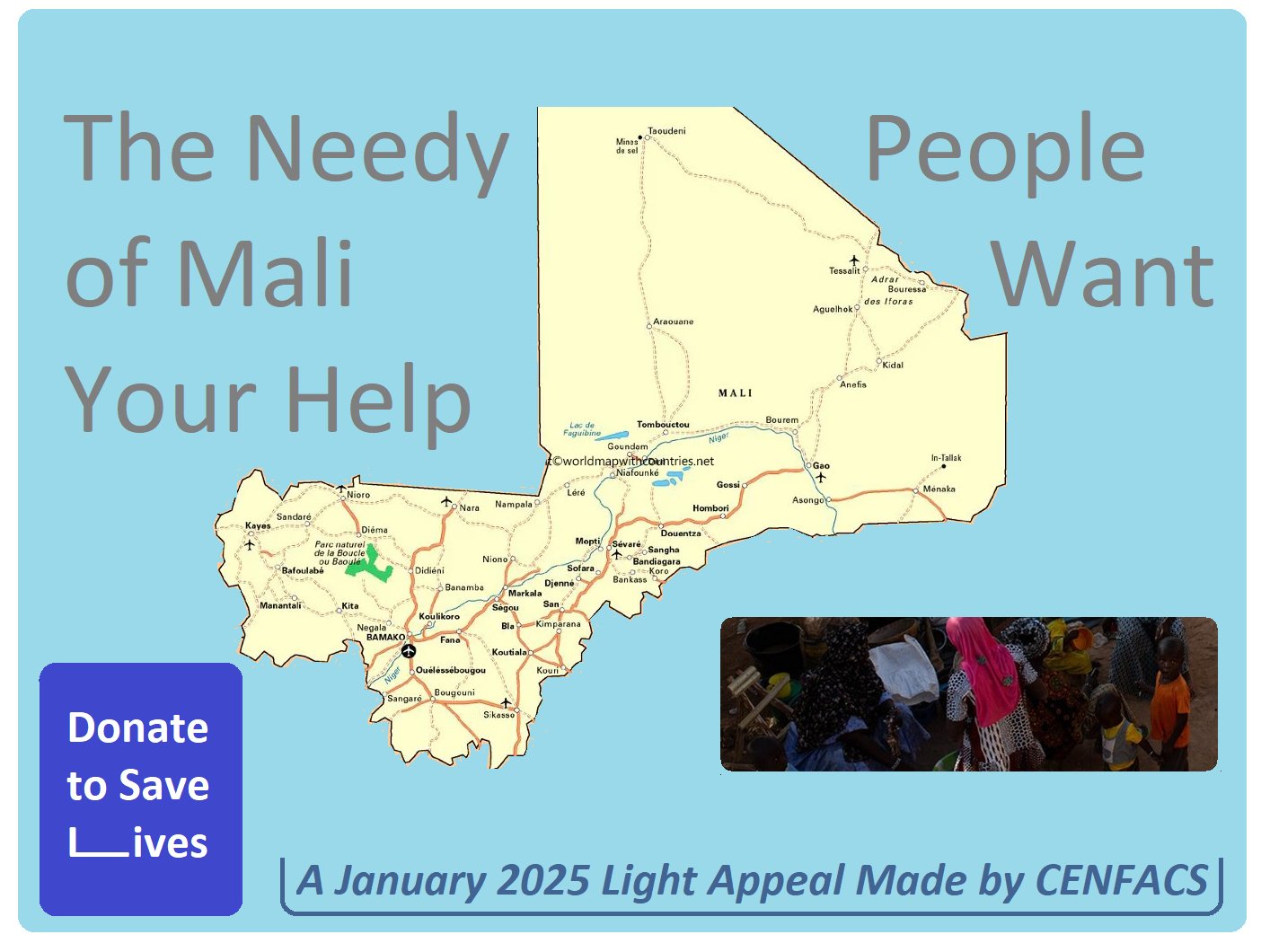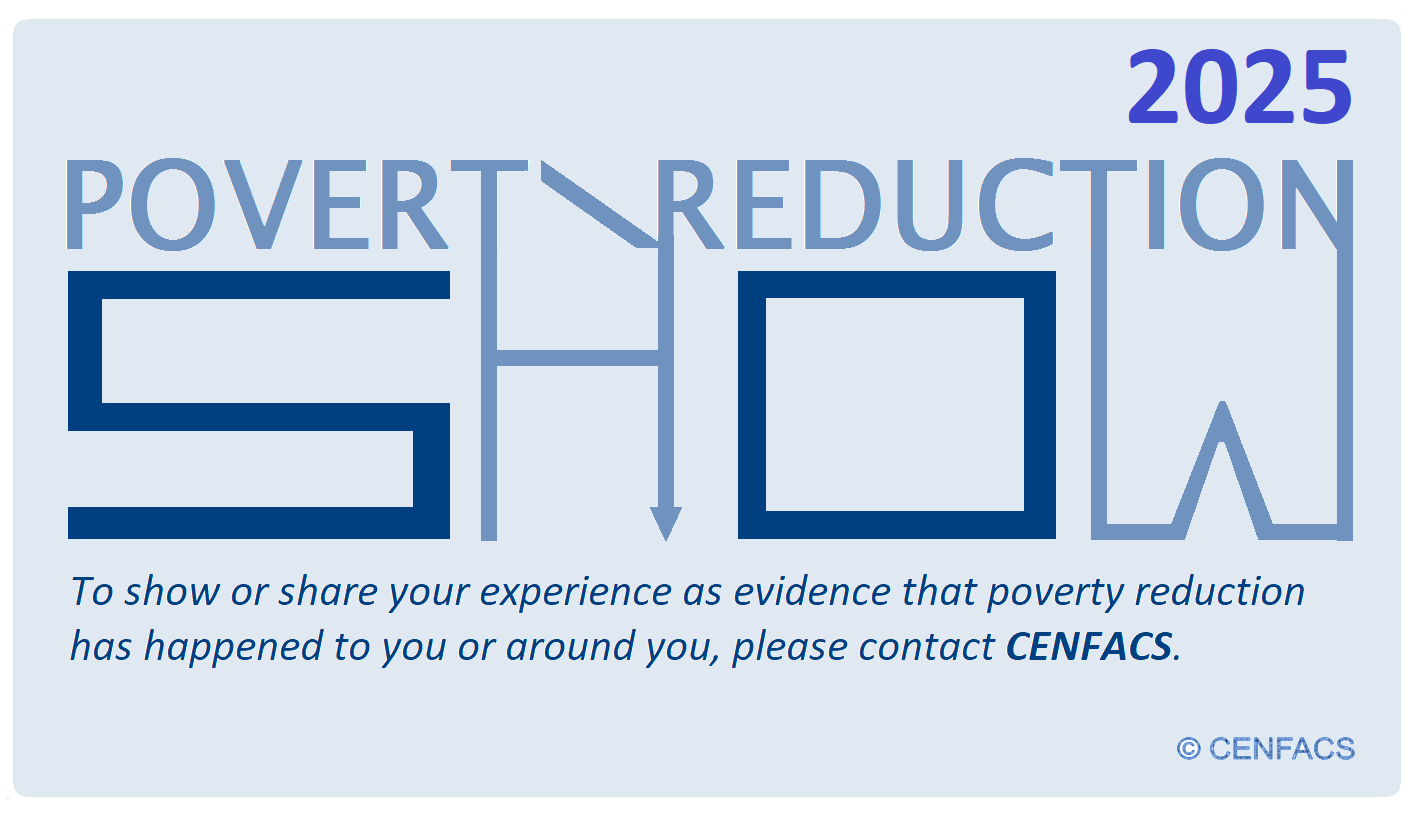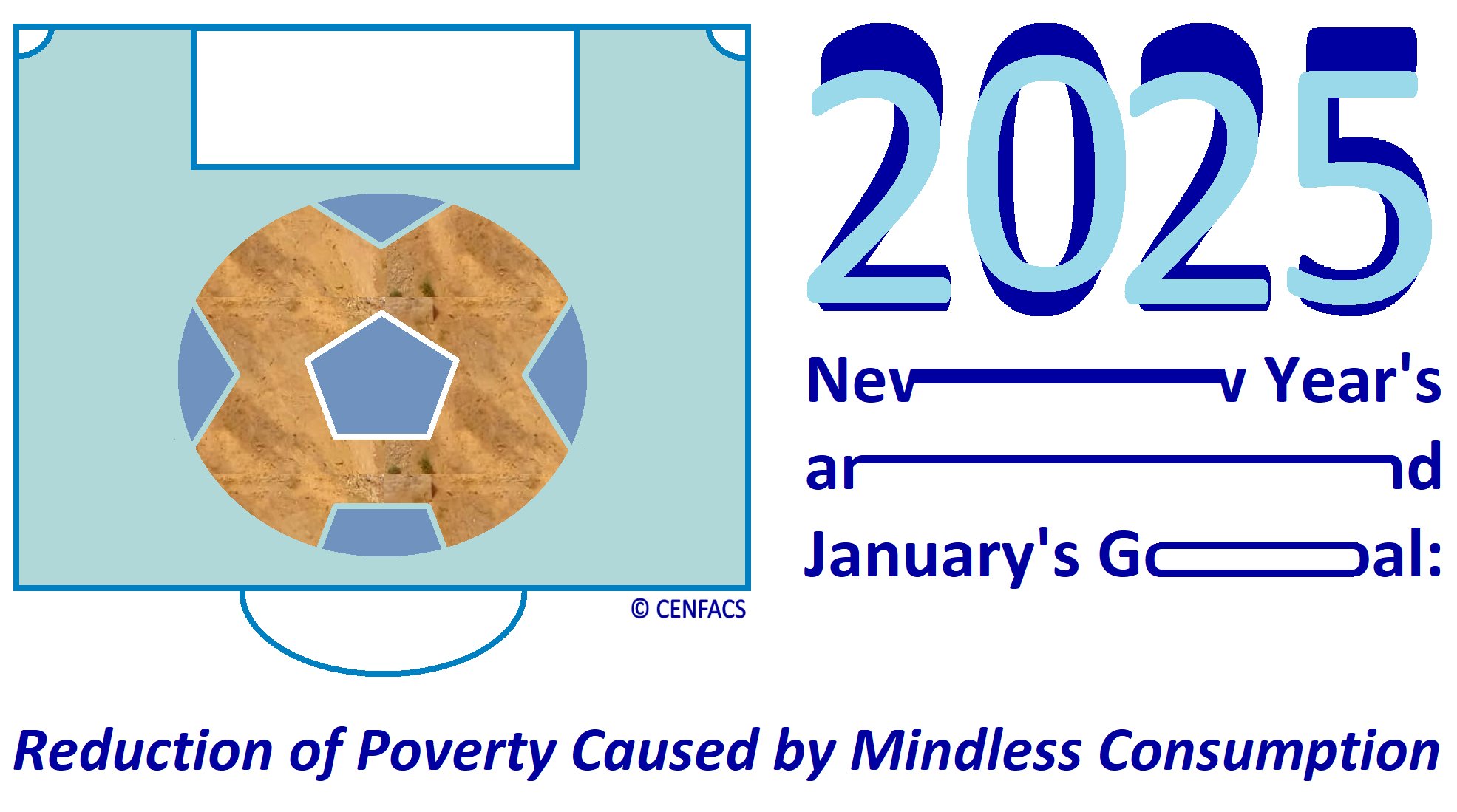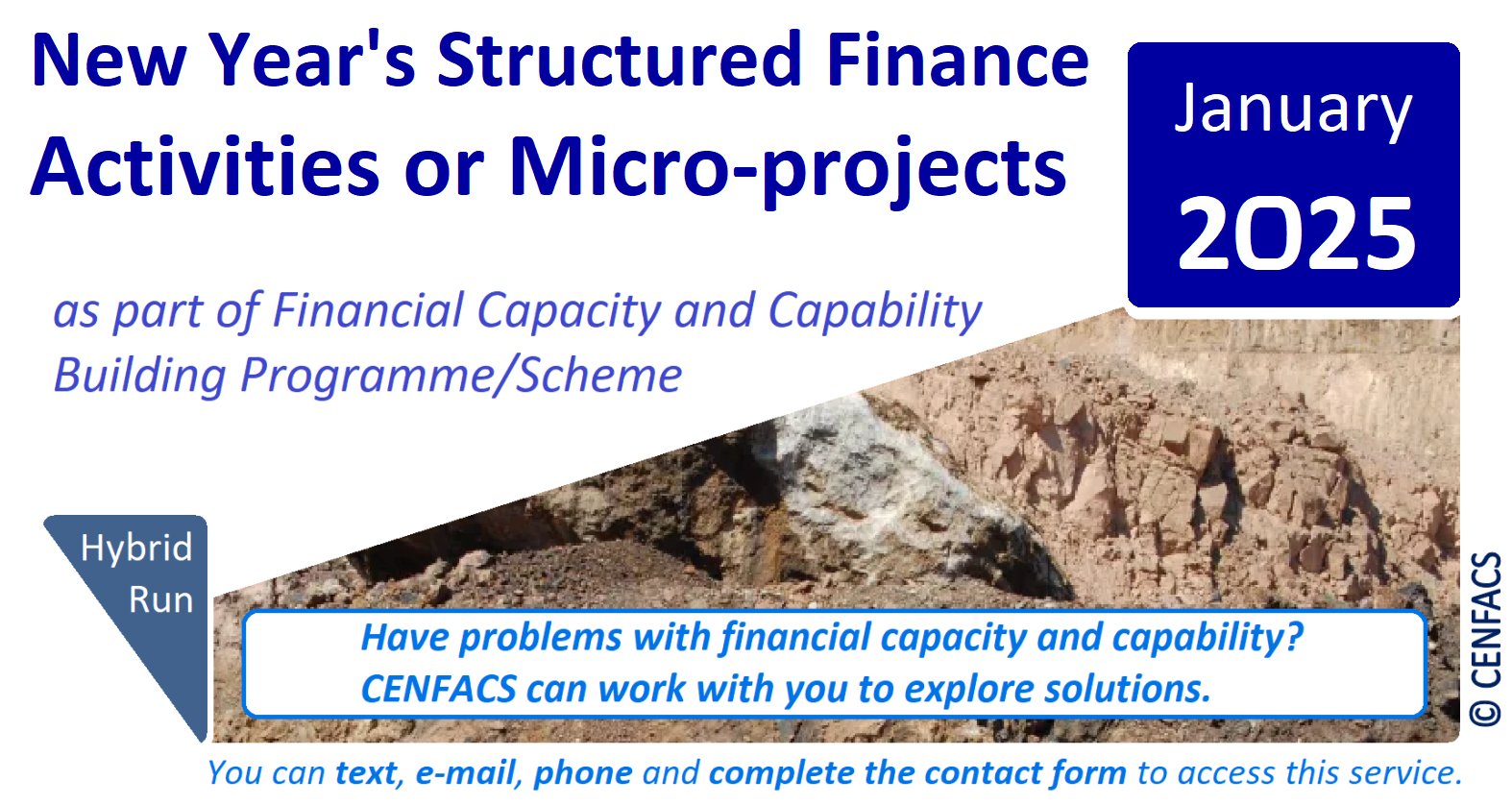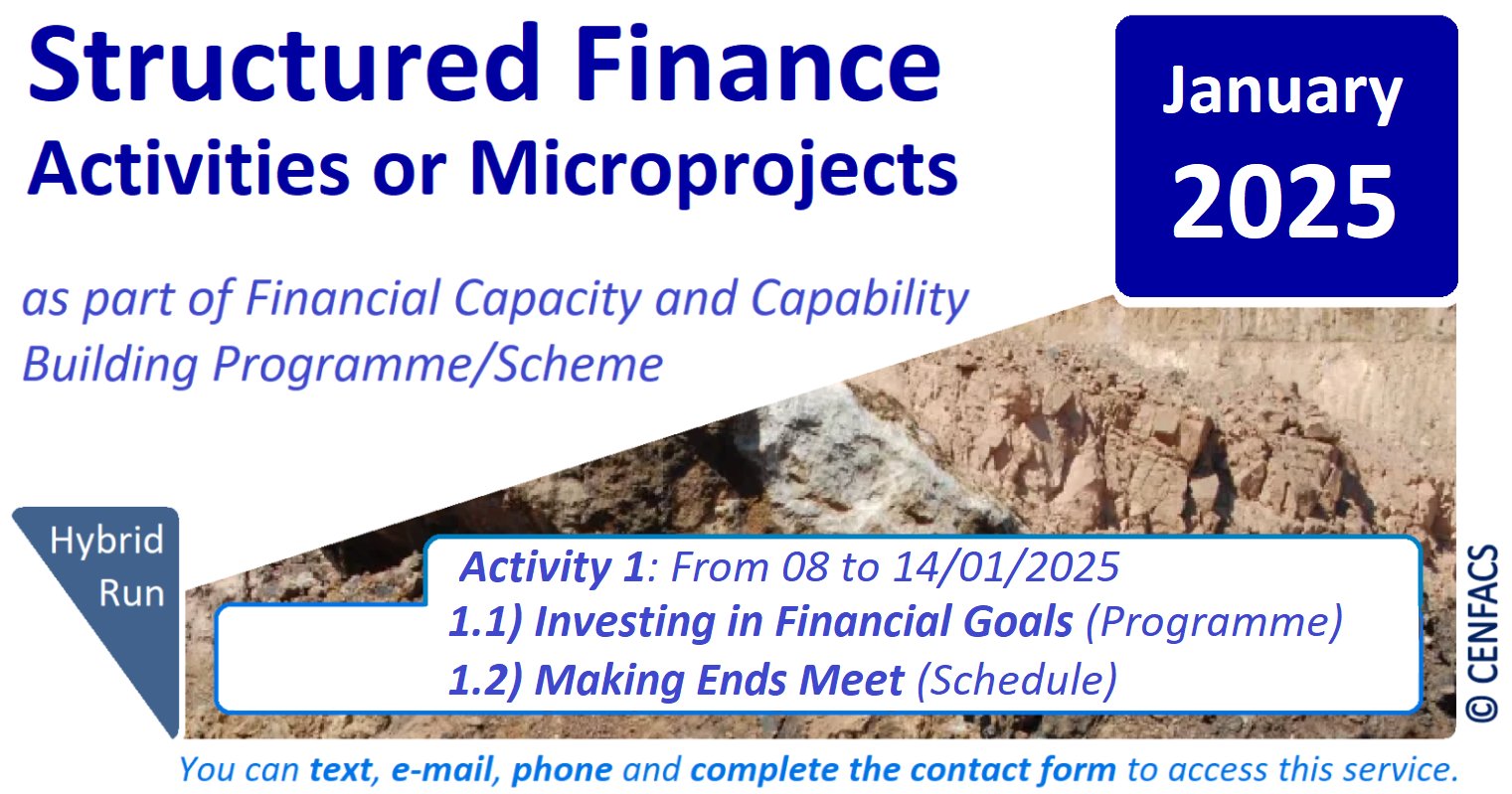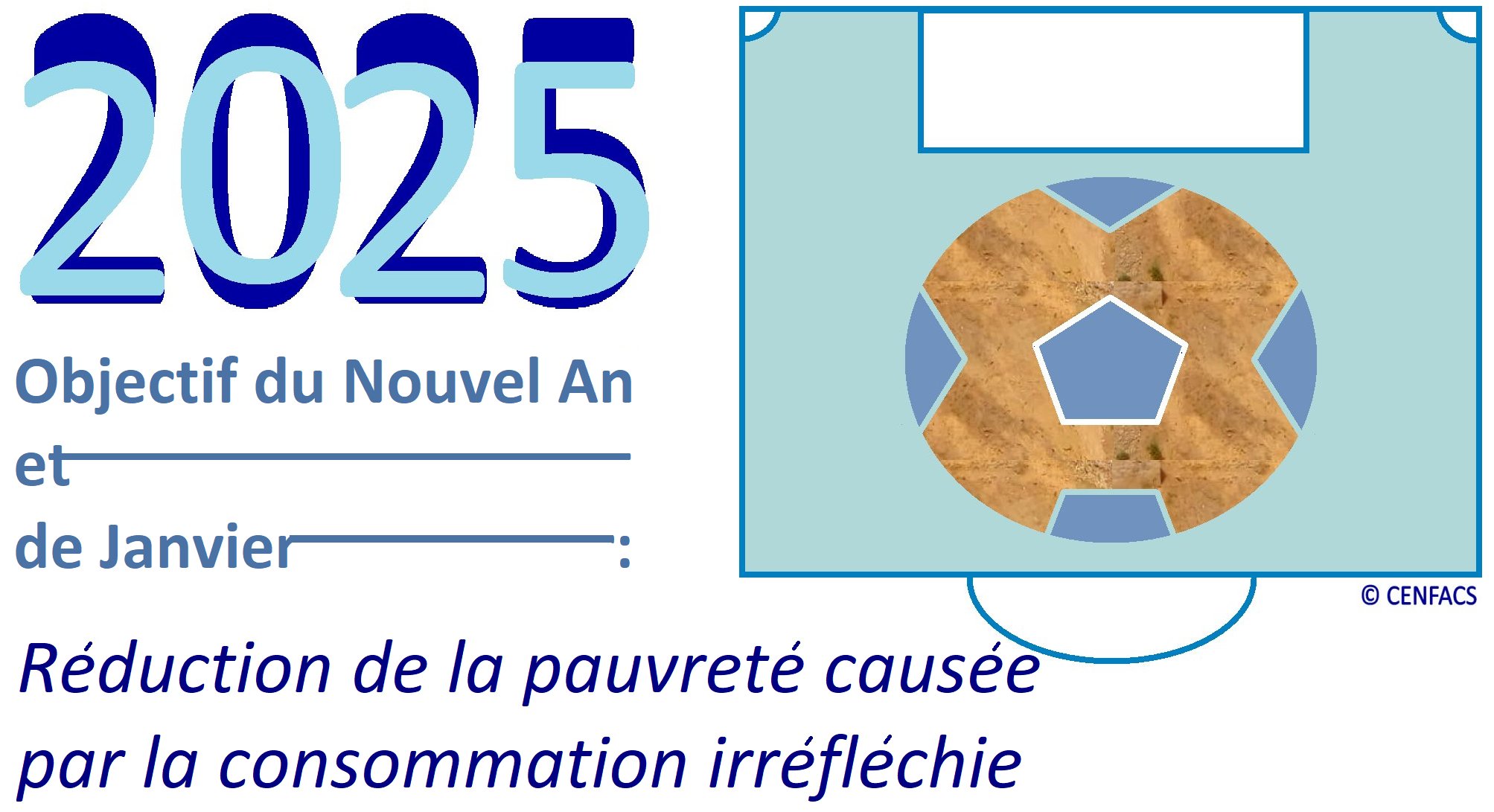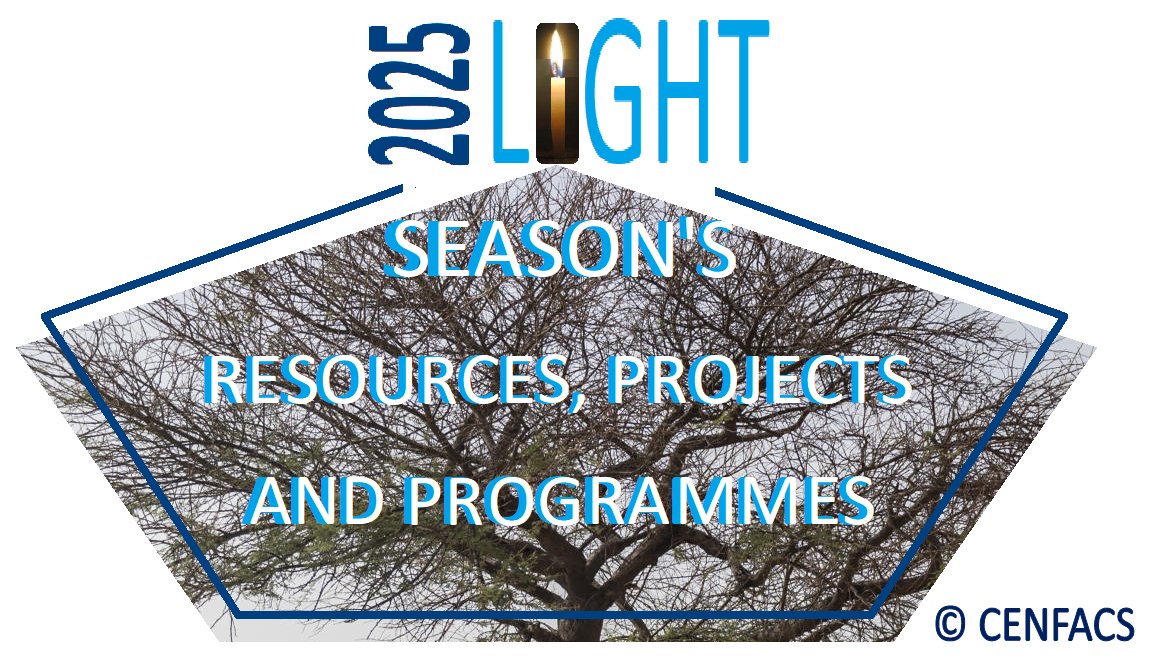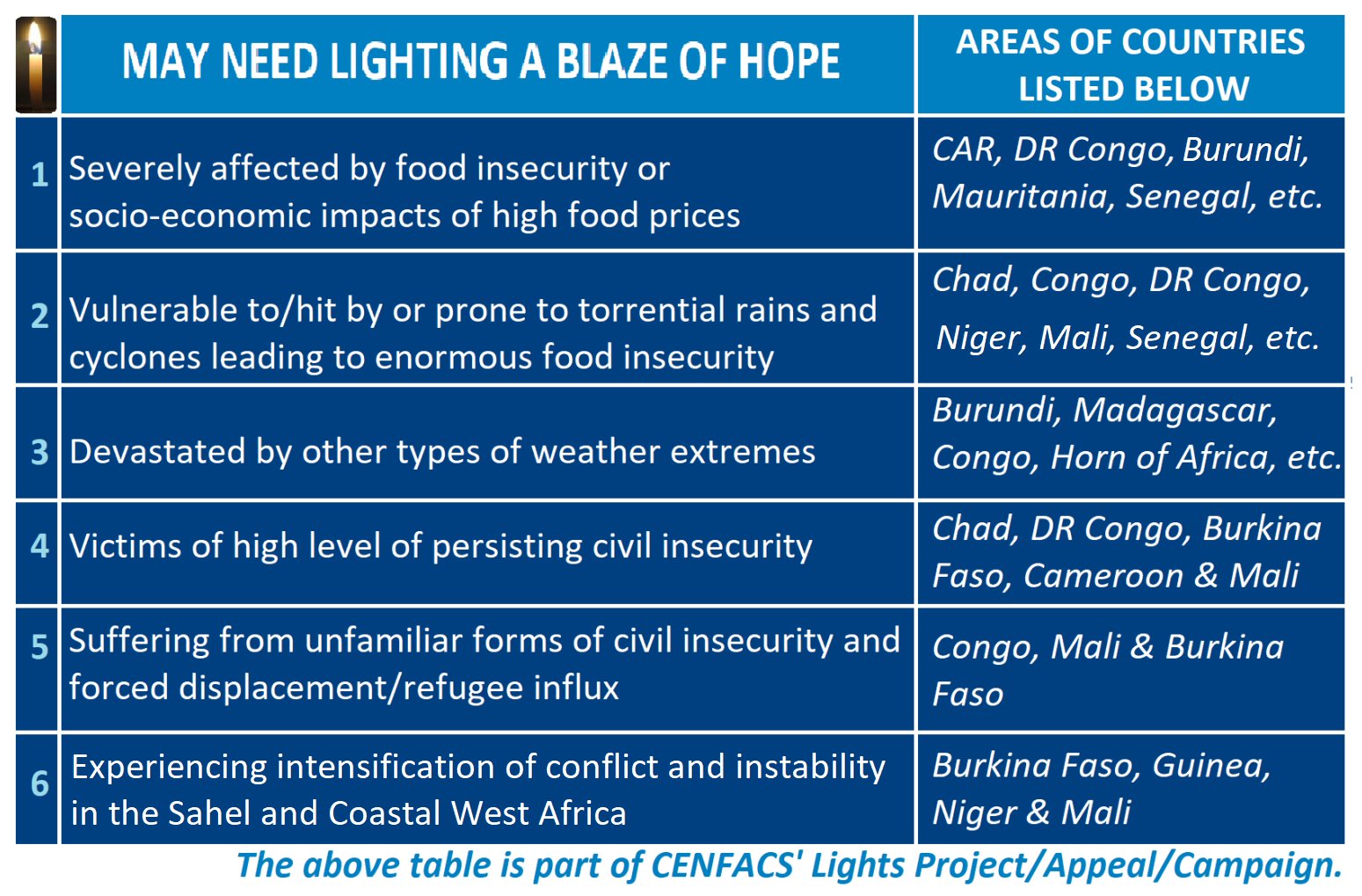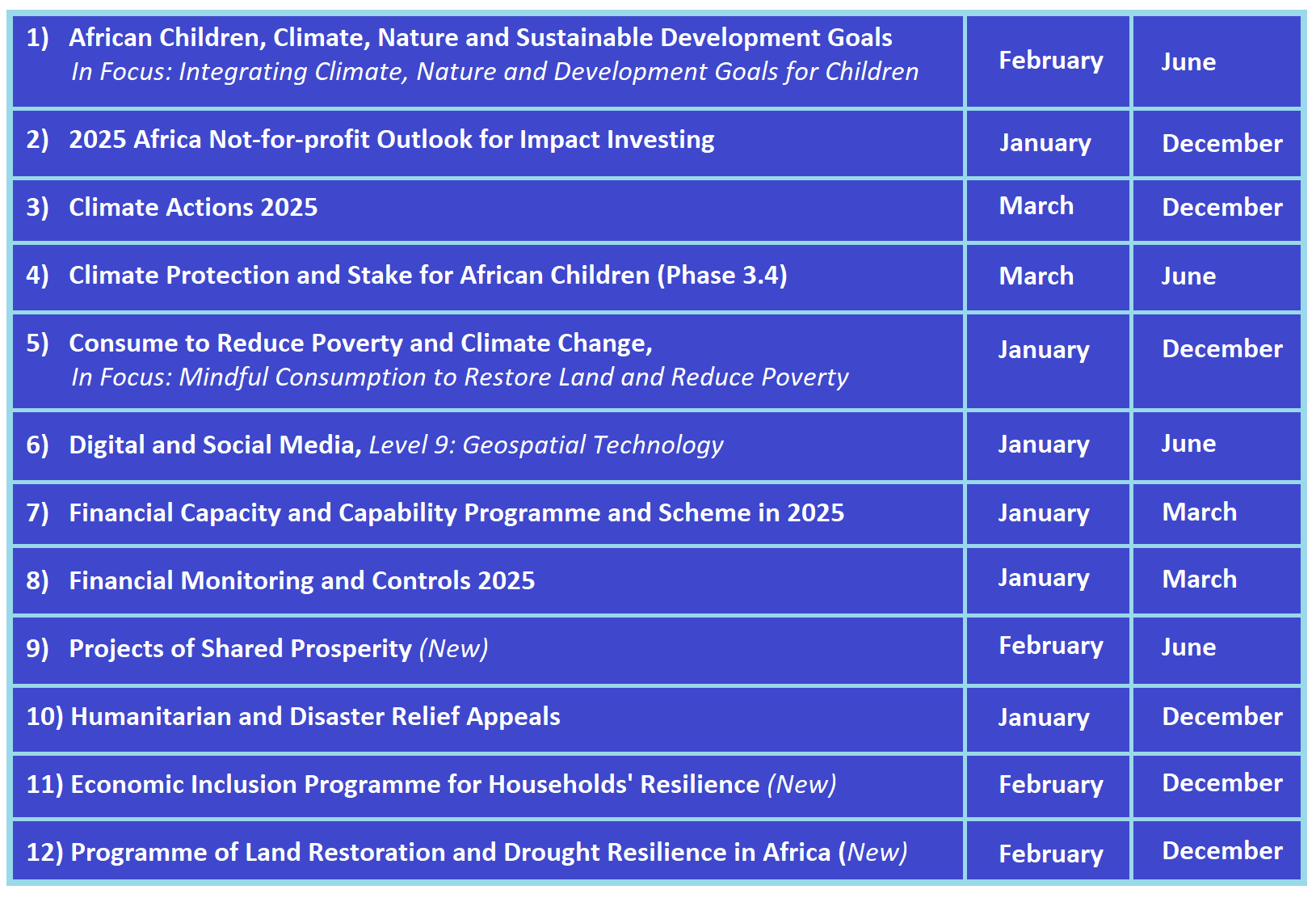Welcome to CENFACS’ Online Diary!
12 March 2025
Post No. 395
The Week’s Contents
• Matching Organisation-Investor via Land Restoration Project – Activity 3 (from 12 to 18/03/2025): Matching Organisation’s Project Management Plan with Impact Investor’s Finance File
• Climate Action 2 – In Focus from 10 to 16/03/2025: Biofuels; Efficient Cookstoves
• Double Goal of the Month: Reduction of Poverty as Lacks of Low-carbon and Climate Technologies
… And much more!
Key Messages
• Matching Organisation-Investor via Land Restoration Project –
Activity 3 (from 12 to 18/03/2025): Matching Organisation’s Project Management Plan with Impact Investor’s Finance File
Both Africa-based Sister Charitable Organisation (ASCO) and Not-for-profit (n-f-p) Impact Investor scored enough points in the Second Activity of the Matching Organisation-Investor via Land Restoration Project. They would like to continue their talks and move to the third round of negotiations, which is Activity 3.
This third round of talks consists of agreeing on Project Management Plan to be presented by ASCO, and on the Finance File to be open by the n-f-p Impact Investor before the start of any restoration works that deem necessary for the Land Restoration Project (LRP). Both the Project Management Plan and Finance File will provide the information indicated below.
Regarding the Project Management Plan (PMP) to be presented by ASCO, it will be a document outlining how the LRP will be managed and monitored, detailing the key milestones, timelines, budget allocations, resource requirements, and performance metrics to ensure that the LRP achieves its planned outcomes and aligns with ASCO’s charity objects and mission.
PMP will include LRP objectives, scope, timeline and schedule, budget allocation, performance metrics, stakeholder management, risk management, and reporting and monitoring plans.
The PMP will serve as a communication tool, a reference for evaluation, and an instrument for alignment and transparency.
Concerning the Finance File to be open by the n-f-p Impact Investor, this file will be about conducting due diligence on the ASCO, analyse its financial health and charity activities, charity model, business model if any income generation activity is appended to its charity mission, and potential risks before the n-f-p Impact Investor decides to invest. The n-f-p Impact Investor will use financial statements (e.g., balance sheet, income statement, cash flow projections, income and expenditure account, etc.) to evaluate ASCO’s financial health and income potential. ASCO’s financial statements will help the n-f-p Impact Investor determine ASCO’s ability to set up a LRP, to grow and generate poverty-relieving and climate benefits.
Both ASCO and n-f-p Impact Investor would like to reach an agreement through PMP for ASCO and Finance File for the n-f-p Impact Investor. To reach an agreement, each side of this Activity 3 needs to clarify what they are offering in the negotiation to meet the matching terms and conditions.
If this Activity 3 is successful, they will move to the next activity – Activity 4. Where the two (i.e., investee and investor) need support, CENFACS will work with each party to fill the gap.
More about Activity 3 can be found under the Main Development section of this post.
• Climate Action 2 – In Focus from 10 to 16/03/2025: Biofuels; Efficient Cookstoves
This second climate action is about accessing both efficient cookstoves and fuels to reduce greenhouse gas emissions and promote clean cooking. This action will be taken around the following headings:
~ biofuels
~ efficient cookstoves
~ the links between inefficient cookstoves and fuels on the one hand and poverty on the other
~ working with the Community on efficient fuels and cookstoves.
Let us uncover each of these headings.
• • Understanding Biofuels
Our understanding of biofuels comes from ‘capgemini.com’ (1) which explains that
“Biofuels represent renewable energy sources derived from biological feedstocks such as corn, algae, and organic waste. These sources play a critical role in mitigating carbon emissions, resulting in a significantly lower carbon footprint compared to traditional fossil fuels”.
They are a low-carbon alternative to fossil fuels that can help reduce greenhouse gas emissions. They can be used in vehicles, infrastructure, and heating.
After the understanding of biofuels as a low-carbon technology, one can try to act on their role in transitioning to a low-carbon economy as well as in helping reduce poverty linked to the use of inefficient fuels. To achieve this transition, it could require to take into account generation biofuels.
There are different generation biofuels; just as there are criticisms about biofuels. However, what is important is to keep on improving biofuels so that they continue to achieve sustainable energy future and energy security. This achievement will depend on market dynamics and growth drivers.
• • Acting for Efficient Cookstoves
Efficient cookstoves are a climate technology that reduce greenhouse gas emissions by burning fuel more efficiently. They can improve health and reduce deforestation.
The action about efficient cookstoves as a climate technology is about access and use of clean cooking methods that help reduce emissions and negative health impacts, while increasing wellbeing outcomes. This is because those who use stoves in certain parts of the world (like in Africa) often rely on biomass fuels like wood and charcoal, which can have detrimental health impacts.
The use of fuels contributes to deforestation; let alone the toxic emissions from the stoves that can cause serious respiratory illnesses. This suggests that there could be some links between inefficient cookstoves and fuels on the one hand and poverty on the other.
• • Links between Inefficient Cookstoves, Fuels and Poverty
Poverty could be linked to inefficient cookstoves and fuels. This can happen if people are forced to walk long distances to find fuel or firewood. This could affect their time for other productive activities. The poorest amongst these people are those with the responsibility to collect fuels. Amongst these poorest are women and children in places like Africa. In this respect, poverty could be linked to inefficient cookstoves and fuels. Arguing that there is such link is one thing. Working with the Community to reduce poverty induced by inefficient cookstoves and fuels is a better thing to do.
• • Working with the Community on Efficient Fuels and Cookstoves
The all purpose of writing this note is to guide our action. In other words, what is key here is to take action. The note is only a guided principle.
For instance, taking action together could be on the following:
~ how to help those who are suffering from the lack of access to efficient cookstoves and fuels to access them
~ advocating for sharing and transferring technologies between Africa and the rest of the world, included technologies linked to efficient cookstoves and fuels
~ educating the members of the CENFACS Community who are unaware of the help that biofuels provide; help which includes decarbonisation of transport, increase in energy security and reduction of climate change
~ explaining the benefits of efficient cookstoves; benefits which are improvement in health, reduction of deforestation, money savings and improvement in the quality of life
~ reducing and/or ending fuel poverty and poverty linked to the lack of access to efficient cookstoves.
In short, clean cooking technologies can help mitigate the environmental and health problems linked to inefficient stoves and biomass fuels.
Those members of our community in the UK and Africa-based Sister Organisations willing to work with CENFACS on Efficient Cookstoves and Fuels as well as on Poverty Reduction linked to them; they can take climate actions with us.
For any queries or enquiries about Climate Action 2 and Climate Actions Month, please do not hesitate to contact CENFACS.
• Double Goal of the Month: Reduction of Poverty as Lacks of Low-carbon and Climate Technologies
Our goal for March 2025 is double: reduction of poverty as a lack of low-carbon technology adoption and reduction of poverty as a lack of climate technology. Let us first explain this double goal, then highlight the implications for selecting the goal of the month.
• • Reducing Poverty as a Lack of Low-carbon Technology Adoption
Poverty as a lack of low-carbon technology adoption is the state in which poorer households have not the money or means to buy and install low-carbon technologies.
Reducing poverty as the lack of low-carbon technology adoption would be about promoting the adoption of low-carbon technology among the poor, informing them what support is available for them to access low-carbon technologies and helping them to transition to and adopt low-carbon energy.
• • Reducing Poverty as a Lack of Climate Technology
Poverty as a lack of climate technology is about linking poverty and climate technology. This type of poverty happens when poorer households do not have the financial means to acquire climate technologies.
Reducing poverty as the lack of climate technology would be about providing digital technologies to these households so that they can monitor greenhouse gas emissions, solar home systems as renewable energy, and other energy efficiency equipment. It is finally about balancing their energy needs with their economic situation.
• • Implications for Selecting the Goal for the Month
After selecting the goal for the month, we focus our efforts and mind set on the selected goal by making sure that in our real life we apply it. We also expect our supporters to go for the goal of the month by working on the same goal and by supporting those who may be suffering from the type of poverty linked to the goal for the month we are talking about during the given month (e.g., March 2025).
For further details on the goal of the month, its selection procedure including its support and how one can go for it, please contact CENFACS.
Extra Messages
• Taking Climate Protection and Stake for African Children at the Implementation Level with Full Implementation Sub-phase (Phase 3.4)
• Financial Controls and Monitoring 2025 – In Focus from 12/03/2025: Financial Forecasting and Projections, and Frequency of Monitoring Review
• All-year Round Projects Cycle (Triple Value Initiatives Cycle) – Step/Workshop 4: Appraising Your Play, Run and Vote Projects
• Taking Climate Protection and Stake for African Children at the Implementation Level with Full Implementation Sub-phase (Phase 3.4)
Since at COP29 in Baku (2), developed nations pledged to channel $300 billion a year into developing countries by 2035 to support their efforts to deal with climate change, the Installation Sub-phase of Taking Climate Protection and Stake for African Children at the Implementation (TCPSACI) has now moved from Initial Implementation sub-phase (phase 3.3) to Full Implementation sub-phase (phase 3.4)
To understand this new sub-phase of our Climate Protection and Children Advocacy, one may need to know what full implementation means.
• • What Is Full Implementation?
To comprehend full implementation, it may be better to explain implementation stages. According to ‘implementationpractice.org’ (3),
“Implementation stages are the phases that commonly occur during implementation process”.
For ‘implementationpractice.org’, full implementation occurs when the majority of practitioners can skilfully deliver the programme or practice, and the focus population experiences improved outcomes.
This view on implementation and the science behind it will help in the way we run our climate protection advocacy within CENFACS.
• • Full Implementation of CENFACS’ TCPSACI and its sub-phase 3.4
The implementation process of CENFACS’ TCPSACI was organised in four stages: exploration, installation, initial implementation and full implementation. The full implementation will tell if the outcomes of our Climate Talks Follow-up Project; stage known as Taking Climate Protection and Stake for African Children at the Implementation Level starts to bring results.
Besides this Full Implementation, we are continuing to work on the outcomes of COP29 (op. cit.) and how they can fit into CENFACS’ TCPSACI and its sub-phase 3.4, and how they can help us prepare for COP30 (4) which will be convened in Belém, Brazil.
Without anticipating what may happen at the climate talks in Belém, let us inform our supporters that the slogan for this follow-up is: Belém Do Better for Children!
To enquire about the working plan about this follow-up within CENFACS and to support CENFACS’ TCPSACI and its sub-phase 3.4, please contact CENFACS.
• Financial Controls and Monitoring 2025 – In Focus from 12/03/2025: Financial Forecasting and Projections, and Frequency of Monitoring Review
The fourth financial control of our work with households making the CENFACS Community is Making Financial Forecasting and Projections, while the fourth financial monitor is Frequency of Monitoring Review. Let us briefly explain this control and this monitor.
• • Financial Forecasting and Projections
Let us start with financial forecasting. According to ‘wallstreetmojo.com’ (5),
“Financial forecasting refers to the process of drafting projections relating to the future performance of the business. It helps with direction and finding problem areas of the business. It includes analysing the business’s particular performance and thoroughly studying current trends”.
Although households are not businesses, they can apply financial forecasting to find out their performance if the future. The components of their financial forecasting models may differ from those used by businesses. Despite that, their financial forecasting would still include the following financial documents or statements: projected income statement, cash budget, projected balance sheet, projected sources and uses of fund. All these statements will be customised to reflect household or family relationships and reality.
Regarding financial projections, ‘wallstreetmojo.com’ (6) explains that
“A Financial projection shows forecasts and predictions on the financial estimates and numbers that range from revenues and expenses pertaining to financial statements and takes external market factors and internal data into account”.
Still for ‘wallstreetmojo.com’, financial projections are a decision-making tool for the management and creditors. Those who would like to respond to households’ funding applications can base their decision on household financial forecasts. Households will calculate their estimates and projections based on certain factors such as household performance, the prevailing economic conditions, the market volatility, the demand, and supply of the products and services.
Briefly, financial projections are about making informed financial decisions and projection statements. The data regarding financial projections helps in assessing the credit worthiness of households, especially if households are looking for a loan, a mortgage, a credit, a financial support, etc.
Households need as well to review and update their financial projections in the light of changes in their personal circumstances and economic factors.
• • Frequency of Monitoring Review
To understand this frequency, let us first explain monitoring and review.
According to ‘scvo.scot’ (7),
“Monitoring is the ongoing process of regularly collecting and analysing relevant information to make sure your are doing what you set out to do… Review is when you look at the results of an evaluation and decide whether it needs to change”.
From the definition of monitoring and review, it is possible to argue that monitoring review happens when you are looking at the results of the ongoing process of regularly collecting and analysing relevant information. Because our financial advocacy/campaign is on financial matter, let us focus on financial review.
Financial review of activity for households will help them to identify errors, anomalies, potential compliance issues and significant budget variances. However, the frequency of this review will depend on whether households are conducting a perpetual monitoring (that is, continuous, uninterrupted) or trigger monitoring (that is linked to changes and alerts) or periodic monitoring (i.e., refreshing the data at set intervals in the relationship), as explained by ‘thirdfort.com’ (8).
In short, the frequency of monitoring review will depend on households’ circumstances, timing, and analysis that the review may require. Some households may prefer to do it on a monthly basis, others may want to do it annually. Other busy households may find it easier to do it when they are on holiday, etc. As ‘financestrategists.com’ (9) puts it,
“The frequency of financial plan monitoring will depend on individual circumstances, goals, and preferences. At a minimum, it is advisable to review and update the financial plan annually but more frequent monitoring may be necessary to track progress and make adjustments as needed”.
The above are the fourth financial control and fourth financial monitor we wanted to share with our users or beneficiaries.
If anyone of our members needs support regarding their financial controls and monitoring, in particular Financial Forecasting and Projections, and Frequency of Monitoring Review; they should not hesitate to contact CENFACS.
• • Last Thoughts
Financial controls and monitoring are needed for households no matter their size or level of wealth. We all need established policies and procedures to manage and monitor our financial resources, to prevent errors and ensure compliance (for instance about council/local tax). We also require an ongoing process of reviewing financial activities to identify potential issues, anomalies, and compliance risks. These needs and requirements are even greater for households striving for high impact with constrained financial resources.
We hope that the topics we covered in the last four weeks would have helped those who have been following us to find answers to some of the problems they may have in order to financially control and monitor their finances.
For those who have any queries and or enquiries about any of these topics, they should hesitate to contact CENFACS. They can as well give us their own feedback on the overall or specific areas of Financial Controls and Monitoring 2025.
• All-year Round Projects Cycle (Triple Value Initiatives Cycle) –
Step/Workshop 4: Appraising Your Play, Run and Vote Projects
To carry out this step/workshop 4, we are going to briefly explain what this step/workshop is about and give an example about it.
• • Appraising Your Play, Run and Vote Projects
It is about assessing the feasibility, viability and potential impact of a proposed project. It means that an all-year-round project user will proceed with the following:
identify the project, screen it, scope it, analyse its market, technically study it as feasible, assess its financial viability and its economic impact, analyse risks, examine environmental and social impact and report its appraisal.
Because All-year Round Projects are such small and practical initiatives, there is a need to simplify the appraisal relating to it. To simplify the matter, we are going to limit to financial appraisal.
• • Example of Financial Appraisal: Your Project about Running for Poverty Reduction
Let say you want to run 4 km.
You have two options.
~ Option 1
You could simply dress and get out your home start running without thinking of any financial appraisal.
~ Option 2
You can conduct a basic financial appraisal by asking yourself if you need to buy a bottle of water, a pair of trainers, a clock or watch to time yourself, the frequency of your run activity (e.g., once a week or every particular day of the week), decide whether you want to run alone or as a group or even join a local group of runners where you live, etc.
You can even work out how much it costs to run in open space like a park compared to a close space such as a gym. As part of the costs of running, you could include the costs of a pair of running shoes, appropriate clothes, a watch, earphones, gels, water bottles, etc.
You can as well assess the benefit of running in terms of your health and general wellbeing. The benefits of physically running in terms of health could be improved cardiovascular health, weight management, increase bone density, enhanced mood, stress reduction, etc. The benefits of physically running relating to wellbeing would be an improvement in brain, confidence boost, stress management, mindfulness, etc
You can even include a fundraising element so that money to be raised through your running hobby goes to good causes such as CENFACS’ noble and beautiful ones. To include this element into your physically running activity, you need to define your goals and narrative, engage your network and friends, and use fundraising ideas (like running in fancy dress).
In this second option, you can carry out more appraisal and come out with a sort of financial plan in terms of basic costs and benefits of running. In project planning terms, it means you have financially appraised Your Project about Running for Poverty Reduction.
For those who would like to dive deeper into the appraisal of their Play or Run or Vote project, they should not hesitate to contact CENFACS.
Message in English-French (Message en Anglais-Français)
• CENFACS be.africa Forum e-discusses the Impact of Arms Trade on Poverty Reduction in Africa
In the aftermath of the cold war, everybody was hoping that the peace dividend from the end of cold war would result in more investment in civil economy, environment, development and poverty reduction. This was going to be a new norm or model of living. Many countries, including African countries, reviewed their metric relating to military expenditure as percentage of gross domestic product compared to metrics in other areas like health, education, housing, etc. The idea after this review was mostly to prioritise social, economic and environmental spending compared to military one.
Unfortunately, with the rising geo-economic and geo-political tensions the post cold-war peaceful state of the world cannot maintain by itself. Arms industry (that is the business whose participants manufacture, sell, and service weapons, military technology or the defence technological base and complementary equipment) has continued to flourish. This flourishing situation can only have some impacts on efforts to reduce poverty as resources have been diverted to meet other needs of security and intelligence forces than those of lifting people out of poverty.
Due to this situation, CENFACS’ be.Africa Forum is asking the following question:
Does arms trade increase or have no effect on poverty reduction in Africa?
The above-mentioned question is part of this week’s debate within CENFACS’ be.Africa Forum.
Those who may be interested in this discussion can join our poverty reduction pundits and/or contribute by contacting CENFACS be.Africa Forum, which is a forum for discussion on poverty reduction and sustainable development issues in Africa and which acts on behalf of its members by making proposals or ideas for actions for a better Africa.
To contact CENFACS about this discussion, please use our usual contact information on this website.
• Le Forum ‘Une Afrique Meilleure’ de CENFACS discute en ligne de l’Impact du Commerce des Armes sur la Réduction de la Pauvreté en Afrique
Au lendemain de la guerre froide, tout le monde espérait que les dividendes de la paix de la fin de la guerre froide se traduiraient par une augmentation des investissements dans l’économie civile, l’environnement, le développement et la réduction de la pauvreté. Cela allait être un nouveau mode de vie. De nombreux pays, y compris ceux d’Afrique, ont revu leurs indicateurs relatifs aux dépenses militaires en pourcentage du produit intérieur brut par rapport aux indicateurs dans d’autres domaines tels que la santé, l’éducation, le logement, etc. L’examen visait principalement à donner la priorité aux dépenses sociales, économiques et environnementales par rapport aux dépenses militaires.
Malheureusement, avec la montée des tensions géoéconomiques et géopolitiques, l’état pacifique du monde de l’après–guerre froide ne peut pas se maintenir par lui–même. L’industrie de l’armement (c’est–à–dire l’entreprise dont les participants fabriquent, vendent et entretiennent des armes, de la technologie militaire ou de la base technologique de défense et des équipements complémentaires) a continué à prospérer. Cette situation florissante ne peut qu’avoir des impacts sur les efforts de réduction de la pauvreté, car les ressources ont été détournées pour répondre à d’autres besoins des forces de sécurité et d’espionage que ceux de sortir les gens de la pauvreté.
En raison de cette situation, le Forum ‘Une Afrique Meilleure’ de CENFACS pose la question suivante :
Le commerce des armes augmente-t-il ou n’a-t-il pas d’effet sur la réduction de la pauvreté en Afrique ?
La question susmentionnée fait partie du débat de cette semaine au sein du Forum ‘Une Afrique Meilleure’ de CENFACS.
Ceux ou celles qui pourraient être intéressé(e)s par cette discussion peuvent se joindre à nos experts en réduction de la pauvreté et/ou contribuer en contactant le ‘me.Afrique’ du CENFACS (ou le Forum ‘Une Afrique Meilleure’ de CENFACS), qui est un forum de discussion sur les questions de réduction de la pauvreté et de développement durable en Afrique et qui agit au nom de ses membres en faisant des propositions ou des idées d’actions pour une Afrique meilleure.
Pour contacter le CENFACS au sujet de cette discussion, veuillez utiliser nos coordonnées habituelles sur ce site Web.
Main Development
• Matching Organisation-Investor via Land Restoration Project –
Activity 3 (from 12 to 18/03/2025): Matching Organisation’s Project Management Plan with Impact Investor’s Finance File
Both parties (i.e., Africa-based Sister Charitable Organisation and Not-for-profit Investor) have made some steady progress so far as they continue to score points; points which are enough to enable them to enter the third stage of the matching talks. These matching talks will be about finding ways to reach an agreement between Organisation’s Project Management Plan with Impact Investor’s Finance File.
To explain what is going to happen in this Activity 3, we have organised our notes around the following headings:
σ Africa-based Sister Charitable Organisation’s Project Management Plan
σ Not-for-profit Impact Investor’s Finance File
σ The Match or Fit Test.
Let us look at each of these headings.
• • Africa-based Sister Charitable Organisation’s Project Management Plan
As part of the negotiations/talks, ASCO will present its Project Management Plan (PMP). To understand this plan, let us briefly define it and provide some questions to answer to back up this plan.
• • • What is a project management plan?
Project management plan can be defined in many ways.
For example, the website ‘forbes.com’ (10) argues that
“A project management is a set of documents that outline the how, when and what-ifs of a project’s execution. It overviews the project’s value proposition, execution steps, resources, communication tools and protocols, risks, stakeholders (and their roles) and the deliverables involved in project’s completion. Its documents include an executive summary, charts, risk assessment and communication – and resource-management subplans”.
ASCO’s project management plan would include the above-stated documents. Additionally, ASCO needs to prepare itself to answer any questions or issues revolving around its PMP that n-f-p Impact Investor may raise.
• • • Questions to answer by ASCO to back its PMP
Among the questions that the n-f-p impact investor would like to have answers and that will help ASCO to better handle key aspects of its PMP, are the following:
~ Does ASCO have a blueprint or roadmap to the project’s success?
~ Does ASCO align all the project needs (i.e., resources, manpower, risk management, high-quality communication, etc.)?
~ Will ASCO have clearly established responsibilities and accountabilities?
~ Are tasks and deadlines are clearly established?
The N-f-p Impact Investor can base its investment decision on the PMP. To enable the N-f-p Impact Investor in this investment decision, ASCO will show that it has identified beneficiaries’ or end-users’ needs, wants and hopes to be met after the implementation of Land Restoration Project (LRP). To illustrate this information, ASCO’s PMP will contain management tools like charts, graphics and reports to record information.
Briefly, ASCO’s PMP will include an executive summary, timeline, risk assessment, team chart, communication subplan, and resource management subplan.
• • Not-for-profit Impact Investor’s Finance File (FF)
The Not-for-profit Impact Investor will approach the matching talks from two perspectives: project financial management and project financials.
• • • Approaching the matching talks from the perspective of project financial management
The Not-for-profit Impact Investor will come to the negotiations to held during Activity 3 with a Project Financial Management. What is a project financial management?
According to ‘projectmanager.com’ (11),
“A project financial management is the process of controlling the financial aspect of a project, such as its cost, revenue and profit. To do this requires planning, estimating, budgeting, funding, managing project expenses and billing”.
The N-f-p impact investor will use the elements contained in the definition of project financial management to check if ASCO meets them. To find out that ASCO will be able to meet them, the n-f-p impact investor may want some answers or clarification regarding the following matters:
~ Will ASCO have a project manager office to oversee the process of Land Restoration Project?
~ Will ASCO well manage the budget over the life cycle of the Land Restoration Project?
~ Will ASCO prioritise restoration activities that have higher return on investment?
~ Will ASCO use project management software (e.g., ProjectManager) to track costs?
To respond to the four questions, ASCO needs to show that it has a good selection of restoration activities or subprojects that will make it to meet its goals.
• • • Approaching the matching talks from the perspective of project financials
Not-for-profit impact investors will scrutinise the Land Restoration Project financials.
ASCO can as well explain the project financials. The latter are the money related to the project, programme or portfolio it will be managing. These project financials will include
~ project costs (the total funds that the Land restoration Project will require)
~ project revenue (the total amount of money that the Land Restoration Project will earn before subtracting its costs)
~ project funding sources (e.g., fundraising pledges, members’ contributions to the project, other donors or funders so that n-f-p impact investor will know how much gap that needs to be filled)
~ cash flows (cash to be moved in and out).
These financials will help ASCO to gain retention in n-f-p impact investor confidence.
Besides the project financials, n-f-p impact investor can use financial metrics in measuring project performance.
• • • Project financials to consider
Amongst these financial metrics, we can mention the following:
~ Cost Performance Index (CPI)
(through the CPI, the n-f-p impact investor may want to know if the Land Restoration Project will be under budget and the cost will not overrun)
~ Schedule Performance Index (SPI)
(through the SPI, the n-f-p impact investor would like to know if they will be delays in project execution compared to its schedule what ASCO will do)
~ Return on Investment (ROI)
(through the ROI, the n-f-p impact investor wants proof that the Land Restoration Project benefits justify the investment)
~ Net Present Value (NPV)
(through the NPV, the n-f-p impact investor requires some assurance that the Land Restoration Project will generate value and contribute to ASCO wealth or the Land Restoration Project many not be financially viable, even though it is not a for-profit investment).
Not-for-profit Impact Investors will use the above-mentioned financial metrics and other project management metrics to check that the Land Restoration Project is a financially viable proposition for impact investing and for making an agreement.
To reach an agreement between Africa-based Sister Charitable Organisation’s PMP and Not-for-profit Impact Investor’s FF, there should alignment between the two. If there is no alignment, the matching talks may not go to the next stage or to progress. In other words, there should be an agreement between ASCO’s PMP and N-f-p Impact Investor’s FF. If there is a disagreement, then the talks/negotiations could be subject to match or fit test.
• • The Match or Fit Test
As part of the match or fit test, the n-f-p Impact Investor’s view on ASCO’s PMP must be matched with the information coming out of ASCO’s PMP .
The match can be perfect or close in order to reach an agreement. If there is a huge or glaring difference between the two (i.e., between what the investor wants and what ASCO is saying about its PMP, between what the investor would like the phase of PMP to indicate and what ASCO’s PMP is really saying), the probability or chance of having an agreement at this third round of negotiations could be null or uncertain.
However, if this happens there is still a chance as CENFACS can step in to advise ASCO and guide n-f-p investor on their approaches to Land Restoration Project.
• • • Impact Advice to ASCO and Guidance to n-f-p Impact Investor
CENFACS can impact advise ASCOs to improve the presentation of the PMP they are bringing forward. CENFACS can as well guide n-f-p impact investors to work out their expectations in terms of the PMP to a format that can be agreeable by potential ASCOs. CENFACS’ impact advice for ASCOs and guidance on impact investing for n-f-p impact investor, which are impartial, will help each of them (i.e., investee and investor) to make informed decisions and to reduce or avoid the likelihood of any significant losses or misunderstandings or mismatches.
However, to reduce or avoid this likelihood both parties need to follow the rule of the matching game.
• • • The Rule of the Matching Game
The rule of the game is the more impact investors are attracted by ASCO’s PMP the better for ASCOs. Likewise, the more ASCOs can successfully respond to impact investors’ level of enquiries and queries about the PMP the better for investors. In this respect, the matching game needs to be a win-win one to benefit both players (i.e., investee and investor).
The above is the third stage or activity of the Matching Organisation-Investor via Land Restoration Project.
Those potential organisations seeking investment to set up a land restoration project in Africa and n-f-p impact investors looking for organisations that are interested in their giving, they can contact CENFACS to arrange the match or fit test for them. They can have their fit test carried out by CENFACS’ Hub for Testing Hypotheses.
• • • CENFACS’ Hub for Testing Hypotheses
The Hub can help to use analysis tools to test assumptions and determine how likely something is within a given standard of accuracy. The Hub can assist to
√ clean, merge and prepare micro-data sources for testing, modelling and analysis
√ conduct data management and administration
√ carry out regression analysis, estimate and test hypotheses
√ interpret and analyse patterns or trends in data or results.
For any queries and/or enquiries about this third stage/activity of Matching Organisation-Investor via Land Restoration Project, please do not hesitate to contact CENFACS.
_________
• References
(1) https://www.capgemini.com/au-en/insights/expert-perspectives/biofuels-potential-applications-and-challenges/ (accessed in March 2025)
(2) https://www.carbonbrief.org/cop29-key-outcomes-agreed-at-the-un-climate-talks-in-baku/ (accessed in December 2024)
(3) https://www.implementationpractice.org/wp-content/uploads/2021/08/NIRN-CIP-Practice-Guide-Implementation-Stages_7.29.21.pdf (accessed in March 2025)
(4) https://thinklandscape.globallandscapesforum.org/71474/climate-events-2025 (accessed in March 2025)
(5) https://www.wallstreetmojo.com/financial-forecasting/ (accessed in March 2025)
(6) https://www.wallstreetmojo.com/financial-projection/ (accessed in March 2025)
(7) https://scvo.scot/support/running-your-organisation/business-planning/monitoring-evaluation-review (accessed in March 2025)
(8) https://www.thirdfort.com/insights/the-three-types-of-ongoing-monitoring-which-is-right-for-your-firm/ (accessed in March 2025)
(9) https://www.financestrategists.com/financial-advisor/financial-planning/financial-plan-monitoring (accessed in March 2025)
(10) https://www.forbes.com/advisor/business/project-management-plan/ (accessed in March 2025)
(11) https://www.projectmanager.com/blog/project-financial-management (accessed in March 2025)
_________
• Help CENFACS Keep the Poverty Relief Work Going This Year
We do our work on a very small budget and on a voluntary basis. Making a donation will show us you value our work and support CENFACS’ work, which is currently offered as a free service.
One could also consider a recurring donation to CENFACS in the future.
Additionally, we would like to inform you that planned gifting is always an option for giving at CENFACS. Likewise, CENFACS accepts matching gifts from companies running a gift-matching programme.
Donate to support CENFACS!
FOR ONLY £1, YOU CAN SUPPORT CENFACS AND CENFACS’ NOBLE AND BEAUTIFUL CAUSES OF POVERTY REDUCTION.
JUST GO TO: Support Causes – (cenfacs.org.uk)
Thank you for visiting CENFACS website and reading this post.
Thank you as well to those who made or make comments about our weekly posts.
We look forward to receiving your regular visits and continuing support until the end of 2025 and beyond.
With many thanks.

